 Sign in
Sign in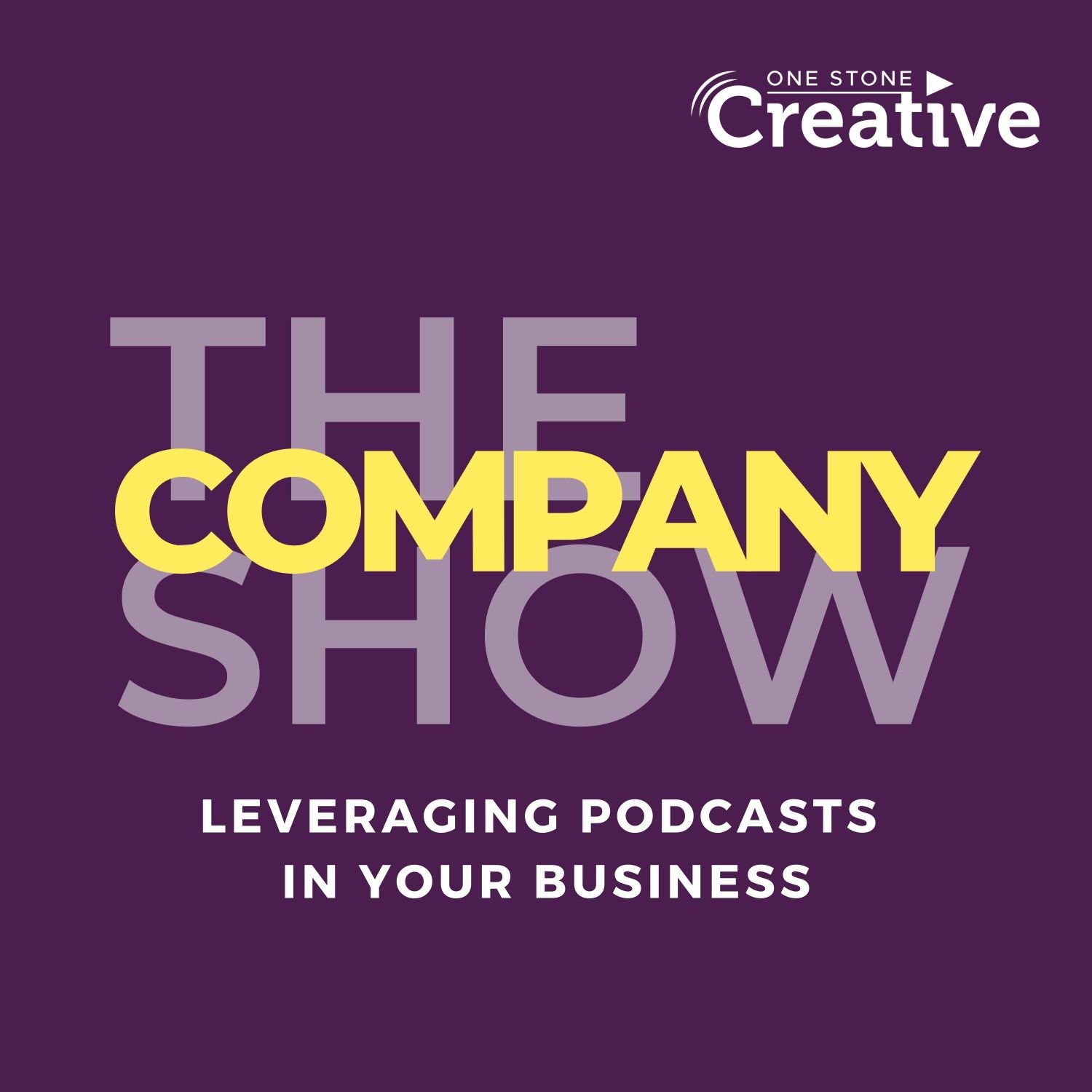
Education
Business
Megan Dougherty
The Company Show is a podcast about running a podcast for your business or company. Podcasting FOR your business or company is different than podcasting as a passion project, or even with your podcast AS a business. You need to meet real organizational goals with a minimum of time and energy, because the podcast is just one part of all that you do. Whether you’re a solopreneur who is running a whole business, or the marketing manager overseeing multiple cross-channel campaigns company podcasts have specific requirements, restrictions and opportunities that hobby, passion and solo-project podcasts just don’t have.
But if you can work out a good system, you can shorten sales cycles, pre-warm leads, meet new partners, increase your brand awareness and authority, and generate weekly (or more!) fresh, dynamic content, all in the course of producing your show. This podcast will help you do that, with answers to every question you’ve got about podcasting, and interviews with different subject matter experts in the content marketing and multi-media industries.
Megan Dougherty is a digital marketer with over a decade of experience consulting and supporting business owners, who co-founded One Stone Creative in 2017 as a podcast production agency for business owners. One Stone Creative helps plan, produce and promote podcast episodes with a high-touch, consultative approach. Every business is different, and so is every business podcast. Over 5 years, and thousands of podcast episodes, we’ve identified the “blueprints” that make a company podcast successful, and are thrilled to be sharing that information with you.
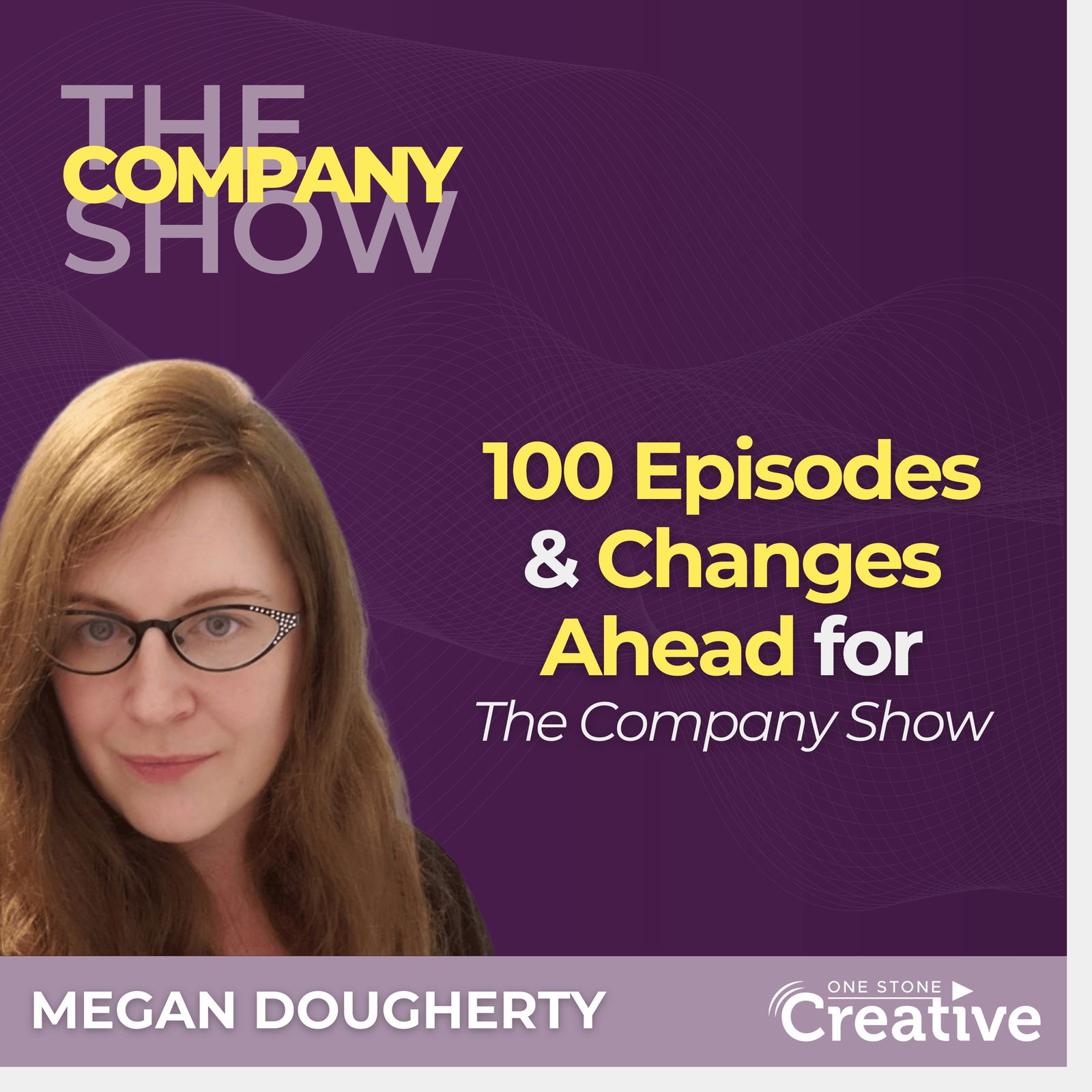
100 Episodes and Changes Ahead for The Company Show
Welcome friends, to episode 100 of The Company Show.Well, technically we started as the Business Podcast Blueprints show — but it’s one RSS Feed, so it counts.100 episodes is a pretty major accomplishment, and as we’ve approached this milestone, I’ve been reflecting on all of the different ways having a podcast has changed our business.So what has having a podcast really done for One Stone Creative?Looking BackWe started the show right around the time we developed the Business Podcast Blueprints — hence the original name, and to be completely honest, we did it because I ran out of excuses for why a podcast production agency didn’t have a show of their own.I was apprehensive, despite having solid strategy and a truly impeccable team behind me.I’m a behind-the-scenes person. I thrive outside of the spotlight, and being a podcast host was never one of my life’s ambitions.But as I tell people all time time, podcasting is awesome for introverts. Just how awesome is something I knew in theory before starting this show, but now, I know in practice.The Company Show has been a vehicle for so much.I’ve met amazing friends and had opportunities I couldn’t have imagined otherwise, and I’m very sure that without it, the Podcasting for Business Conference wouldn’t have existed. The first year’s lineup was composed almost entirely of podcast guests.It was also our testing ground — we’ve released different seasons in different formats to learn about what works, and so we could communicate with our clients more effectively about the reality of doing seasons, weekly, and bi-weekly releases.And now that we’re at episode 100, it’s time for another change.Several, actually.The ChangesWe’re taking a hiatus from new episodes for a few months, to re-imagine the show, and decide how, and if we want it to continue, or if it has served its function and lived out its useful existence.Not every podcast is meant to last forever, and there’s something else going on that is going to make an impact on our decision about The Company Show.We’re starting something new — a new podcast with a brand spanking new RSS feed, which we’re going to be releasing early in the new year.It’s going to be called the Business Podcast Spotlight and will be a short weekly (or more!) show looking at the different ways different businesses are using podcasts as a channel for marketing and business development.These will be short, focused episodes examining strategy, audience, and outcomes for both existing and soon-to-be-released shows — and always with a focus on what can be improved even more.If you’re doing something interesting with a podcast or plan to in the future, I want to talk to you. Head over to PodcastingforBusiness.com/Spotlightapp and tell me about your show.Final ThoughtsI’m excited about this new project and what it might inspire for The Company Show!And I’m also grateful to the wonderful guests I’ve had here over the years. To my incredible team who has made every episode look and sound incredible and to you, listener, who has been the reason for it all. Thank you.As always, I’ve been your host, Megan Dougherty, and this show was produced by the Team at One Stone Creative.Wherever we see you next — here on The Company Show, in The Business Podcast Spotlight, or somewhere else, I look forward to it!Until then.Podcasting for Business - The BookIn case you haven’t gotten it yet, my book Podcasting for Business: How to Create a Show That Makes a Bottom Line Difference for Your Company, is available now!If you think your podcast should be a little bit more profitable (or a lot more profitable), I highly recommend that you check it out.There’s going to be some great information there for you.ResourcesOne Stone Creative | LinkedIn | Twitter | Facebook | InstagramOrder the book, Podcasting for BusinessLearn about what other business podcasters are doing:State of Business Podcasting Report 2024
04:1214/11/2024
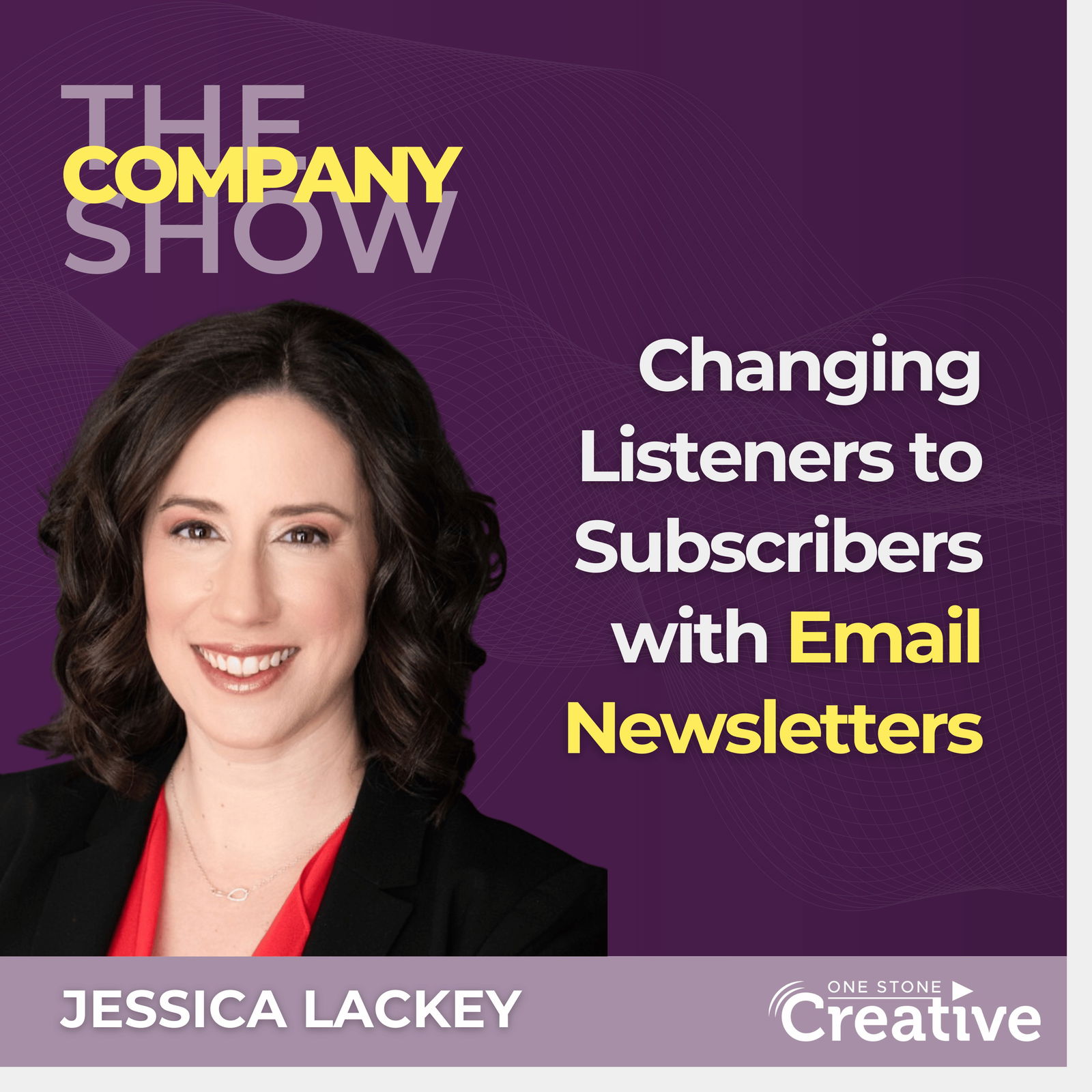
Changing Listeners to Subscribers with Email Newsletters with Jessica Lackey
You know what podcasts suck at? Conversions.You know what's amazing for conversions? Email.You know how to turn podcast listeners into people that you can email? A newsletter.A part of podcasting for your business is getting your listeners into a platform where they can click a link to take some action. Sometimes that means doing video. Sometimes it means an active social media presence, and sometimes it means building out your email list, and that's what we're talking about today.Jessica Lackey is a strategy and operations advisor who blends business strategy, practical application, and a human-centric approach to creating sustainable business practices. She's joining me today to talk about whether or not your show needs a newsletter, what kind of content should go onto it, how to differentiate it from your podcast content, and how to see if it's all working.Listen to the episode or read the blog post here: https://podcastingforbusiness.com/99Tune in to the full episode to learn about:Integrating Thought Leadership in Newsletters for Podcast PromotionDetermining the Role of Newsletters in Your Podcast StrategyWhen Podcasts and Newsletters Aren't EssentialThe Right Way to Use Episodes in NewslettersHow to Drive Newsletter Subscribers to Your ShowPodcast Discovery Challenges and the Power of Cross-PromotionWhy Human Touch and Curated Content MatterThe Podcasting for Business Conference is happening next week — get your ticket here!Read the full notes/blog post here: https://podcastingforbusiness.com/99Final ThoughtsI love Jessica’s focus on the human connection you’re making with listeners.Having a newsletter is just another way to connect with and engage the actual people listening to your show and that is the foundation for everything else.Next week is a special one — it’s the Podcasting for Business Conference, and if you don’t have your ticket late in the immortal words of the doors, the time to hesitate is through. (If you can tell me what 90’s movie I’m referencing without googling it, I’ll give you a free ticket, email me at [email protected])Check out the lineup and the schedule at PFBCon.com and we’ll see you next week!Podcasting for Business - The BookIn case you haven’t gotten it yet, my book Podcasting for Business: How to Create a Show That Makes a Bottom Line Difference for Your Company, is available now!If you think your podcast should be a little bit more profitable (or a lot more profitable), I highly recommend that you check it out.There’s going to be some great information there for you.Be A Guest on The Company ShowDo you have a podcast that's making a major difference in your business or know one that is? Fill out this contact form and let us know about it.We'd love to have you here for an episode like this one!Need A Podcast?As always, this is Megan Dougherty, and The Company Show was made possible by the team at One Stone Creative.If you know a business owner that you think should have a podcast, do us a favor and send them to podcastingforbusiness.com!Key Quotes“If you are using your podcast to grow your authority as a business owner and you just link to the guest being awesome — you've missed out on a whole opportunity to demonstrate why you are the expert that curated them.” - Jessica LackeyResourcesOne Stone Creative | LinkedIn | Twitter | Facebook | InstagramOrder the book, Podcasting for BusinessLearn about what other business podcasters are doing:State of Business Podcasting Report 2024Jessice Lackey | Website | LinkedIn | Twitter | YouTubeRelated:Maximizing the Value of Your Podcast Archive with Racheal Cook
26:2307/11/2024
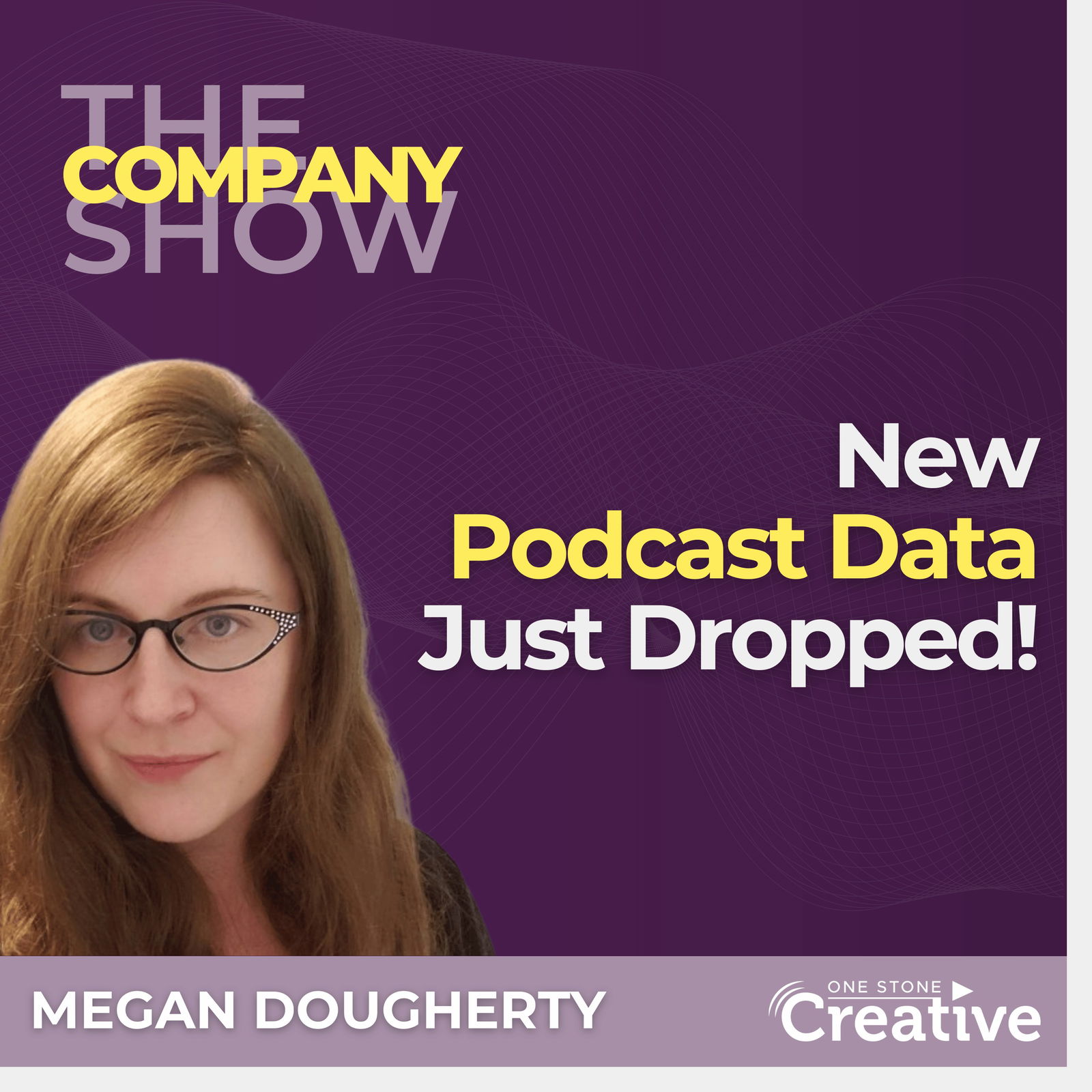
New Podcast Data Just Dropped!
It’s my favorite time of year.I don’t mean Halloween, although I dearly love giving candy to small children dressed as cartoon characters — it’s time to share the results of the latest, and dare I say greatest Podcasting for Business Report.This report, which we’ve been releasing since 2020 is a deep dive analysis into the top 100 business podcasts, where we evaluate each of the top 100 shows on over 60 different criteria to look at industry trends and establish baseline best practices for podcasting as a business owner.Today is all about that sweet, sweet data. It’s been an interesting year for business podcasting! We’ve seen big changes this year, in social media usage, sponsorships, and network participation — there are some great takeaways for you to apply to your own show.And the numbers are just nifty.I’ve pulled some of the most interesting takeaways to share with you here today.I strongly recommend that, if you haven’t already done so, you download a copy of the report here to get the whole story!Listen to the episode or read the highlights here: https://podcastingforbusiness.com/98The Podcasting for Business Conference is happening this November — learn more about it here!Final ThoughtsI hope I’ve sufficiently whetted your appetite for more data! We look at how shows start and end, how they’re edited, how often podcast content is shared on social media, how common guests vs solo episodes are… I’m really just getting started.There are dozens of interesting data points for you to look at and consider as you make strategic decisions for your podcast — and we’ve got a companion video that shares the year-over-year comparison and our recommendations based on the trends. You can get the whole report and watch the companion video that gives a more detailed analysis and a year-over-year comparison here.If you have a community that would be interested in this type of data, reach out to me at [email protected] to talk about getting a guest post or interview for your folks I’m always happy to talk about the data!The Podcasting for Business Conference 2024You’ll also want to make sure you’re registered for this year’s Podcasting for Business Conference. It’s happening in about two weeks and We’ve got networking events, we’ve got expert presentations, we’ve got live Q and A with industry leaders — I’ll go so far as to say we’ve got everything you need to take your podcast to the next level in terms of profitability. Grab your ticket here.That’s all for this week! As always, I’ve been your host, Megan Dougherty, and the Company Show was produced by the whole team at One Stone Creative. If you found some value here today, the best way you can support the show is to share it with someone you think could use a whole lot of data about podcasting for business!Podcasting for Business - The BookIn case you haven’t gotten it yet, my book Podcasting for Business: How to Create a Show That Makes a Bottom Line Difference for Your Company, is available now!If you think your podcast should be a little bit more profitable (or a lot more profitable), I highly recommend that you check it out.There’s going to be some great information there for you.Be A Guest on The Company ShowDo you have a podcast that's making a major difference in your business or know one that is? Fill out this contact form and let us know about it. We'd love to have you here for an episode like this one!Need A Podcast?As always, this is Megan Dougherty, and The Company Show was made possible by the team at One Stone Creative.If you know a business owner that you think should have a podcast, do us a favor and send them to podcastingforbusiness.com!ResourcesOne Stone Creative | LinkedIn | Twitter | Facebook | InstagramOrder the book, Podcasting for BusinessLearn about what other business podcasters are doing:State of Business Podcasting Report 2024
08:1131/10/2024
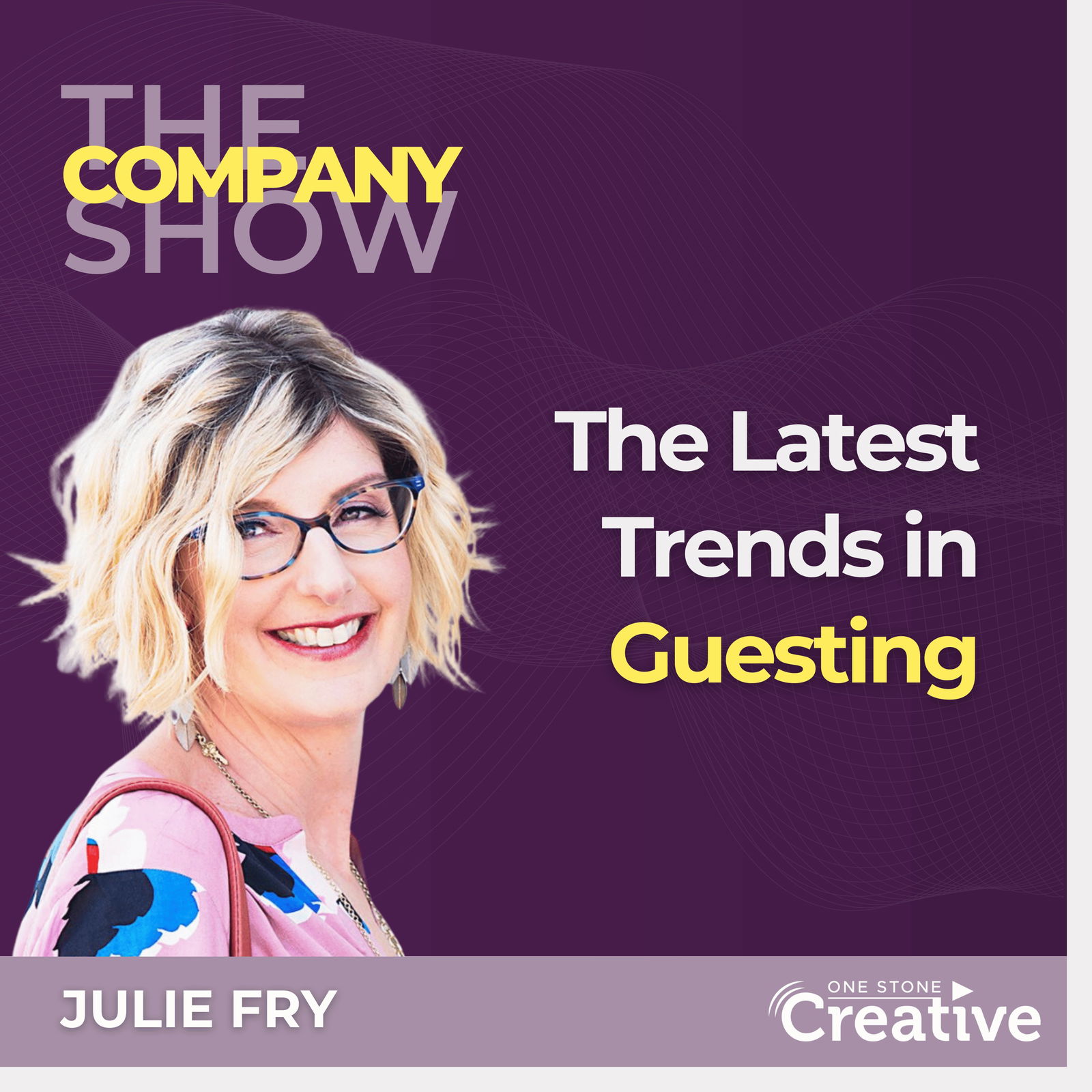
The Latest Trends in Guesting with Julie Fry
Let's talk about guest appearance pitches.You've received them and hopefully you've also sent them. There's a lot that goes into a guesting strategy research, crafting the pitch, being on the show itself, and encouraging the listeners of that show to connect with you.All of these things are changing all of the time.There are trends in guesting the same way there are trends in all other types of marketing. You need the best information to craft the best strategy for your business.My guest today is an expert in guest pitching — Julie Fry is the founder of Your Expert Guest, a podcast booking agency for women making an impact who want to be heard by their ideal clients without spending hours on social media, which is something I absolutely understand.Julie has tons of great information for us, and I was especially fascinated to hear what is the most effective strategy in converting listeners to real connections these days. It is not the same as it used to be.Listen to the episode or read the blog post here: https://podcastingforbusiness.com/97Tune in to the full episode to learn about:How to Find the Right Shows to Guest OnPodcast Searching ToolsHow to Go Through The Podcast Outreach ProcessShould You Send Your Interview Questions in Advance?Simplifying Calls to ActionThe Post-Guesting ExperienceTracking Your Guesting CampaignRepurposing The Shows You Guested OnThe Podcasting for Business Conference is happening this November — learn more about it here!Read the blog post here: https://podcastingforbusiness.com/97The State of Business Podcasting Report 2024Next week is a really exciting week at One Stone Creative. We're going to be releasing the fifth annual State of Business Podcasting Report, and I can tell you now there have been some interesting changes in the trends and best practices for company podcasts this year.I cannot wait to share them with you!Get all of the details and sign up here to receive it as soon as it drops, Monday the 28th.Next week, I'm going to be sharing some selected results here on the show, so make sure you're subscribed to The Company Show on your favorite podcast platform.Podcasting for Business - The BookIn case you haven’t gotten it yet, my book Podcasting for Business: How to Create a Show That Makes a Bottom Line Difference for Your Company, is available now!If you think your podcast should be a little bit more profitable (or a lot more profitable), I highly recommend that you check it out.There’s going to be some great information there for you.Podcasting for Business Conference 2024We've got over a dozen expert presentations, expert Q&A, panel discussions, workshops, and lots and lots of networking opportunities.It's happening from November 13th to 15th this year. Learn more about PFBCon here.Be A Guest on The Company ShowDo you have a podcast that's making a major difference in your business or know one that is? Fill out this contact form and let us know about it.We'd love to have you here for an episode like this one!Need A Podcast?As always, this is Megan Dougherty, and The Company Show was made possible by the team at One Stone Creative.If you know a business owner that you think should have a podcast, do us a favor and send them to podcastingforbusiness.com!Key Quotes“A confused mind doesn't make any choices. Just giving one choice, you increase the likelihood that the listener will act on that choice.” - Julie FryResourcesOne Stone Creative | LinkedIn | Twitter | Facebook | InstagramOrder the book, Podcasting for BusinessLearn about what other business podcasters are doing:State of Business Podcasting Report 2023Julie Fry | Website | LinkedIn | Facebook | InstagramRelated:The Ultimate Guest Pitching System with Kris WardHow to Pitch Yourself as a Guest
30:3424/10/2024
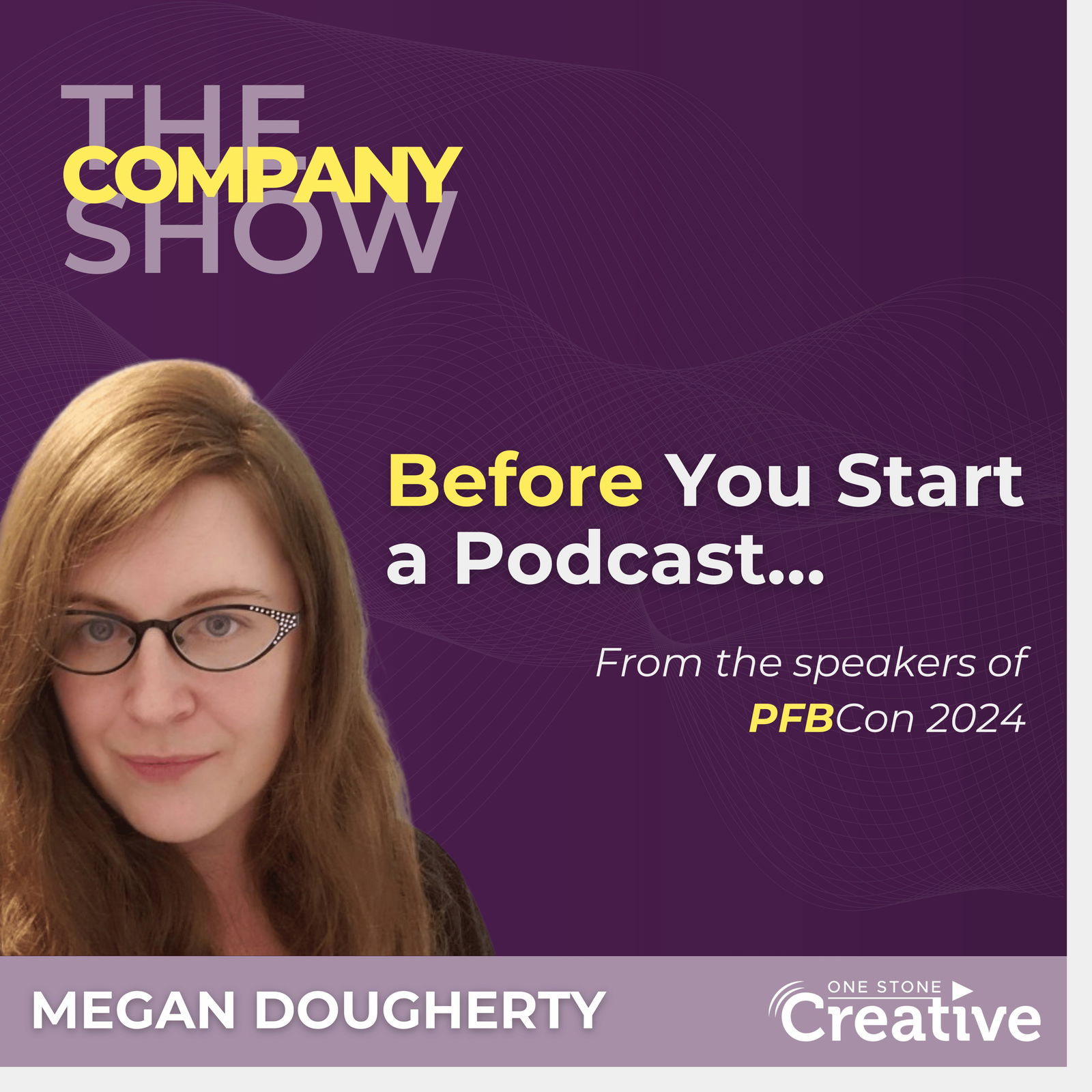
Before You Start a Podcast…
As you know, the Podcasting for Business Conference is fast approaching.We're preparing the networking events and the presentations and the emails and the broom and all of the goodies and our many expert speakers are working on their presentations. And are there ever some good ones this year? It's going to be awesome.As part of our prep for the conference every year, we ask all of the speakers a few different questions so that we've got detailed and dare I say, definitive resources on key podcasting topics for you. This year, one of the questions we asked the experts was…What should a business owner think about before they start a podcast?See, a lot of the people who come to the Podcasting for Business Conference are coming because they haven't actually started their show yet, and they want to learn everything that they need to make sure that they make great investment and get a really good return on their podcast.Even if you already have a podcast, if you've been podcasting for years, you should listen anyway because getting back into that beginner's mindset of what you should think about and plan and consider before you start can help you make refinements to your show as it exists now.Here is what the experts think you should keep in mind before you start a podcast — listen to the episode or read the blog post here: https://podcastingforbusiness.com/96The Podcasting for Business Conference is happening this November — learn more about it here!Watch the video version here: https://youtu.be/M0qCNQXIRd8Final ThoughtsThat is a whole lot of good advice.If you're in the planning stages or in the I've started, but I need to make changes stage, then you know what to do. Pick some advice, look at your show, review it, and start making changes.Of course, track everything that you do so you can validate what works and what doesn't.If you don't have your ticket to the Podcasting for Business Conference yet, you can get it here and you are not going to want to miss this one.As always, it's all virtual and all recorded, and the recordings are included in your ticket price. You're going to have access for an entire year, so don't stress out if you can't attend absolutely everything. We know you can't. You've got a job!Podcasting for Business - The BookIn case you haven’t gotten it yet, my book Podcasting for Business: How to Create a Show That Makes a Bottom Line Difference for Your Company, is available now!If you think your podcast should be a little bit more profitable (or a lot more profitable), I highly recommend that you check it out.There’s going to be some great information there for you.Podcasting for Business Conference 2024We've got over a dozen expert presentations, expert Q&A, panel discussions, workshops, and lots and lots of networking opportunities.It's happening from November 13th to 15th this year. Learn more about PFBCon here.Be A Guest on The Company ShowDo you have a podcast that's making a major difference in your business or know one that is? Fill out this contact form and let us know about it.We'd love to have you here for an episode like this one!Need A Podcast?As always, this is Megan Dougherty, and The Company Show was made possible by the team at One Stone Creative.If you know a business owner that you think should have a podcast, do us a favor and send them to podcastingforbusiness.com!Key Quotes“Why am I doing this?” - Ana Xavier“What does success mean to you?” - Mary ChanResourcesOne Stone Creative | LinkedIn | Twitter | Facebook | InstagramOrder the book, Podcasting for BusinessLearn about what other business podcasters are doing:State of Business Podcasting Report 2023Learn more about the speakers of PFBCon 2024 here.Related:How to Measure the Impact of Your Podcast
20:3817/10/2024
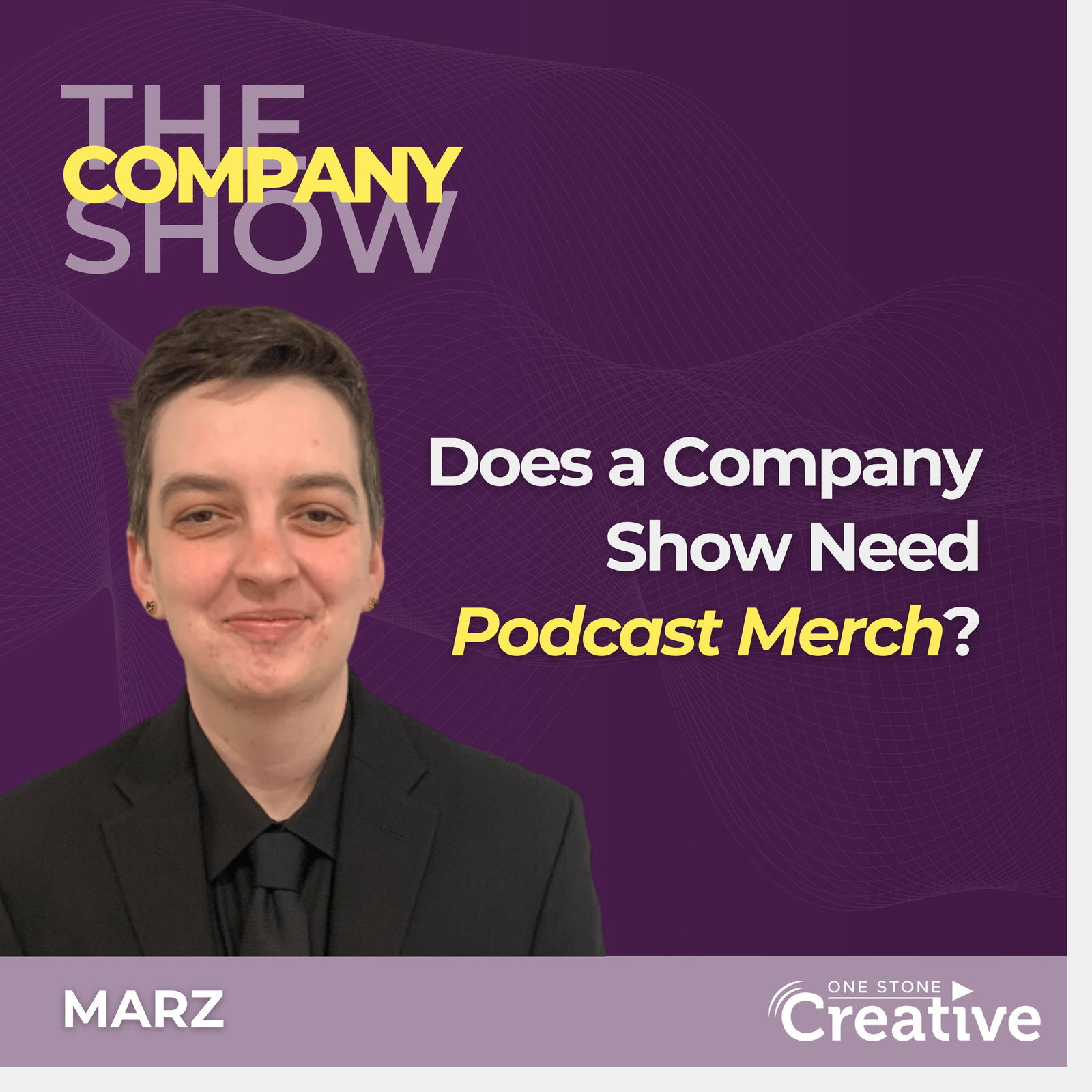
Does a Company Show Need Podcast Merch? with Marz
When you think of merch, what might come to mind first are band t-shirts, sports memorabilia, or maybe stickers of your favorite anime characters.But there is a whole world of podcast merch too — some of which might be of real interest to someone podcasting for their business.Today I’m talking to Marz, the CEO of Certified Crucial, a podcast merchandise and distribution company that is doing some very interesting things in the industry. There are a lot more possibilities than there used to be, many of them more interesting and more sustainable than traditional Print on Demand servicesThis was an interesting conversation, and of course, Marz brought the data!Listen to the episode below or read the blog post here: https://podcastingforbusiness.com/95Tune in to the full episode to learn about:How Certified Crucial is uplifting the creator economyWhat podcast merch really meansThe untapped potential of podcasts on vinylCan smaller shows leverage merchandise?Crafting merch that resonates with your audienceMerch as a tool for guest engagement and brand integrityROI and pricing for sustainable and ethical merch in podcastingThe Podcasting for Business Conference is happening this November — learn more about it here!Read the full post here: https://podcastingforbusiness.com/95Final ThoughtsI love the possibilities of merchandise for extending the community building around your podcast. It won’t be a fit for every company podcast, but there are some very cool use cases for engaging your audience, gifting your guests and increasing your brand awareness.Checkout certifiedcrucial.com to see what kind of possibilities might be a good match for your business.Mars is also going to be joining us at the Podcasting for Business Conference for a Coffee and Q&A session on the morning of Thursday, November 14th. If you’ve got merch-related questions, this will be a session to catch!Get your ticket at PFBCon.com, and prepare to spend three days learning from industry leading experts, networking with fellow podcasters and getting the tools and strategies you need to podcast more effectively (which means profitably!) for your business.You’ll also get access to the On-Demand content library right away — and we’re adding to it every couple of weeks between now and the conference. I hope we see you there!Podcasting for Business - The BookIn case you haven’t gotten it yet, my book Podcasting for Business: How to Create a Show That Makes a Bottom Line Difference for Your Company, is available now!If you think your podcast should be a little bit more profitable (or a lot more profitable), I highly recommend that you check it out.There’s going to be some great information there for you.Be A Guest on The Company ShowDo you have a podcast that's making a major difference in your business or know one that is? Fill out this contact form and let us know about it.We'd love to have you here for an episode like this one!Need A Podcast?As always, this is Megan Dougherty, and The Company Show was made possible by the team at One Stone Creative.If you know a business owner that you think should have a podcast, do us a favor and send them to podcastingforbusiness.com!Key Quotes“Yes, we want to engage our listeners. Yes, we want to give them something, and we also want to make sure that we uphold our integrity and our image as a brand as well.” - MarzResourcesOne Stone Creative | LinkedIn | Twitter | Facebook | InstagramPre-order the book, Podcasting for BusinessPre-ordering will get you a free ticket to PFBCon 2024Learn about what other business podcasters are doing:State of Business Podcasting Report 2023Marz | Website | LinkedIn | Facebook | InstagramCrucial Creators ProgramRelated:Getting Sponsors for Podcasts and Events with Alex DurantShould You Get a Sponsor for Your Company Podcast?
29:4910/10/2024
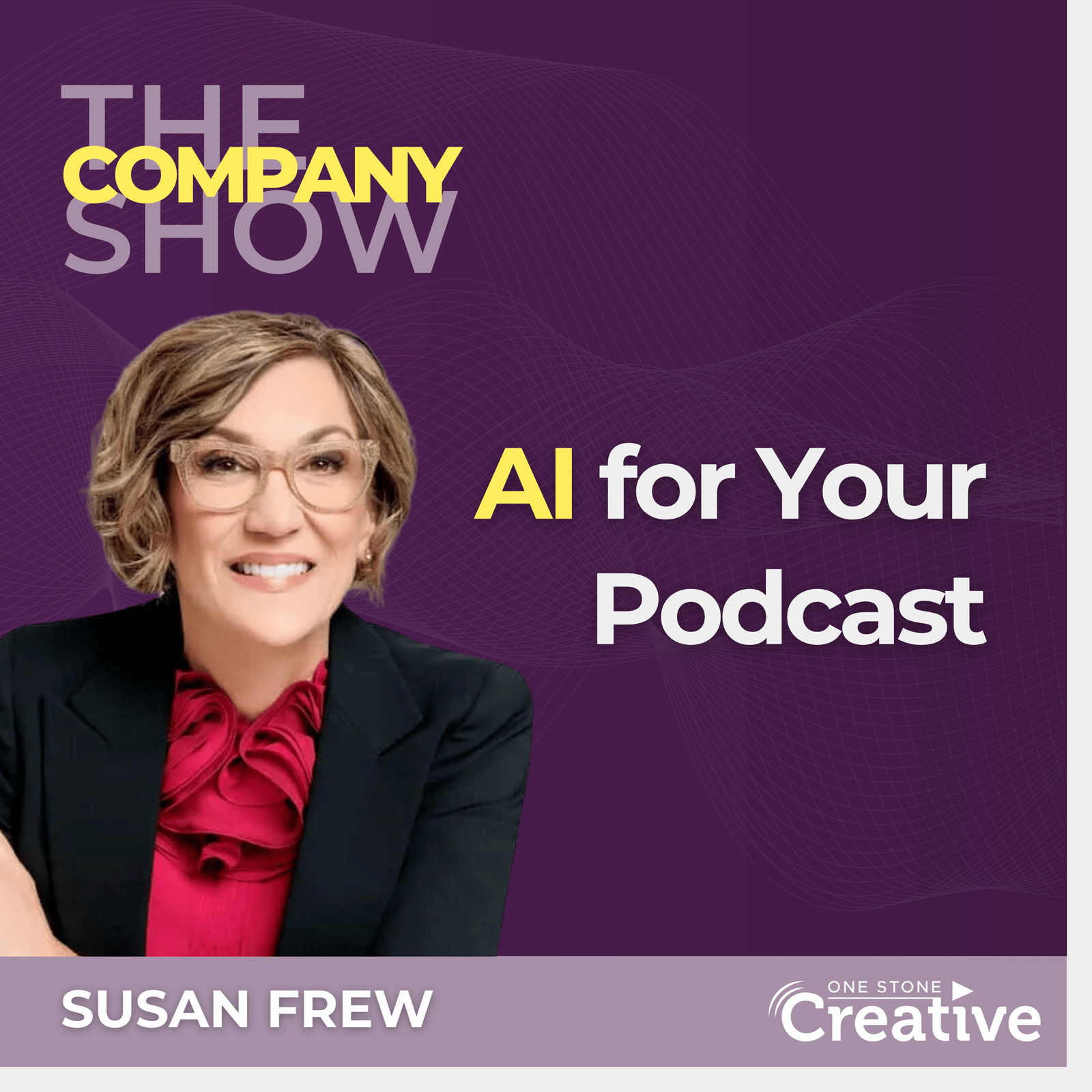
AI for Your Podcast with Susan Frew
AI is becoming a reality for many businesses, and podcasting is no different.There are a plethora of different ways that a company can use AI to alter the way they produce their show — some good and some bad. Some trying to be good, and others… not.I have mixed feelings about AI - we’ve had mixed results using it at One Stone Creative, and mixed more on the negative than the positive. We do most of our work by digital hand and only use AI in a few small ways for certain episodes.What works for our company doesn’t work for every company, however, AI might be a good help to you in a number of ways. Whether you want to include AI Tools and software in your processes or keep doing things the old-fashioned way, it’s important to know what’s available.I’m joined today by Susan Frew, who is, fairly, called your tour guide through the world of AI. She has made amazing strides using AI to improve the finances of her own business and has spent the last two years learning as much as she can about the different tools available to help business owners be more profitable using this new technology.We’re going to be talking about how she is using AI to support her own podcast, digging into why we’re not, when you shouldn’t let AI take the lead, and some general discussion about what the new industry means for the world, for privacy and for the future of podcasting.I found this really interesting, and I think you will too. Listen to the conversation or read the blog post here: https://podcastingforbusiness.com/94Tune in to the full episode to learn about:How Susan Frew Got Into AISusan’s AI-Powered Podcast ProductionSusan’s Podcasting for Business GoalsAI and Content CreationLetting AI Use Your VoiceWhat You Shouldn’t Use AI ForBalancing AI and Human WorkflowsAI, Intellectual Property, and PrivacyAI’s Evolution and Environmental ImpactThe Future of Podcasting and Human ConnectionMy book, Podcasting for Business is now available on Amazon — learn more about it here.Podcasting for Business - The BookIn case you haven’t gotten it yet, my book Podcasting for Business: How to Create a Show That Makes a Bottom Line Difference for Your Company, is available now!If you think your podcast should be a little bit more profitable (or a lot more profitable), I highly recommend that you check it out.There’s going to be some great information there for you.Podcasting for Business Conference 2024We've got over a dozen expert presentations, expert Q&A, panel discussions, workshops, and lots and lots of networking opportunities.It's happening from November 13th to 15th this year. Learn more about PFBCon here.Be A Guest on The Company ShowDo you have a podcast that's making a major difference in your business or know one that is? Fill out this contact form and let us know about it.We'd love to have you here for an episode like this one!Need A Podcast?As always, this is Megan Dougherty, and The Company Show was made possible by the team at One Stone Creative.If you know a business owner that you think should have a podcast, do us a favor and send them to podcastingforbusiness.com!Key Quotes“I think that people are going to continue to create these artificial shows. I think that the human race needs to put a stake in the ground and say no. Because I believe the antithesis or the polar opposite of the AI is human connection.” - Susan FrewResourcesOne Stone Creative | LinkedIn | Twitter | Facebook | InstagramPre-order the book, Podcasting for BusinessPre-ordering will get you a free ticket to PFBCon 2024Learn about what other business podcasters are doing:State of Business Podcasting Report 2023Susan Frew | Website | LinkedIn | Instagram | FacebookRelated:Will AI Replace Writers? with Karl SonaStories, Service & The Authentic You with Brigitte Bojkowszky
31:3103/10/2024
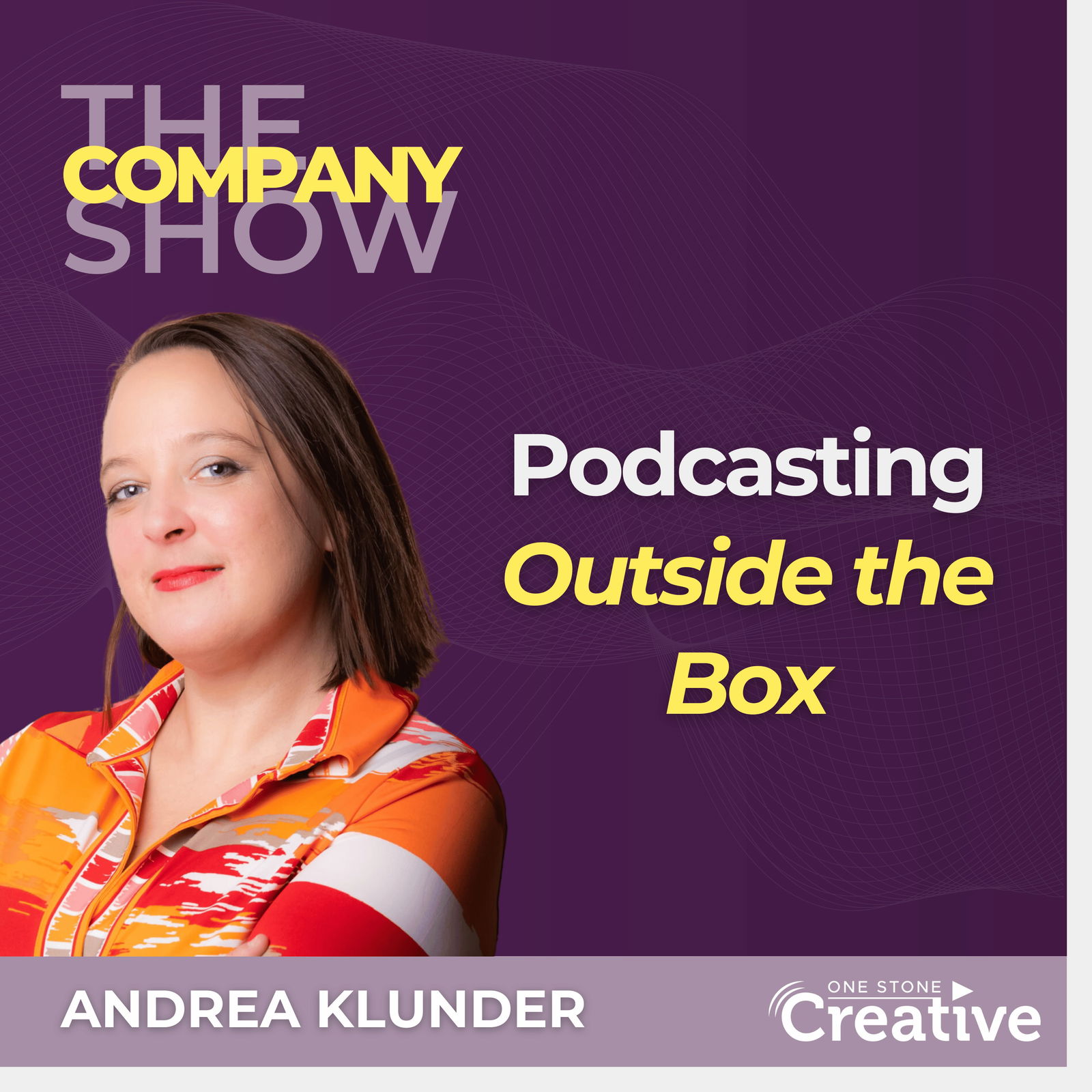
Podcasting Outside the Box with Andrea Klunder
At One Stone Creative and Podcasting for Business, we’re all about creating podcasts that work for… businesses! And we generally work with smaller businesses — teams of 20 or less who need a partner to take on the business area of a show.Being in this space gives us tons of flexibility about the kinds of shows we create and the kinds of results we generate with them - but there are other kinds of organizations with different structures who are doing really interesting things with Podcasting too.My guest today has some incredible examples of how non-profits, advocacy groups, and even governmental organizations are using podcasts to achieve their unique missions.Andrea Klunder is the founder and lead producer of The Creative Impostor Studios, a boutique agency producing award-winning audio documentary and podcast experiences for artists, organizations, and creative leaders who are making a cultural impact through meaningful storytelling.We’re going all in to talk about out-of-the-box podcasting — listen to our conversation or read the blog post here: https://podcastingforbusiness.com/93Tune in to the full episode to learn about:The Creative Impostor StudiosDifferent Paths to The Podcasting IndustryNon-Profit Versus For-Profit PodcastingBalancing Audio and Print for Maximum ImpactIntuition, Data, and CommunicationThe Priorities of Nonprofit PodcastingHow Podcast Starts for OrganizationsTurning Podcast Excitement into StrategyMy book, Podcasting for Business is now available on Amazon — learn more about it here.Podcasting for Business - The BookIn case you haven’t gotten it yet, my book Podcasting for Business: How to Create a Show That Makes a Bottom Line Difference for Your Company, is available now!If you think your podcast should be a little bit more profitable (or a lot more profitable), I highly recommend that you check it out.There’s going to be some great information there for you.Podcasting for Business Conference 2024We've got over a dozen expert presentations, expert Q&A, panel discussions, workshops, and lots and lots of networking opportunities.It's happening from November 13th to 15th this year. Learn more about PFBCon here.Be A Guest on The Company ShowDo you have a podcast that's making a major difference in your business or know one that is? Fill out this contact form and let us know about it.We'd love to have you here for an episode like this one!Need A Podcast?As always, this is Megan Dougherty, and The Company Show was made possible by the team at One Stone Creative.If you know a business owner that you think should have a podcast, do us a favor and send them to podcastingforbusiness.com!Key Quotes“Whatever the mission of that organization is... if you can help them fulfill that mission in a way, then you are doing your job.” - Andre Klunder“Podcasting is a tool specifically designed to accomplish a certain goal or solve a certain problem.” - Megan DoughertyResourcesOne Stone Creative | LinkedIn | Twitter | Facebook | InstagramPre-order the book, Podcasting for BusinessPre-ordering will get you a free ticket to PFBCon 2024Learn about what other business podcasters are doing:State of Business Podcasting Report 2023Andrea Klunder | Website | Podcast | LinkedIn | InstagramRelated:Does Your Podcast Format Match Your Podcast Goals?Achieving Business Goals with Podcast Managers with Ted Cragg
29:5126/09/2024
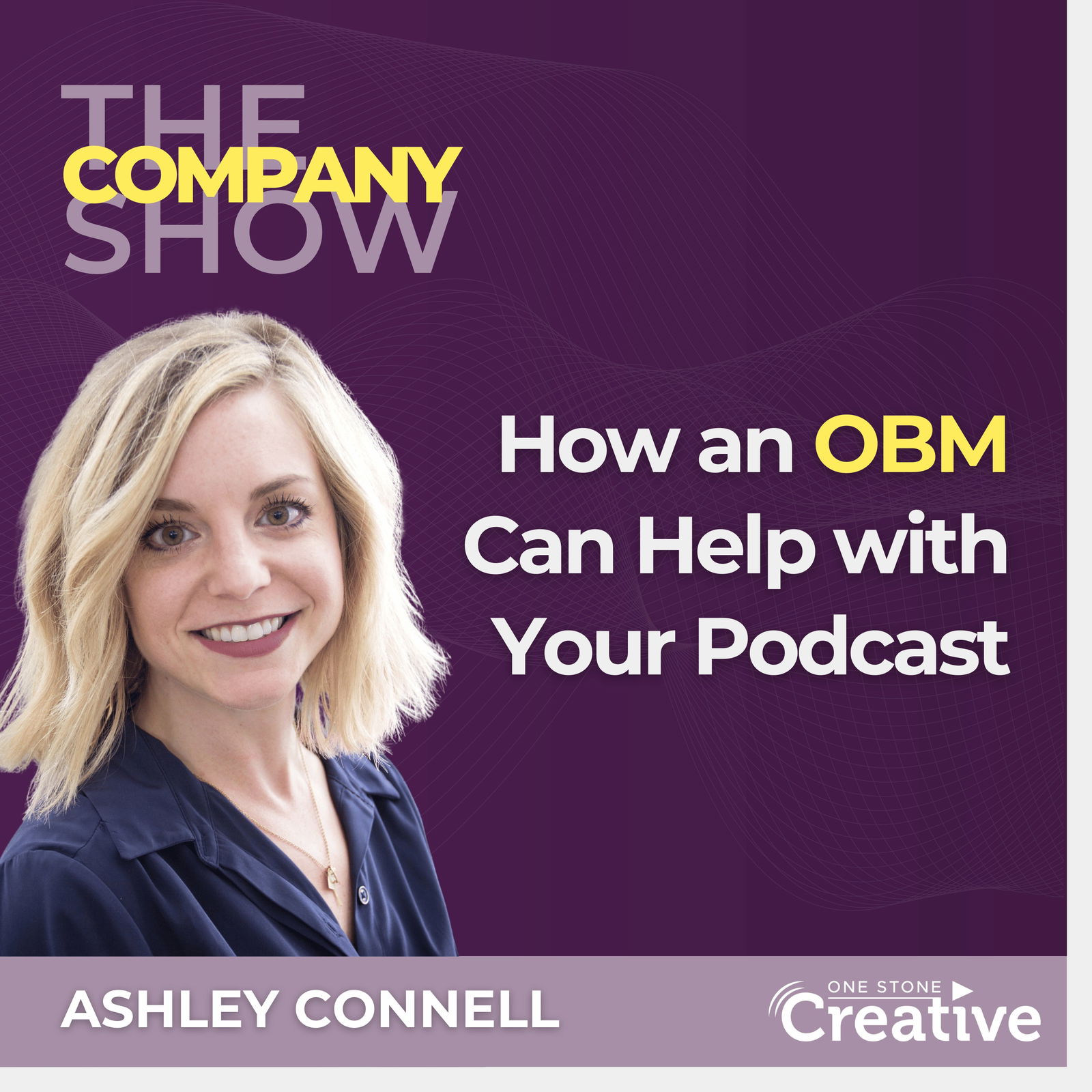
How an OBM Can Help with Your Podcast with Ashley Connell
There are a lot of different ways that you can get support with your podcast.You can hire or train a team member to do the editing admin and promotion, hire out specific areas like production or promotion, or work with a third-party service provider who can do any of the above.Sometimes even that, however, is too much on your plate, and in those cases, then an OBM, or Online Business Manager can help fill any gaps.Today I’m chatting with Ashley Connell, the founder of Prowess Project which is an Online Business Manager resource and training academy. She’s also the host of the Prowess Hour, a weekly livestream and podcast giving OBMs the skills and insights they need to grow their businesses.We’re talking about what an OBM is, how they can help ease the lift of a podcast in your company, and how to know if and when bringing on this kind of support is the right move to grow your business… and take over the podcast.Listen to the episode or read the blog post here: https://podcastingforbusiness.com/92Tune in to the full episode to learn about:What an online business manager isOBMs vs COOs vs VAsHow to hand off the reins to your OBMWhat OBMs can do for your business & operationsThe OBM Opportunity PodcastSigns that you need an online business managerAshley Connell’s awesome AI toolMy book, Podcasting for Business is now available on Amazon — learn more about it here.Connect with Ashley ConnellAshley: “Pop over to prowessproject.com.We are at @prowessproject on all of the socials and come drop us a line. Check us out. I would love to just hear what your own bottlenecks are, and I would love to hear, are you a spreadsheet brain or a spider web brain?”Megan: “So on social, tag me @oscpodcasting, tag Ashley @prowessproject, and let us know if you are a spreadsheet or a spiderweb brain.”Next Week on The Company ShowNext week, I’ve got another podcasting expert conversation to share with you and we’re going to be talking about something I’m pretty sure you’ve thought of at least once - Podcast Merch. It’s going to be a good one.Subscribe to the Company Show, so you don’t miss it!Podcasting for Business - The BookIn case you haven’t gotten it yet, my book Podcasting for Business: How to Create a Show That Makes a Bottom Line Difference for Your Company, is available now!If you think your podcast should be a little bit more profitable (or a lot more profitable), I highly recommend that you check it out.There’s going to be some great information there for you.Podcasting for Business Conference 2024We've got over a dozen expert presentations, expert Q&A, panel discussions, workshops, and lots and lots of networking opportunities.It's happening from November 13th to 15th this year. Learn more about PFBCon here.Be A Guest on The Company ShowDo you have a podcast that's making a major difference in your business or know one that is? Fill out this contact form and let us know about it.We'd love to have you here for an episode like this one!Need A Podcast?As always, this is Megan Dougherty, and The Company Show was made possible by the team at One Stone Creative.If you know a business owner that you think should have a podcast, do us a favor and send them to podcastingforbusiness.com!Key Quotes“You give a VA a task and they execute. You give an online business manager your vision and they strategize.” - Ashley ConnellResourcesOne Stone Creative | LinkedIn | Twitter | Facebook | InstagramPre-order the book, Podcasting for BusinessPre-ordering will get you a free ticket to PFBCon 2024Learn about what other business podcasters are doing:State of Business Podcasting Report 2023Ashely Connell | Website | LinkedIn | YouTubeFree ConsultationUnlock the AI AdvantageRelated:Working with VAs for Your Podcast with Kristy YoderAchieving Business Goals with Podcast Managers with Ted Cragg
28:3719/09/2024
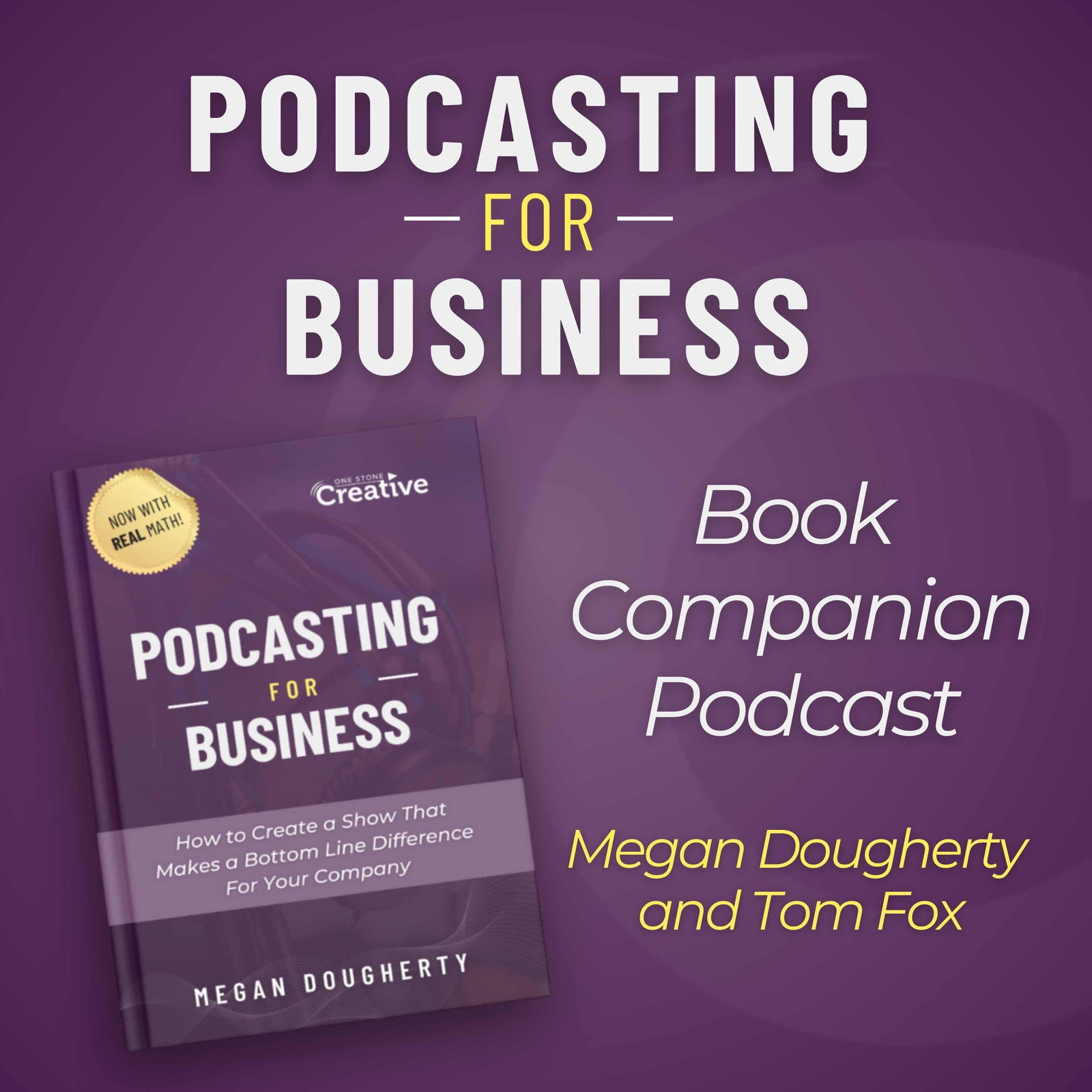
Feed Drop: The Essential Role of Podcasting in Business Growth - Podcasting for Business - The Book
Welcome to Podcasting for Business – The Book, where we dive into Megan Dougherty’s transformative book, Podcasting for Business – The Book. I’m your host, Tom Fox, and in this series, we will unpack the invaluable lessons and strategies from Megan’s book, which has quickly become the definitive guide for anyone looking to leverage podcasting as a powerful business tool. Whether you’re a seasoned podcaster or just considering how to get started, this podcast will walk you through Megan’s essential insights, from choosing the right podcast blueprint for your business to mastering the metrics that matter. Join me as we explore how to create, refine, and maximize the impact of your podcast, all through the lens of one of the most comprehensive resources available today.In this concluding episode, Tom Fox and Megan Dougherty discuss the upcoming release of Megan’s book Podcasting for Business and why podcasting is vital for most businesses. They highlight the benefits of building relationships, trust, and authority and creating evergreen content. Tom passionately argues that every business should have a podcast, citing its cost-effectiveness and ability to reach a vast audience. Megan provides a balanced view, suggesting that while podcasting offers long-term benefits, its timing should be considered based on the business’s current stage. The episode concludes with a focus on the fun and strategic aspects of podcasting and a reminder that the book is available now!Get your Copy of Podcasting for Business
16:1710/09/2024
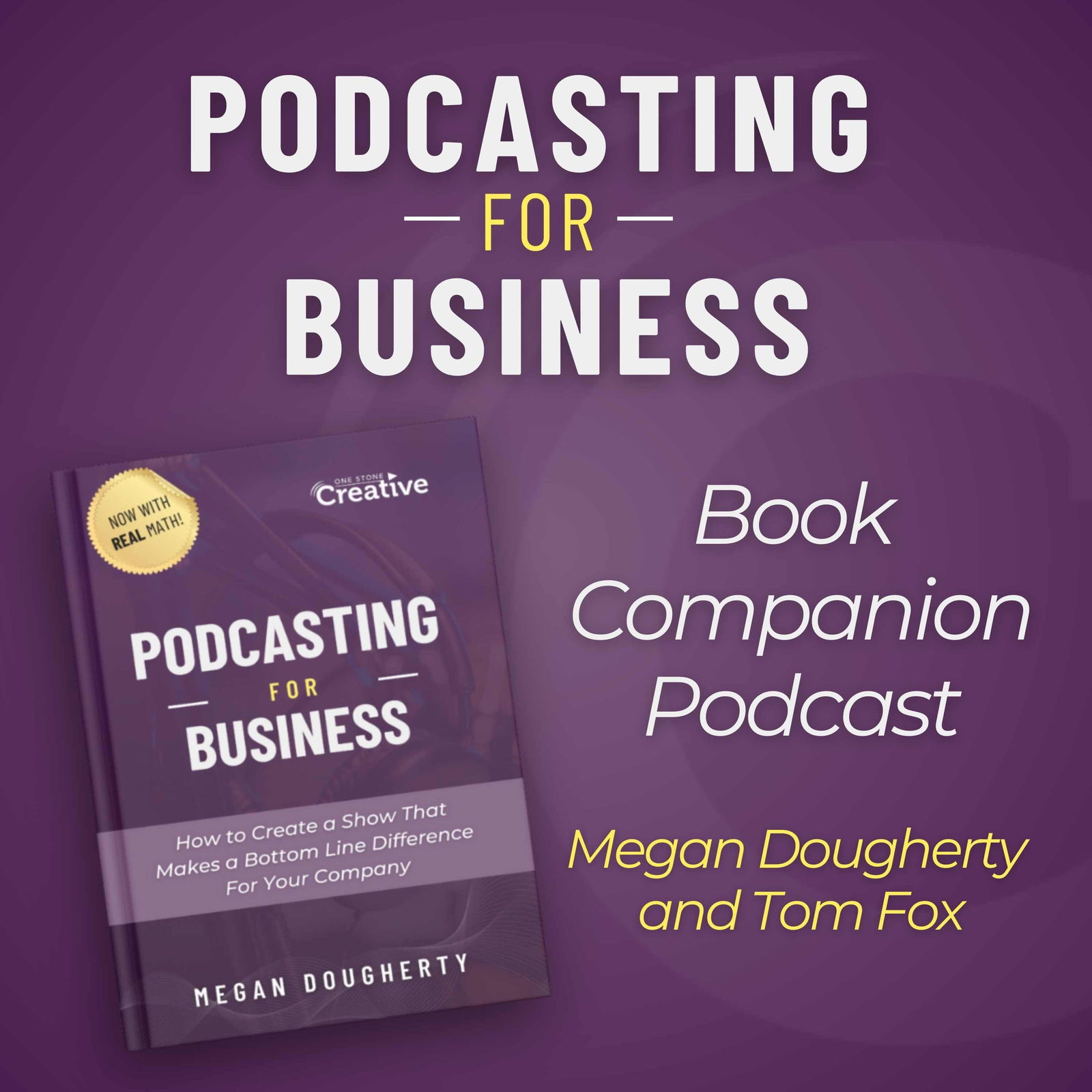
Feed Drop: Elevating Your Business Podcast - Podcasting for Business: The Book
Welcome to Podcasting for Business—The Book, where we dive into Megan Dougherty’s transformative book, Podcasting for Business – The Book. I’m your host, Tom Fox, and in this series, we will unpack the invaluable lessons and strategies from Megan’s book, which has quickly become the definitive guide for anyone looking to leverage podcasting as a powerful business tool. Whether you’re a seasoned podcaster or just considering how to get started, this podcast will walk you through Megan’s essential insights, from choosing the right podcast blueprint for your business to mastering the metrics that matter. Join me as we explore how to create, refine, and maximize the impact of your podcast, all through the lens of one of the most comprehensive resources available today.In this episode, Tom and Megan discuss strategic guest selection for various podcast formats, including thought leadership and relationship-building. They discuss the importance of consistent branding in visual and audio elements and highlight the necessity of thorough show notes and effective real estate utilization for audience engagement and SEO. Megan also hints at upcoming resources and workshops tied to their book, offering practical tools for optimizing podcast ROI.Get the Book!Check out the episode on the Compliance Podcast Network
15:2308/09/2024
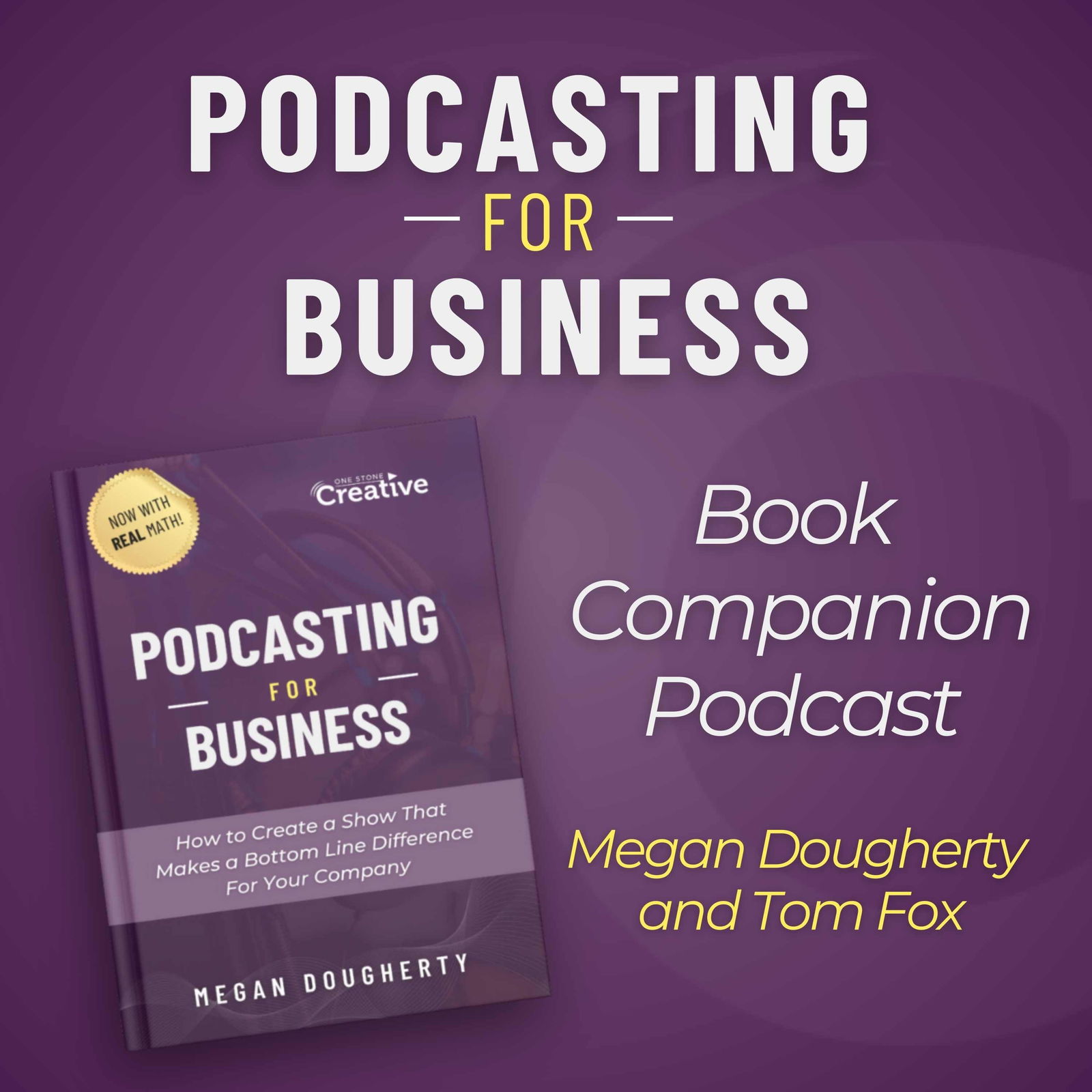
Feed Drop: Combining Blueprints and Metrics in Podcasting - Podcasting for Business: The Book
Welcome to Podcasting for Business – The Book, where we dive into Megan Dougherty’s transformative book, Podcasting for Business – The Book. I’m your host, Tom Fox, and in this series, we will unpack the invaluable lessons and strategies from Megan’s book, which has quickly become the definitive guide for anyone looking to leverage podcasting as a powerful business tool. Whether you’re a seasoned podcaster or just considering how to get started, this podcast will walk you through Megan’s essential insights, from choosing the right podcast blueprint for your business to mastering the metrics that matter. Join me as we explore how to create, refine, and maximize the impact of your podcast, all through the lens of one of the most comprehensive resources available today.In this episode, Tom and Megan discuss the integration of podcast blueprints with specific metrics to optimize business outcomes. They explore various blueprints and potential conflicts with metrics and provide practical examples. The episode also covers crucial elements for launching or relaunching a podcast, focusing on content, charisma, and connection. They also discuss the importance of consistent podcast cadence, choosing between audio and video formats, and maintaining high audio quality. Practical advice is given on setting up a recording environment to ensure the best sound quality for your podcast.Get the Book!Check out the episode on the Compliance Podcast Network
19:4007/09/2024
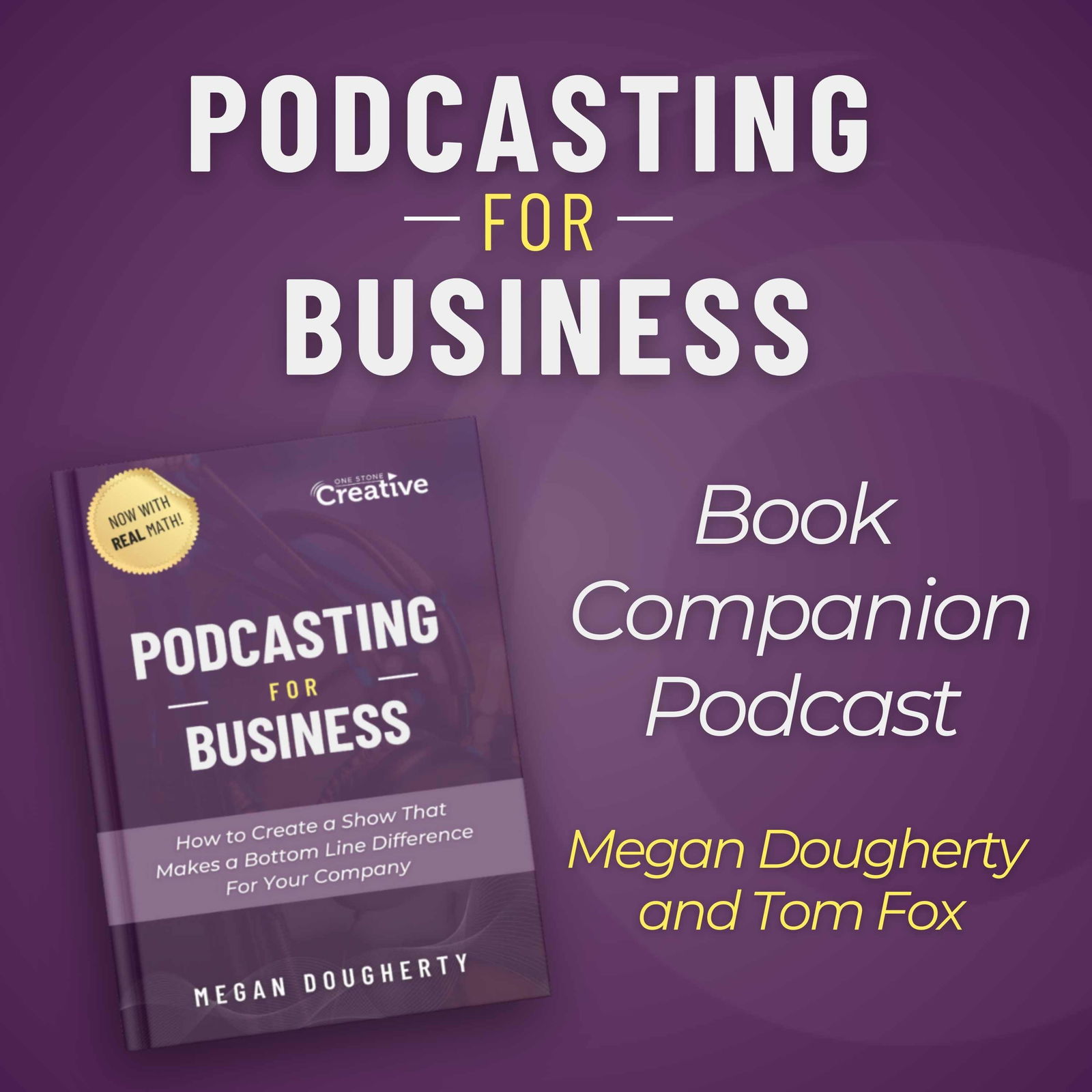
Feed Drop: Metrics that Matter Part 3 - Podcasting for Business - The Book
Welcome to Podcasting for Business – The Book, where we dive into Megan Dougherty’s transformative book, Podcasting for Business – The Book. I’m your host, Tom Fox, and in this series, we will unpack the invaluable lessons and strategies from Megan’s book, which has quickly become the definitive guide for anyone looking to leverage podcasting as a powerful business tool. Whether you’re a seasoned podcaster or just considering how to get started, this podcast will walk you through Megan’s essential insights, from choosing the right podcast blueprint for your business to mastering the metrics that matter. Join me as we explore how to create, refine, and maximize the impact of your podcast, all through the lens of one of the most comprehensive resources available today.In this episode, host Tom Fox and Megan Dougherty wrap up their series on podcast metrics. They discuss the depth and breadth of metrics covered in Megan’s book and explain how each metric can be optimized for a business podcast. The conversation covers monthly recurring revenue, labor cost savings, affiliate sales, sponsorship dollars, and downloads, providing examples and insights on how these metrics can be leveraged for business success. Megan also shares anecdotes and practical advice on using podcasts to achieve various business goals.Get the Book!Check it out on the Compliance Podcast Network
19:3106/09/2024
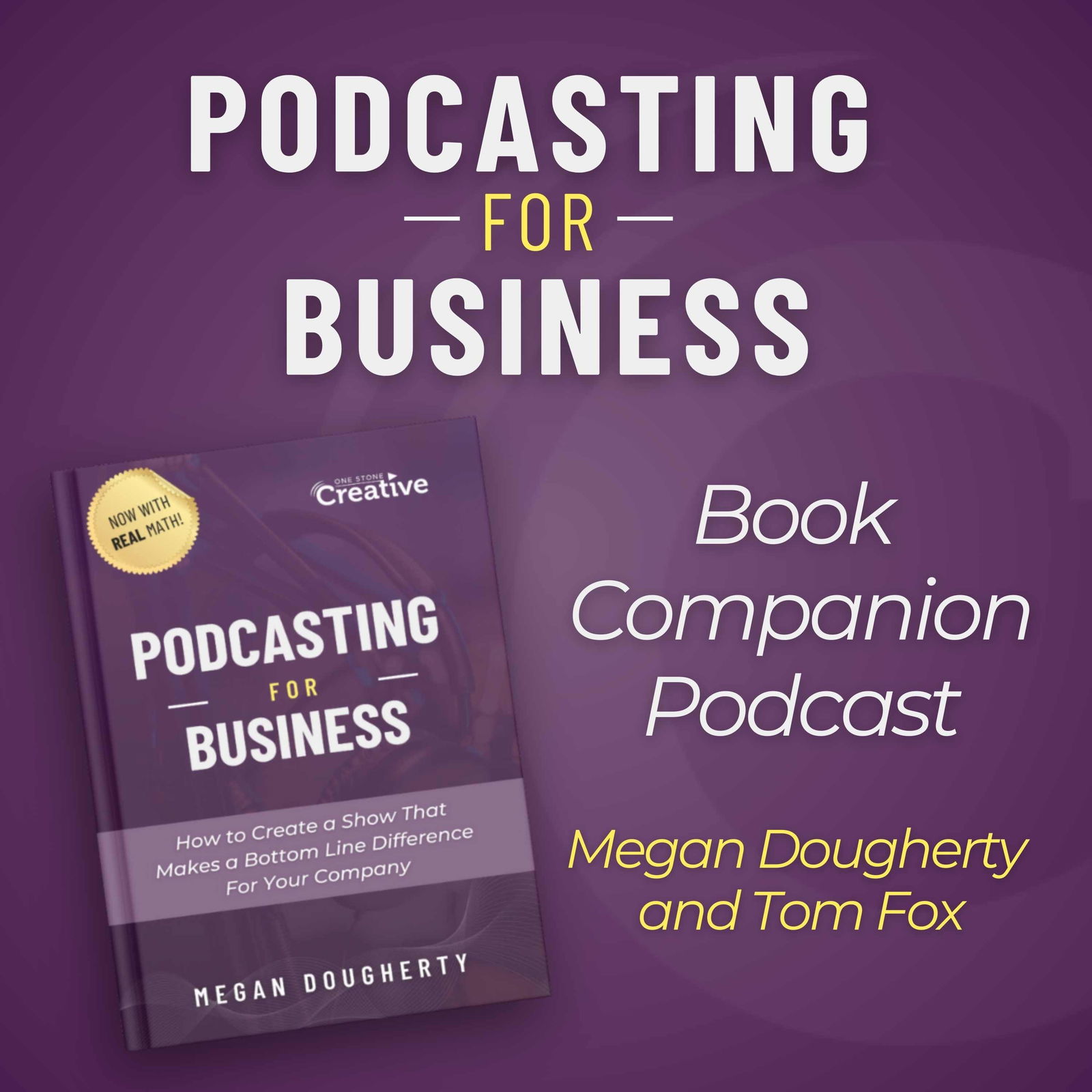
Feed Drop: Metrics that Matter Part 2 - Podcasting for Business: The Book
Welcome to Podcasting for Business – The Book, where we dive into Megan Dougherty’s transformative book, Podcasting for Business – The Book. I’m your host, Tom Fox, and in this series, we will unpack the invaluable lessons and strategies from Megan’s book, which has quickly become the definitive guide for anyone looking to leverage podcasting as a powerful business tool. Whether you’re a seasoned podcaster or just considering how to get started, this podcast will walk you through Megan’s essential insights, from choosing the right podcast blueprint for your business to mastering the metrics that matter. Join me as we explore how to create, refine, and maximize the impact of your podcast, all through the lens of one of the most comprehensive resources available today.In this episode, Tom and Megan continue reviewing crucial podcast metrics, focusing on brand awareness, social media engagement, list growth, sales qualified leads, and product sales. Megan discusses the challenges and strategies for optimizing each metric, offering practical examples and insights from her experience and research. The episode emphasizes the importance of creating thought leadership content and engaging directly with the audience to build brand recognition and drive business goals.Get the Book!Check it out on the Compliance Podcast Network
19:5505/09/2024
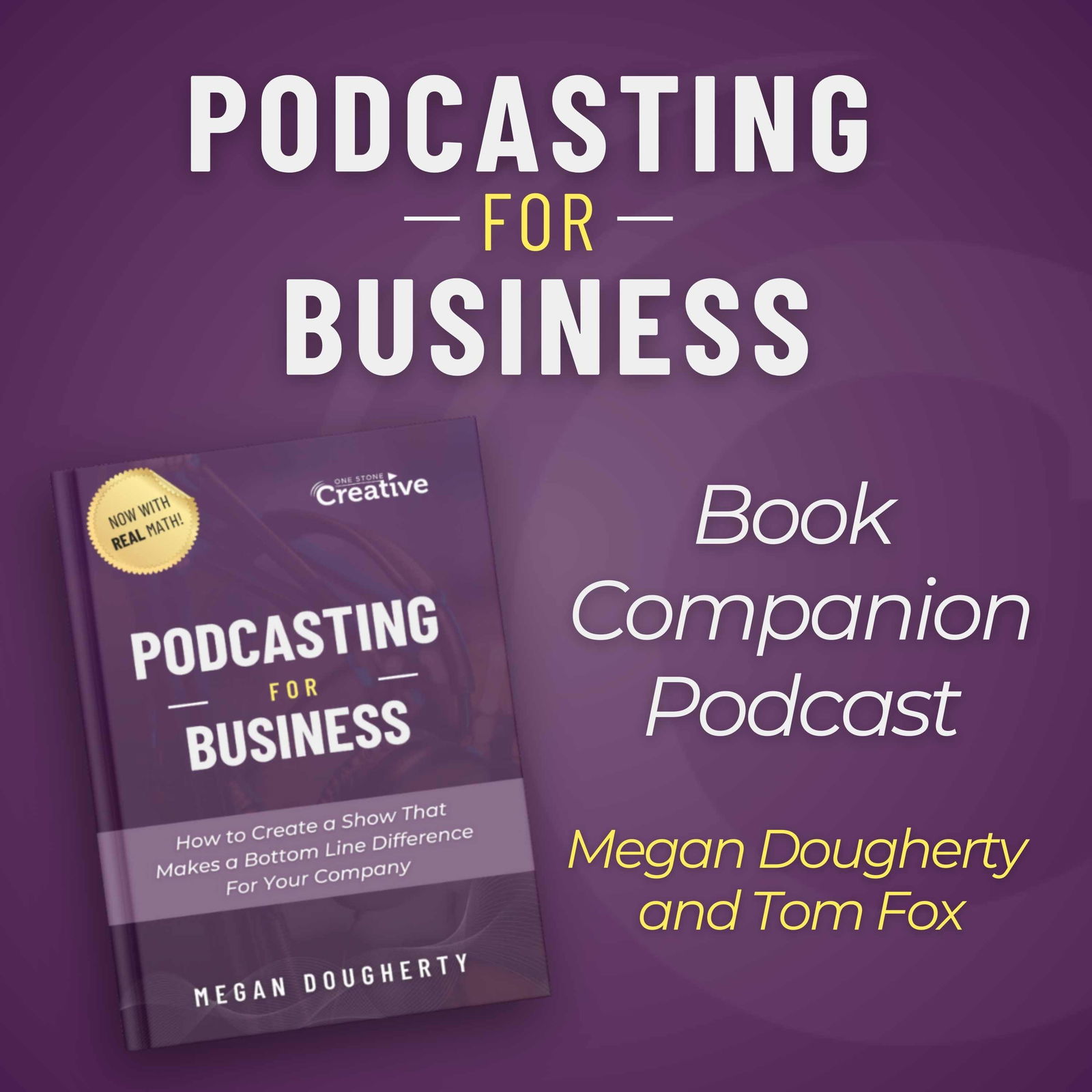
Feed Drop: Metrics That Matter Part 1 - Podcasting for Business: The Book
Welcome to Podcasting for Business – The Book, where we dive into Megan Dougherty’s transformative book, Podcasting for Business – The Book. I’m your host, Tom Fox, and in this series, we will unpack the invaluable lessons and strategies from Megan’s book, which has quickly become the definitive guide for anyone looking to leverage podcasting as a powerful business tool. Whether you’re a seasoned podcaster or just considering how to get started, this podcast will walk you through Megan’s essential insights, from choosing the right podcast blueprint for your business to mastering the metrics that matter. Join me as we explore how to create, refine, and maximize the impact of your podcast, all through the lens of one of the most comprehensive resources available today.In this episode, Tom Megan provides a three-episode review of the essential metrics that business podcasters should track. They start with referrals, explaining how relationship-building podcasts can generate valuable business leads. They move on to sales cycle length, demonstrating how podcasts can accelerate customer engagement. They also discuss promotional opportunities, SEO benefits, and new product creation. Megan emphasizes the importance of creating content that serves both SEO and business objectives, providing real-life examples and actionable insights.Get the Book!Check out this Episode on the Compliance Podcast Network
17:1604/09/2024
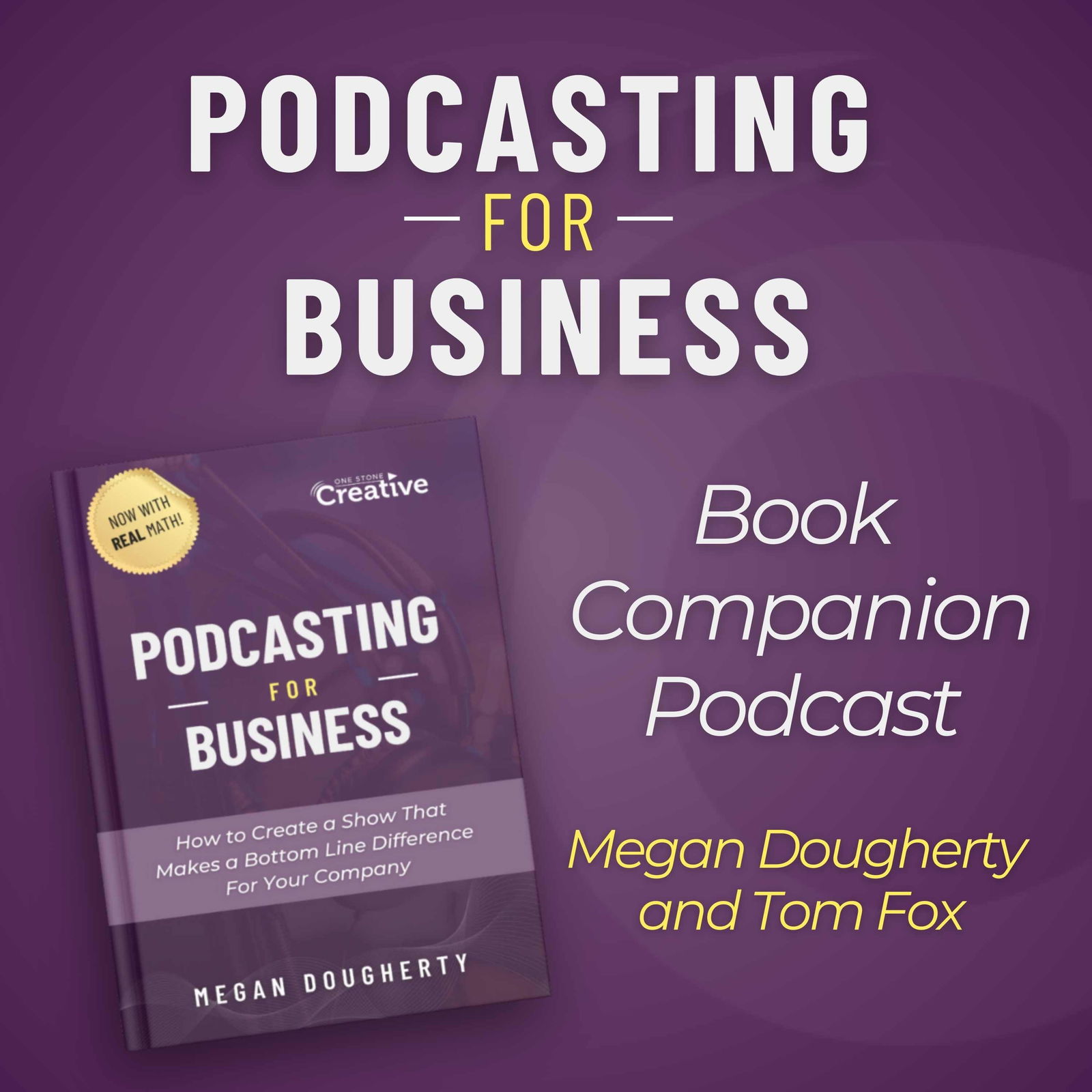
Feed Drop: From Data to Decisions - Podcasting for Business: The Book
Welcome to Podcasting for Business—The Book, where we dive into Megan Dougherty’s transformative book, Podcasting for Business—The Book. I’m your host, Tom Fox, and in this series, we will unpack the invaluable lessons and strategies from Megan’s book, which has quickly become the definitive guide for anyone looking to leverage podcasting as a powerful business tool. Whether you’re a seasoned podcaster or just considering how to get started, this podcast will walk you through Megan’s essential insights, from choosing the right podcast blueprint for your business to mastering the metrics that matter. Join me as we explore how to create, refine, and maximize the impact of your podcast, all through the lens of one of the most comprehensive resources available today.In this episode, Tom and Megan look at the importance of metrics in podcasting and introduce the concept of Podcast Value Math—a system to measure various kinds of value a podcast can provide. Megan shares her passion for numbers and systematization, discussing how different metrics contribute to business outcomes. They explore how to track and optimize metrics to enhance podcast performance, touching on the 15 specific business metrics outlined in their book. The episode lays the groundwork for a comprehensive understanding of utilizing metrics to validate a podcast’s effectiveness and ensure it aligns with overall business goals.Get the Book!Check it out on the Compliance Podcast Network!
10:2203/09/2024
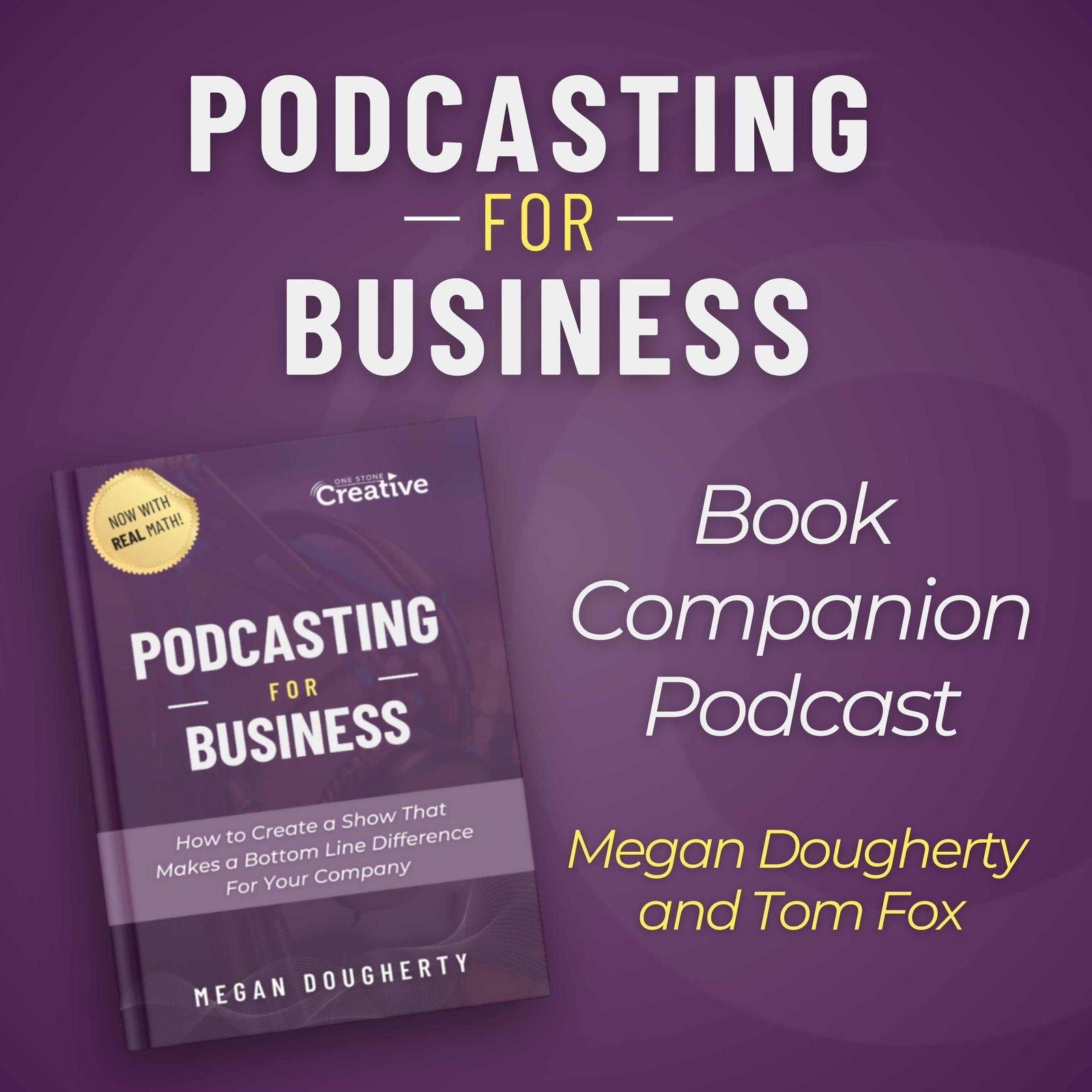
Feed Drop: Choosing Your Strategic Focus - Podcasting for Business: The Book
Welcome to Podcasting for Business – The Book, where we dive into Megan Dougherty’s transformative book, Podcasting for Business – The Book. I’m your host, Tom Fox, and in this series, we will unpack the invaluable lessons and strategies from Megan’s book, which has quickly become the definitive guide for anyone looking to leverage podcasting as a powerful business tool. Whether you’re a seasoned podcaster or just considering how to get started, this podcast will walk you through Megan’s essential insights, from choosing the right podcast blueprint for your business to mastering the metrics that matter. Join me as we explore how to create, refine, and maximize the impact of your podcast, all through the lens of one of the most comprehensive resources available today.In this episode, Tom and Megan explore the nuances of podcasting for business. They discuss the critical differences between business and personal podcasts and emphasize the importance of integrating them into your marketing strategy. Megan introduces the concept of ‘Podcast Blueprints,’ outlining the five key objectives: audience engagement, relationship building, thought leadership, conversion, and content creation. Through practical advice and real-life examples, they explore how businesses can effectively tailor their podcasts to meet specific strategic goals.Get the Book!Check it out on the Compliance Podcast Network!
13:2702/09/2024
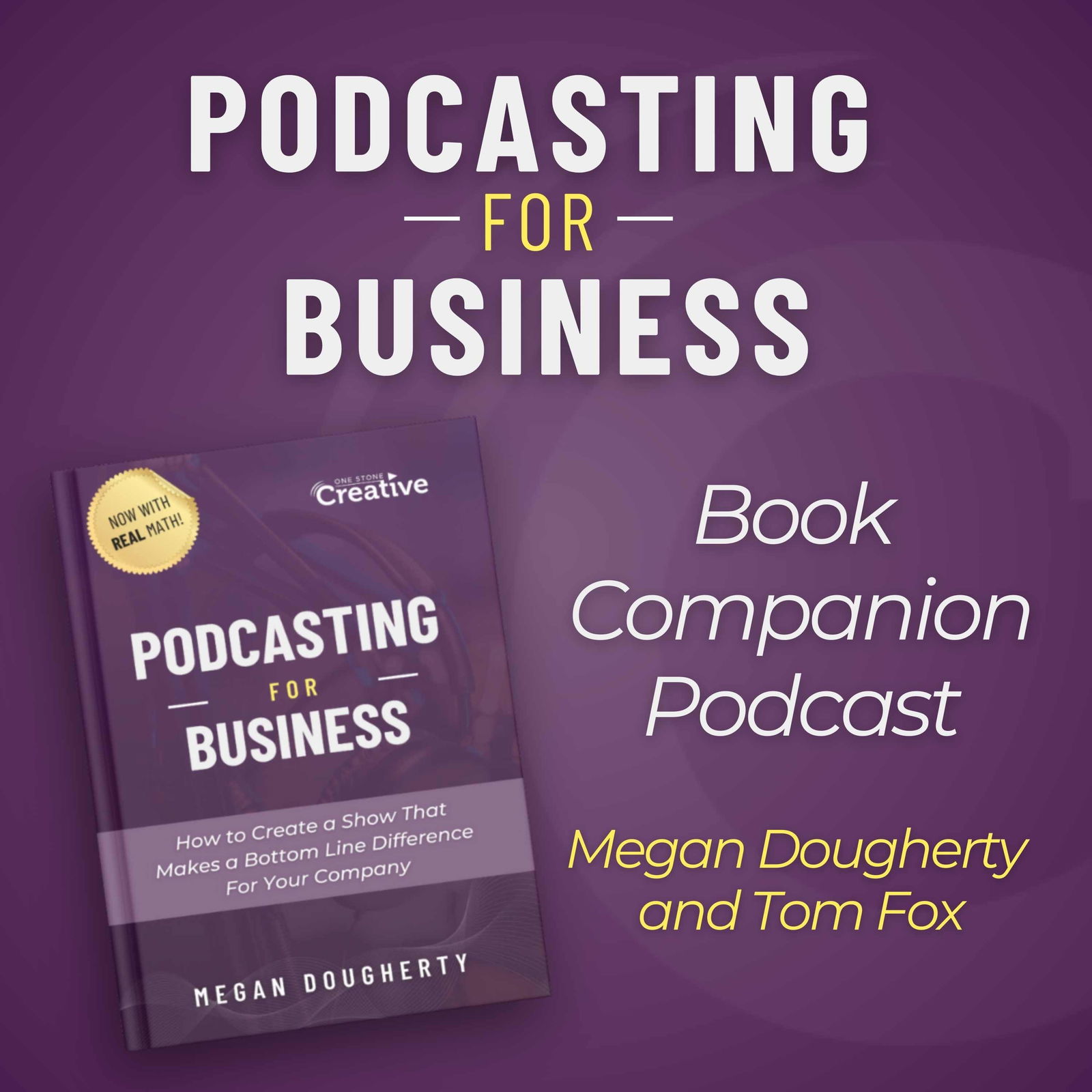
Feed Drop: Discover the Secrets to Podcasting Success - Podcasting for Business - The Book
Welcome to Podcasting for Business – The Book, a podcast series where we dive into Megan Dougherty’s transformative book, Podcasting for Business. I’m your host, Tom Fox, and in this series, we will unpack the invaluable lessons and strategies from Megan’s book, which is the definitive guide for anyone looking to leverage podcasting as a powerful business tool. Whether you’re a seasoned podcaster or just considering how to get started, this podcast will walk you through Megan’s essential insights, from choosing the right podcast blueprint for your business to mastering the metrics that matter. Join me as we explore how to create, refine, and maximize the impact of your podcast, all through the lens of one of the most comprehensive resources available today.In this inaugural episode of this limited podcast series, Tom visits with Megan Dougherty about her new book, Podcasting for Business. Megan shares her journey, starting with the reasons for writing the book, the development of her methodologies, and the timing behind its release. She explains who the book is for and highlights the changes witnessed in the podcasting industry since 2017. Megan discusses her writing process, the importance of outlines, and how she utilized her beta team for feedback. The episode also touches on repurposing content and the book’s availability for pre-order.Get the Book!Check it out on the Compliance Podcast Network!
12:3201/09/2024
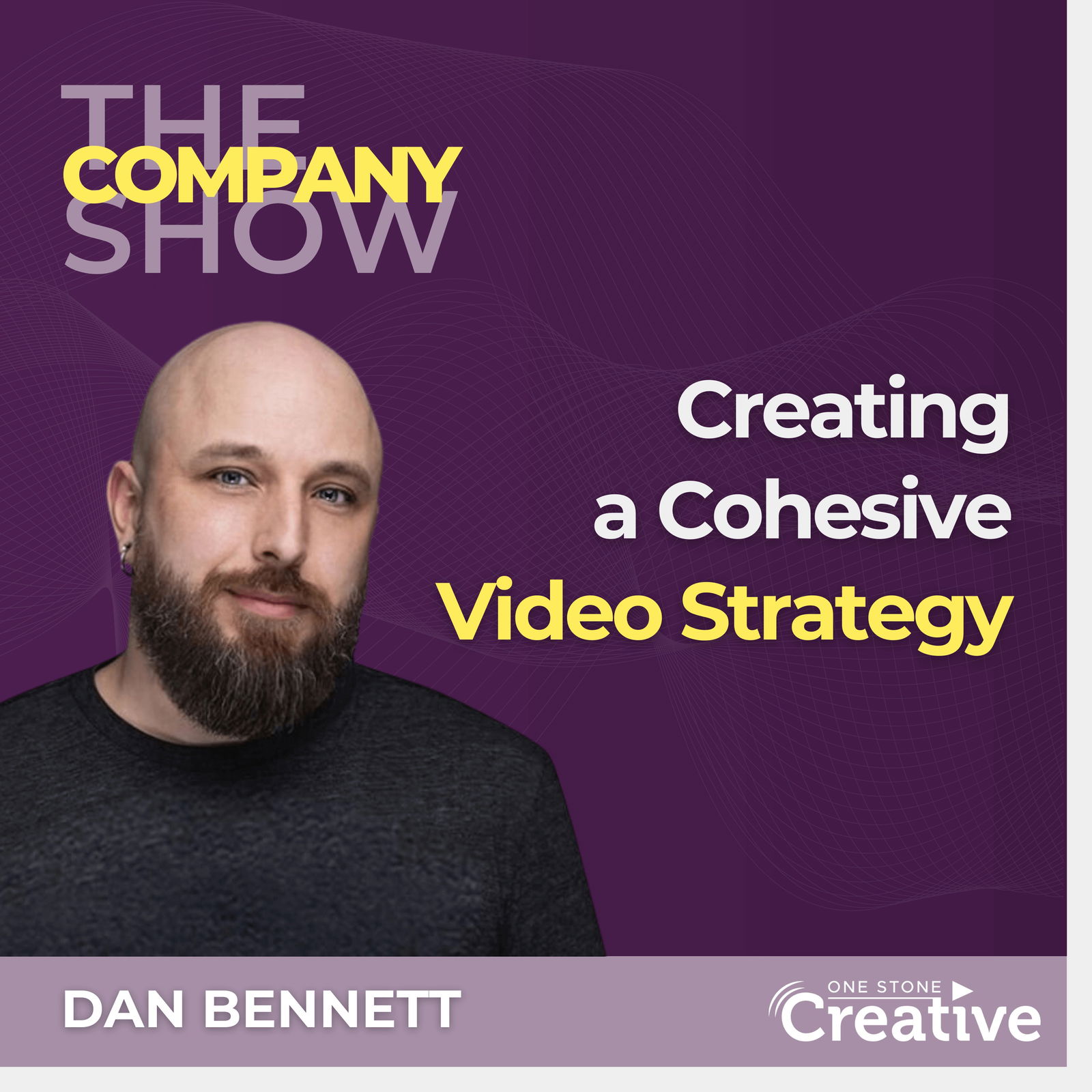
Creating a Cohesive Video Strategy with Dan Bennett
Something that I’ve always found a little challenging when it comes to the marketing of my business is finding the stories that make what we do compelling. I can be rather a literal person.I know what we do is valuable and our clients appreciate it — but as my business partner, and today’s guest is always saying: people connect with stories, and you need to create one that draws people in.One of the ways to do this the most quickly and that sees the highest rates of conversion is by sharing video content for your business and your podcast.Dan Bennet, the creator of Video For Entrepreneurs, has over 15 years in the video production industry and worked with brands like Harley Davidson and Bud Light before forming his company to help entrepreneurs with businesses of all sizes look and feel great on camera.He is joining me today to talk about video and I know I’m not the only person who tends to shy away from it. Dan tells us how to be camera ready, explains his methodology of video content strategy and answers the question: is it really okay to share talking head zoom videos of your podcast?Listen to the episode or read the blog post here: podcastingforbusiness.com/91Tune in to the full episode to learn:The True Power of VideoHow to Bring Humanness into Your Business VideosIs Your Business Ready for Video?The Solar System MethodologyIntegrating Short-Form Videos into Your StrategyWhy Storytelling Should Be Your First FocusOvercoming Camera Nerves with Simple TechniquesIs a Talking Head Video Enough?Pre-production, recording, & post-production strategiesDan Bennett’s Body of WorkStrategic deployment and sales as serviceMy book, Podcasting for Business is coming out this September — learn more about it here.Podcasting for BusinessWe are gearing up over here at One Stone Creative for the launch of my new book, Podcasting for Business — how to create a show that makes a bottom line difference for your company.The official launch date is on September 10th, just a couple of weeks away. And if you decide between now and then that you'd like to pre-order a copy, then I would be thrilled to give you a completely free ticket to this year's Podcasting for Business Conference.The book is comprehensive. My spouse called it both amusing and exhaustive. It covers:the Business Podcast Blueprintshow to use Podcast Value Math to measure the right things for your businesshow to choose a goal that's actually going to make an impactThen we go into 15 specific business outcomes that we call the metrics that you can optimize a show for to start seeing those results in your business.I'm very proud of it, and I think you will get a lot out of it. So, if you would like to pre-order that, you can do so here. If you do so, you will get my undying gratitude and the free ticket to the Podcasting for Business conference, which is going to be a great event this year.Key Quotes“ I've got so many examples from so many places where video just leveraged windows and doors wide open for people and that video has got six views.” - Dan BennettResourcesOne Stone Creative | LinkedIn | Twitter | Facebook | InstagramPre-order the book, Podcasting for BusinessPre-ordering will get you a free ticket to PFBCon 2024Learn about what other business podcasters are doing:State of Business Podcasting Report 2023Dan Bennett | Website | LinkedIn | Instagram | Complimentary Strategy CallRelated:Does Your Podcast Need to Be on Video? with Megan DoughertyVideo Podcasts: Reflections and DecisionsThe Video Advantage for SEO with Atiba De SouzaShould Company Podcasts be Company Vlogs? An Audio vs. Video Showdown
44:1529/08/2024
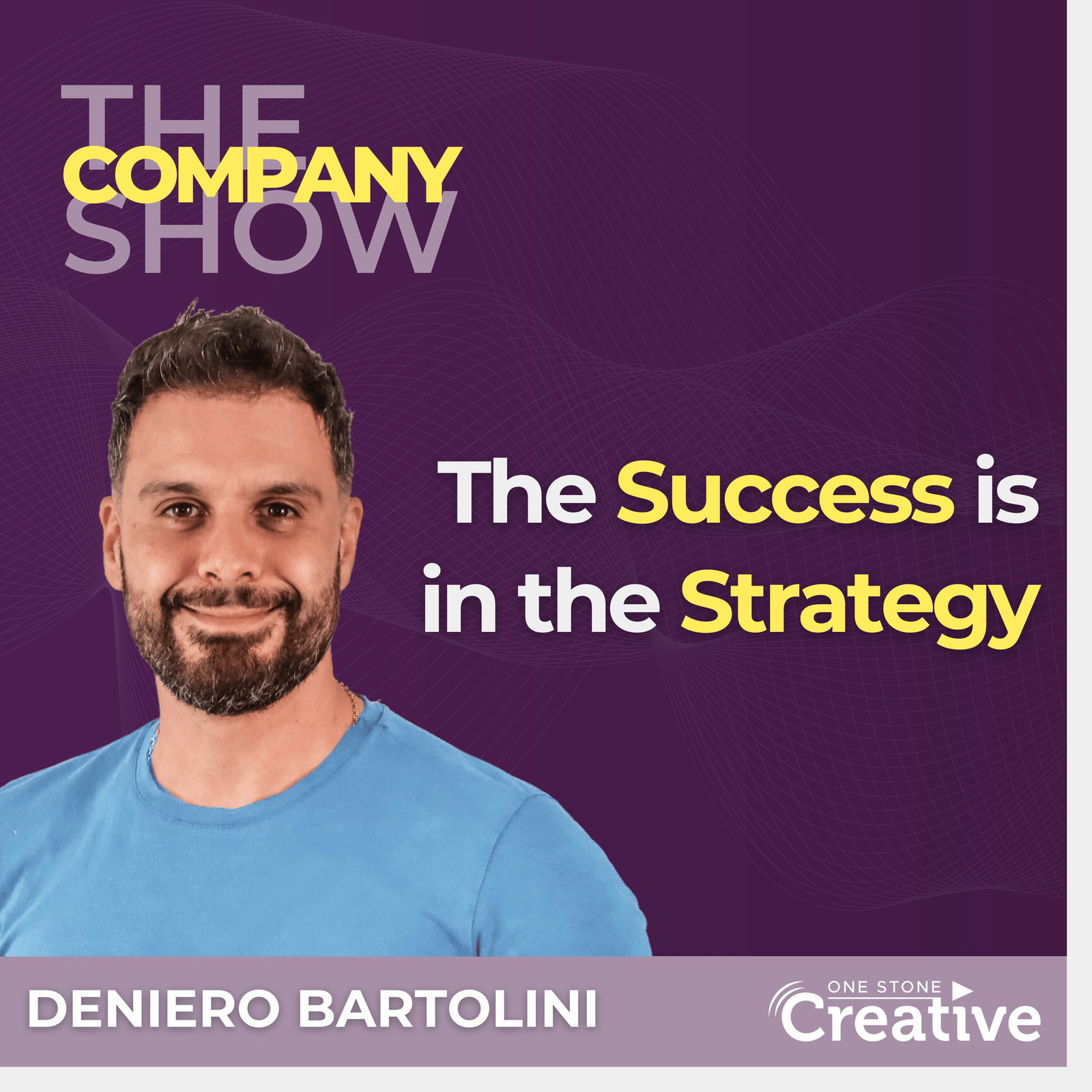
The Success is in the Strategy with Deniero Bartolini
There are products and services that don't require a lot of thought before you buy them — commodities, like toothpaste, shoes, calculators, peaches.But there are others that require a lot of education before someone has enough understanding to be able to make an informed decision about what exactly the product is and how it might be able to help them if they should choose to buy it.Now, a podcast can do a lot of heavy lifting when it comes to filling that gap and providing the education and the understanding required for someone to make a buying decision, and it can make tons of other areas of your sales and delivery process a lot easier.Today, I've got a deep dive into a podcast process and optimization strategy for you with Deniero Bartolini, host of The Remote CEO show podcast. He's a digital entrepreneur, bestselling author and founder of Remote CEO, a company that helps professional firms scale with remote teams.Deniero has been podcasting for almost a decade and a half and is incredibly generous with his insights into the different ways that you can leverage a podcast in a business, from providing that critical early information and education to potential clients of high ticket offers, to building trust with new and old clients of any kind of product and increasing your revenue, which is not always easy as a direct line through podcasting, but he's got some great examples and in case studies of exactly how he has helped clients do that.Listen to the episode below or read the blog post here: podcastingforbusiness.com/90Tune in to the full episode to learn:Deniero Bartoloni’s journey from DJing to podcastingIndoctrination through podcastingPodcasting and the sales cycleBalancing solo and interview episodesStreamlining podcast production with The Remote CEOHow metrics and audience goals shape growthPodguesting versus hostingFinding the right podcast personaSigns that you should podcast for your businessMy book, Podcasting for Business is coming out this September — learn more about it here.Connect with Deniero BartoliniDeniero: “Everybody can find me at denierob.com — book, podcasts, and everything else.If you are a solopreneur looking to scale up with a remote team, or you are an existing business owner that has maybe a team of 10, 15 people, but you also want to build a hybrid team, then also reach out to us because we have some great stuff that we want to share with you.”Website | LinkedIn | Instagram | The Remote CEO ShowBe A Guest on The Company ShowDo you have a podcast that's making a major difference in your business or know one that is? Fill out this contact form and let us know about it.We'd love to have you here for an episode like this one!Need A Podcast?As always, this is Megan Dougherty, and The Company Show was made possible by the team at One Stone Creative.If you know a business owner that you think should have a podcast, do us a favor and send them to podcastingforbusiness.com!Key Quotes“A confused mind never buys.” - Deniero BartoliniResourcesOne Stone Creative | LinkedIn | Twitter | Facebook | InstagramPre-order the book, Podcasting for BusinessPre-ordering will get you a free ticket to PFBCon 2024Learn about what other business podcasters are doing:State of Business Podcasting Report 2023Deniero Bartolini | Website | LinkedIn | Instagram | The Remote CEO ShowRelated:Case Study: Podcasting as a Long-Term Marketing Strategy with Susan FriedmannThe Power of Strategy with Stephanie Feger
29:3222/08/2024
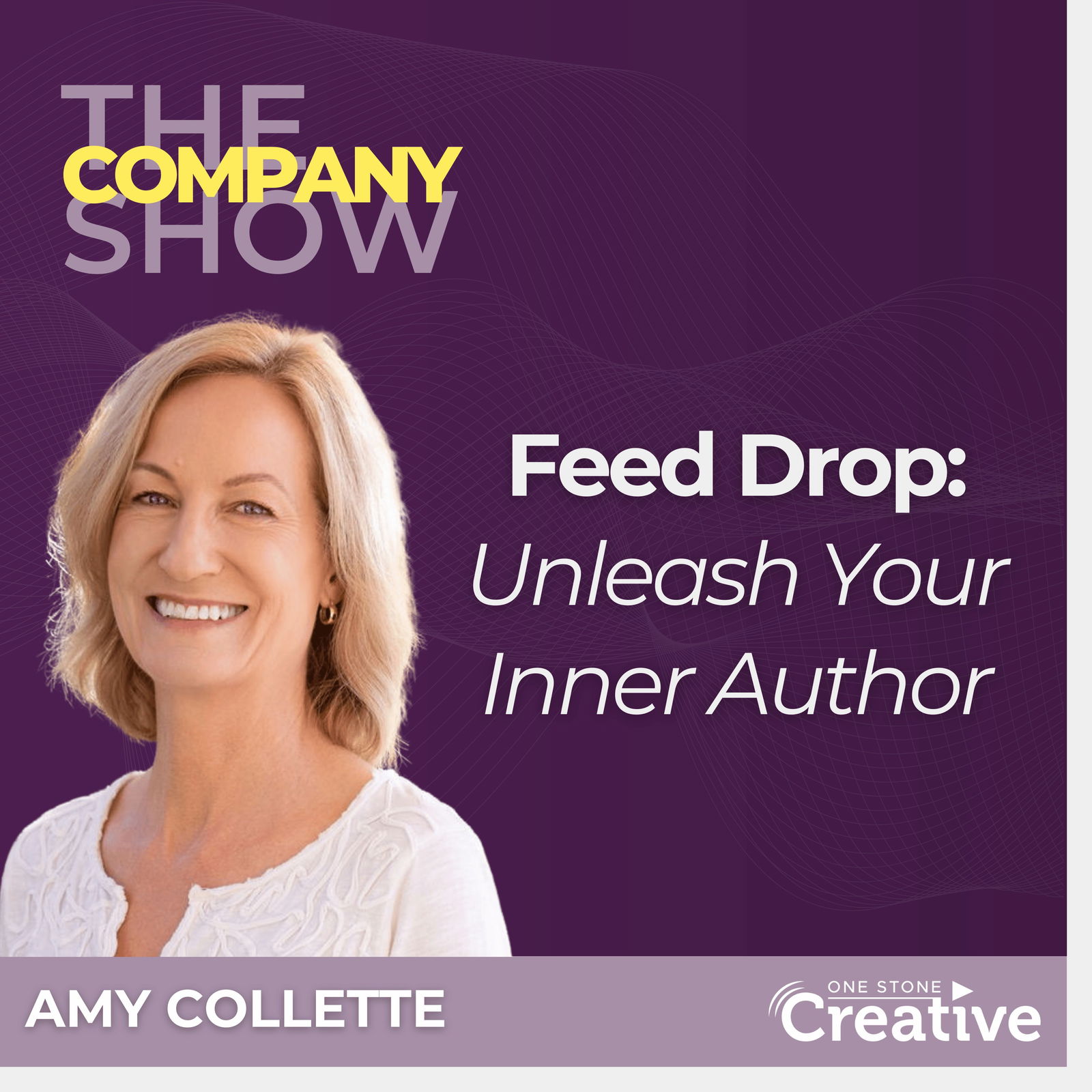
Feed Drop: Unleash Your Inner Author with Amy Collette
This is a very exciting week, friends, and one that I have been a little nervous about for the last six months.You already know that my book, Podcasting for Business is written and available for pre-order here.But what you don’t know is that my coach, Amy Collette and I documented the entire process of writing it in a 7 episode podcast series that you can listen to right now.All of it. The good. The bad. The grumpy. And there is some grumpy.All 7 episodes are live, and if you want a glimpse behind the curtains of writing a book - from the idea to the manuscript, I suggest you check it out.If writing a book has been on your radar - or you’ve got half a dozen on your shelf and you want to enjoy watching struggle through title one - check out the series. It’s truly a tell-all, and I admit, I’m a little nervous to be so visible in public. So be kind.Today, I want to share the first full episode of Unleash Your Inner Author. This is where Amy and I talk about the book I planned to write, what worries and concerns I had about it, and what the process was going to look like.Listen to Episode 1: The Kickoff or read the blog post here: podcastingforbusiness.com/89Tune in to the full episode to learn:The Business Podcast BlueprintsProcrastinating for purposeFear, confidence, and excitementDone energy: The pros and consLeveraging a Book for Credibility and Client EngagementThe Intensive Two-Day Retreat: Jumpstarting Your BookManaging the Urge to Jump into Content WritingStreamlining Decision-Making with Filters·My book, Podcasting for Business is coming out this September — learn more about it here.Final ThoughtsThis was such an interesting process, and really, a strange one for me. It’s truly a tell-all about the experience, and there are parts that, looking back on, I find a little embarrassing. But none of us are our best all the time - and I’ve learned that it is pretty common to get a little grumpy and resistant during the coaching process.It was important to both me and Amy to show the whole process - challenges and all. This series really does go through everything that we did together to get Podcasting For Business ready to publish - and I’m so happy with how it’s come together.I want to publicly thank Amy for all of her support, amazing advice, wonderful accountability and grace.Check out all of the episodes here.And if you want to grab a copy of the book, you can do so, and get a free ticket to the Podcasting For Business Conference by visiting this link.Key Quotes“I don't want done energy yet because it's not done yet.” - Megan Dougherty“I love to celebrate all throughout the process. You got to celebrate those small wins because it's easy to check off that accomplishment.” - Amy ColletteResourcesOne Stone Creative | LinkedIn | Twitter | Facebook | InstagramPre-order the book, Podcasting for BusinessPre-ordering will get you a free ticket to PFBCon 2024Learn about what other business podcasters are doing:State of Business Podcasting Report 2023Check out all the episodes of the Unleash Your Inner Author podcast!Unleash Your Inner Author | LinkedIn | Instagram | FacebookJoin the UYIA Coaching Program.Get your book published here.Get a copy of The Gratitude ConnectionAmy’s got a new book coming soon! Get updates here.Related:Pitching and Podcasting for Authors with Angie TruebloodGuest Post: Author Marketing 101 – Because your book won’t sell itself.Case Study: Podcasting as a Long-Term Marketing Strategy with Susan Friedmann
34:2815/08/2024
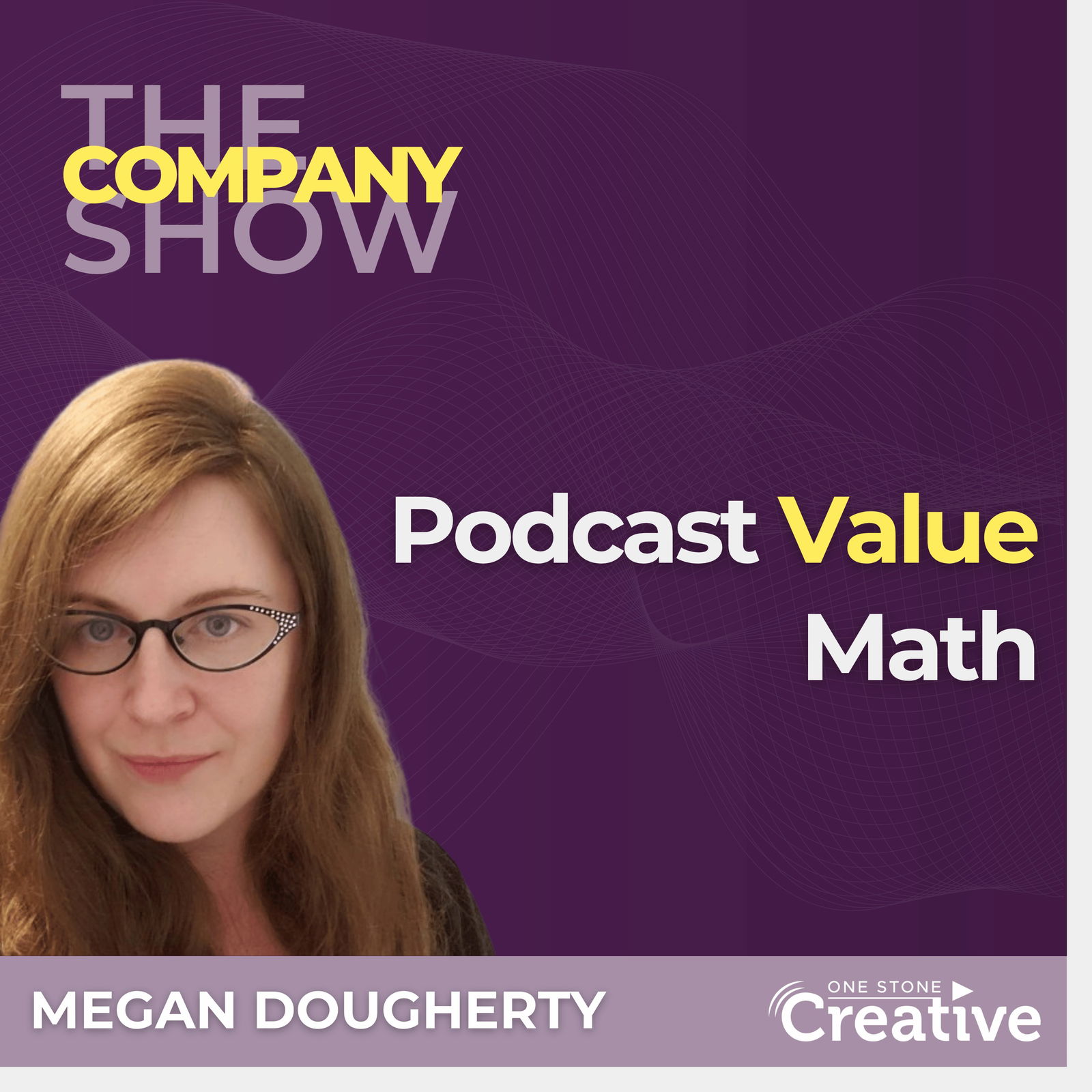
Podcast Value Math with Megan Dougherty
I’ve been looking forward to this episode all year.I am absolutely thrilled to share that my book, Podcasting for Business, is officially available for pre-order!This book has been percolating in the back of my brain for years, and now, with the help of an amazing book coach, Amy Collette of Unleash Your Inner Author, it’s ready to go.The official launch date is on September 10th, and I have some fun things planned between then and now - but today, I wanted to share one of my absolute favorite chapters with you.All right- the excerpt is coming right up, but first I wanted to tell you where and how you can pre-order the book in case you simply cannot wait.It’s all at PodcastingforBusiness.com/Book - along with the details about how to turn your pre-order into a free ticket to the Podcasting for Business Conference!And now, for podcast value math, listen to the episode or read the blog post here.Tune in to the full episode and learn:What podcast value math isHow to identify what’s valuable,which part of the show is creating that value,and what you should do to increase that.My book, Podcasting for Business is coming out this September — learn more about it here.Read the rest of the blog post here.Final ThoughtsI hope that you enjoyed this - and that you found it useful! This is just one of dozens of chapters in Podcasting for Business, which is currently available for preorder!And if you decide to order between now and September 10th - our official launch day - I have a gift I’d like to give you: A Free Ticket to the Podcasting for Business Conference!Once you pre-order the book, just go to PodcastingforBusiness.com/book, and fill out the form! You’ll be sent a coupon code to get 100% off your ticket to the Podcasting for Business Conference.And it’s going to be a great event this year. We have an incredible lineup of expert speakers, networking events, and workshops - all virtual and all recorded.And all yours for free with the pre-order of Podcasting for Business, at $9.99. Not a bad deal, if I do say so myself.All of the details are at PocastingForBusiness.com/Book. Check it out, let me know if you have any questions, and I’ll be back next week with a fantastic interview with another expert interview.Be A Guest on The Company ShowDo you have a podcast that's making a major difference in your business or know one that is? Fill out this contact form and let us know about it.We'd love to have you here for an episode like this one!Need A Podcast?As always, this is Megan Dougherty, and The Company Show was made possible by the team at One Stone Creative.If you know a business owner that you think should have a podcast, do us a favor and send them to podcastingforbusiness.com!Key Quotes“When you understand and use podcast value math, you can optimize for and track anything you want to. That's what makes it so fun and so powerful.” - Megan DoughertyResourcesOne Stone Creative | LinkedIn | Twitter | Facebook | InstagramMake sure to check out our free Monthly Strategy Calls!Podcasting for Business Conference 2023 RecordingsLearn about what other business podcasters are doing:State of Business Podcasting Report 2023Related:How to Measure the Impact of Your PodcastMetrics that Matter for Company Podcasts
10:0008/08/2024
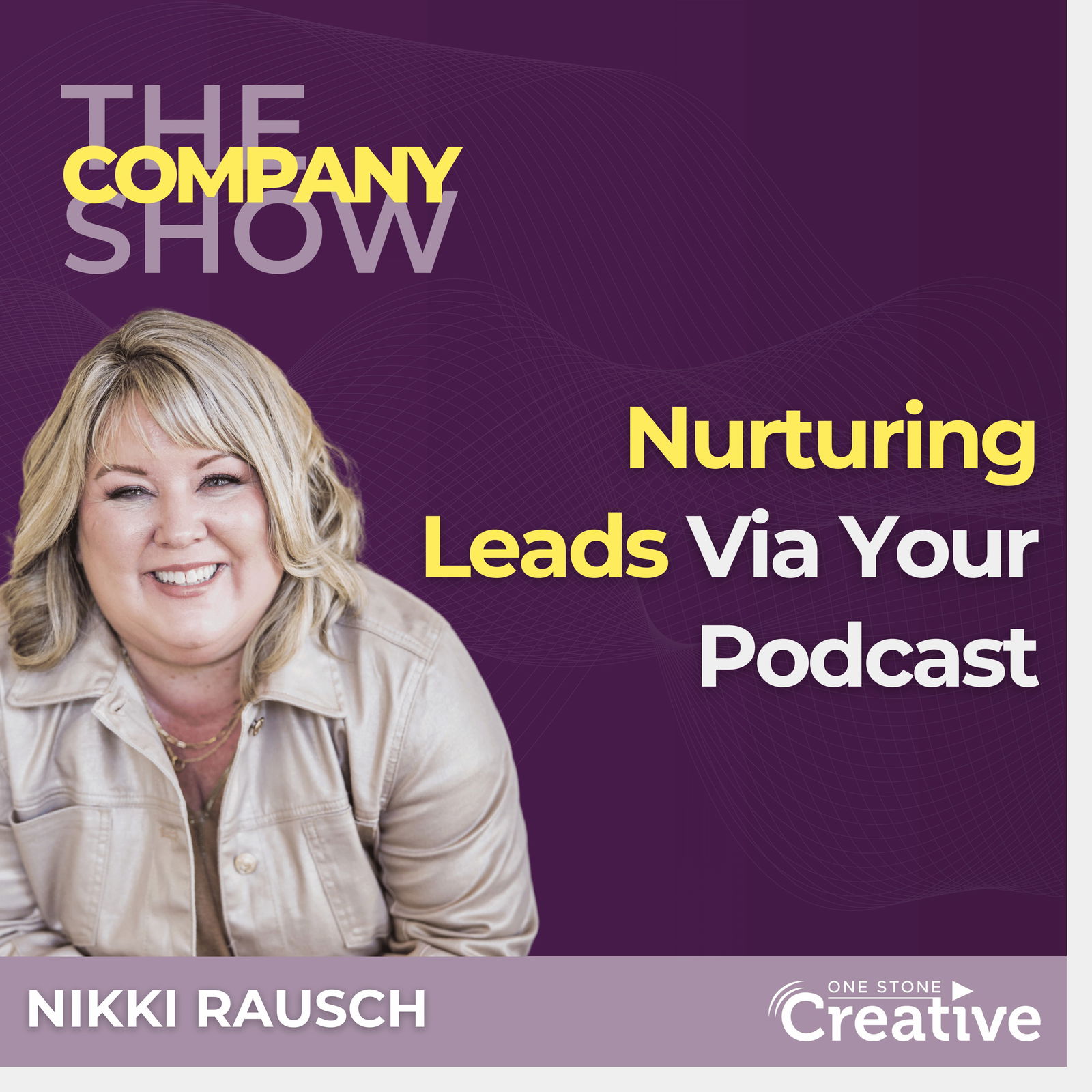
Nurturing Leads Via Your Podcast with Nikki Rausch
A lot of business start out as a podcast guest before they start hosting their own show. It’s a great strategy for a few reasons:You get a chance to practice your on-air presenceYou get exposure to new audiencesYou get to connect with the hosts of the shows you guest on, who can become amazing partners down the road.You can test out different offers and opt-ins on different audiences to see how they perform.That’s really just scratching the surface, but as a “getting started in audio marketing” strategy, it can’t be beat.If you do, and it starts to work, then you’re probably going to want your own podcast at some point… or your audience will start demanding it.That’s what happened to my guest today.Nikki Rausch is the CEO of Sales Maven, a three-time Author, host of the Sales Maven Podcast, and has over 25 years of selling experience, helping entrepreneurs and small business owners sell successfully and authentically. Not only that, she is extremely generous with her time and her knowledge.Nikki is podcasting to incredible effect, using multiple episode formats for specific different goals and in today’s episode, you’ll get to hear all of them.Listen to the episode or read the blog post here: podcastingforbusiness.com/87Tune in to the full episode to learn:Why Nikki started her podcast and how it has evolvedThe format she uses to drive new membershipsWhy podcasting is Nikki’s #1 lead generation activity for her businessMetrics for different episode formatsDownloads, podcast size, and your businessRelationships and client successThe power of success story episodesHow to encourage clients to share their success·My book, Podcasting for Business is coming out this September — learn more about it here.Podcasting for BusinessNext week I’ve got a very special episode for you. You may already know that I’m publishing a book this year! It’s called Podcasting for Business, and by the time next week’s episode drops, it’s going to be available for pre-order.And anyone who pre-orders is going to get a totally free ticket to the All Virtual and All Recorded Podcasting for Business Conference, happening this November 13th-15.To celebrate, I’ll be doing a reading of one of my favorite chapters, which I won’t spoil now with a preview. I’ll also be sharing the details of how you can pre-order the book and get your free ticket to PFBCon.Be A Guest on The Company ShowDo you have a podcast that's making a major difference in your business or know one that is? Fill out this contact form and let us know about it.We'd love to have you here for an episode like this one!Need A Podcast?As always, this is Megan Dougherty, and The Company Show was made possible by the team at One Stone Creative.If you know a business owner that you think should have a podcast, do us a favor and send them to podcastingforbusiness.com!Key Quotes"When people realize they're kind of doing you a favor, they feel less weird about talking about themselves.” - Nikki Rausch"It would be so difficult to become one of the big podcasts, but the most successful podcasts, when you're actually looking at the impact it can have on a business, are very rarely those huge ones.” - Megan DoughertyResourcesOne Stone Creative | LinkedIn | Twitter | Facebook | InstagramMake sure to check out our free Monthly Strategy Calls!Podcasting for Business Conference 2023 RecordingsLearn about what other business podcasters are doing:State of Business Podcasting Report 2023Nikki Rausch Website | Facebook | Instagram | LinkedInA gift from Nikki: Closing The Sale EbookRelated:Using LinkedIn to Supercharge your Relationship Building with Sophie LechnerA Dance of Guests and Hosts: Optimizing Your Workflows and Relationships with Jason CerconeThe Ultimate Guest Pitching System with Kris Ward
32:2601/08/2024
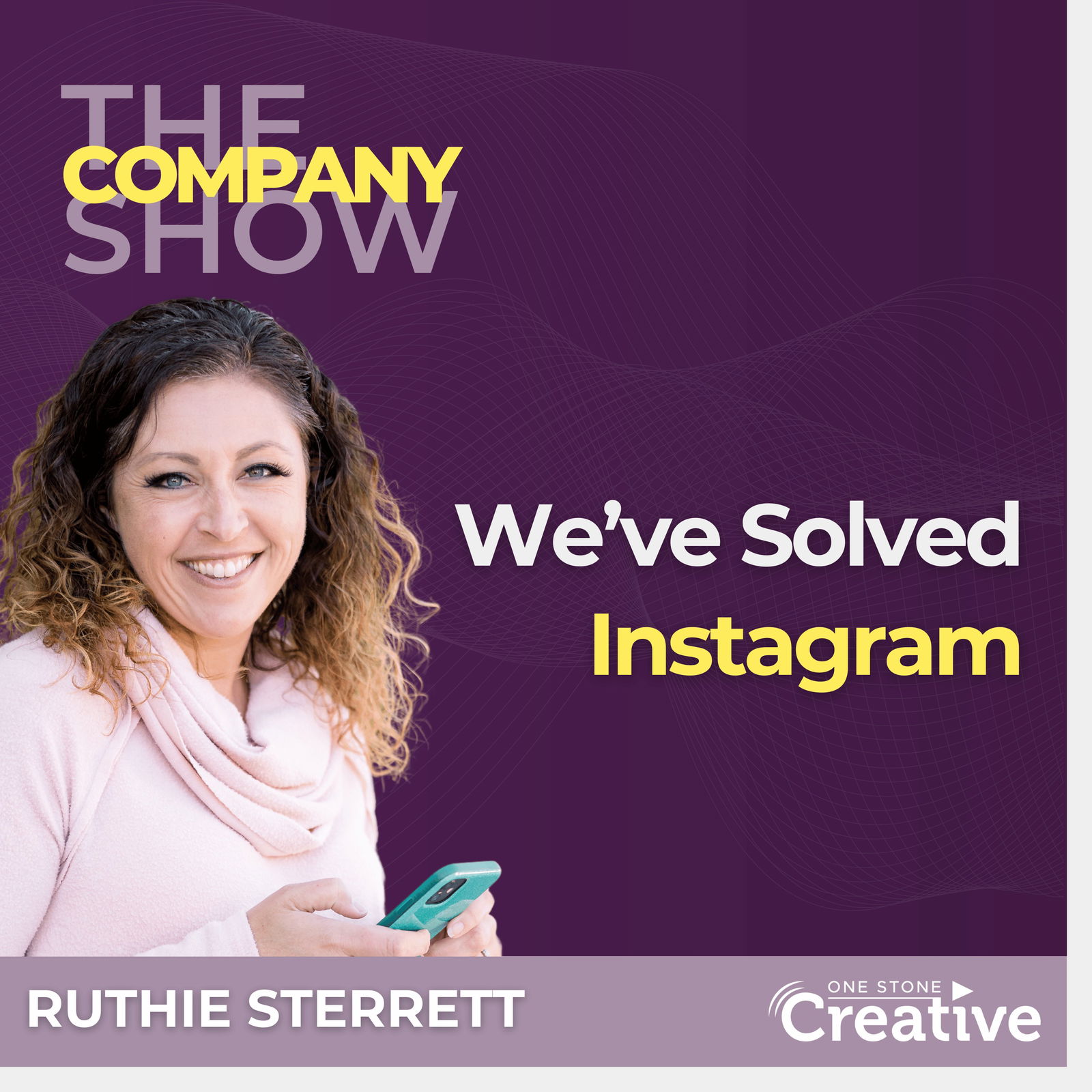
We’ve Solved Instagram with Ruthie Sterrett
There are those who love social media and there are those who hate it.There are also those who, despite kind of hating social media, understand that people are using it and as a business they should have a professional and appealing presence on it—I'll let you guess which one I am.Whether you're doing it yourself or managing a team who's doing it for you, the day-to-day and the constant grind of creating content can be just absolutely excruciating, not to mention expensive.Happily, you don't actually have to use every platform every single day to have that professional and appealing presence.Social media, especially Instagram for me, has been the nut I just can't crack. I understand that it's valuable. I understand that it's a great way to connect. I've just never been able to really use it effectively, and that's both personally and professionally. I don't use Instagram that much.Happily, I've got a great team member who's able to create really awesome, engaging posts and share the things that we want to share, like the amazing guests that we have on this podcast. But it has not been a major focus of the work that we've done on social ever since we started One Stone Creative.My guest today has the solution for this problem and has perhaps even cracked the nut of Instagram.Ruthie Sterrett is a fractional CMO and founder of The Consistency Corner, a holistic marketing agency supporting service based businesses. Her whole business is about helping CEOs step away from social media, without sacrificing visibility, because most CEOs didn’t start a business to be a content creator.And to that I say: YES PLEASE.Ruthie and I talked about about what most businesses really need from the social media platforms they use, the key consideration most of us don’t really make when it comes to strategizing how to use them, and how to make your Instagram work for you even if you don’t want to use Instagram.Listen to the episode below or read the blog post here: Tune in to the full episode to learn:Why social media is so hardStrategic social media useSocial media and funnelsWhy intentional social media mattersThe Instagram 9-Grid StrategyHow to use ManyChatWho shouldn’t use The 9-GridHow to repurpose Instagram for othe platformsWe’re looking for speakers for this year’s Podcasting for Business Conference! Click here to learn more.Share Your Expertise at PFBCon 2024I want to remind you that applications for speakers at the Podcasting for Business Conference this year are open!If you’ve got a skill, strategy or technique that can help business owners with their podcasts, I want to hear about it! Go here to get all the details. Applications will be open until July 29th.Be A Guest on The Company ShowDo you have a podcast that's making a major difference in your business or know one that is? Fill out this contact form and let us know about it.We'd love to have you here for an episode like this one!Need A Podcast?As always, this is Megan Dougherty, and The Company Show was made possible by the team at One Stone Creative.If you know a business owner that you think should have a podcast, do us a favor and send them to podcastingforbusiness.com!Key Quotes"Bad content, okay content is better than no content because the more you work through it, the better you're gonna get.” - Ruthie SterrettResourcesOne Stone Creative | LinkedIn | Twitter | Facebook | InstagramMake sure to check out our free Monthly Strategy Calls!Podcasting for Business Conference 2023 RecordingsLearn about what other business podcasters are doing:State of Business Podcasting Report 2023Ruthie Sterrett | Website | Instagram | LinkedIn | FacebookThe Instagram 9-Grid StrategyThe Consistency Corner PodcastRelated:Mastering Facebook Ads for Podcast & Business Growth with Stacy ReedUsing LinkedIn to Supercharge your Relationship Building with Sophie Lechner
29:2525/07/2024
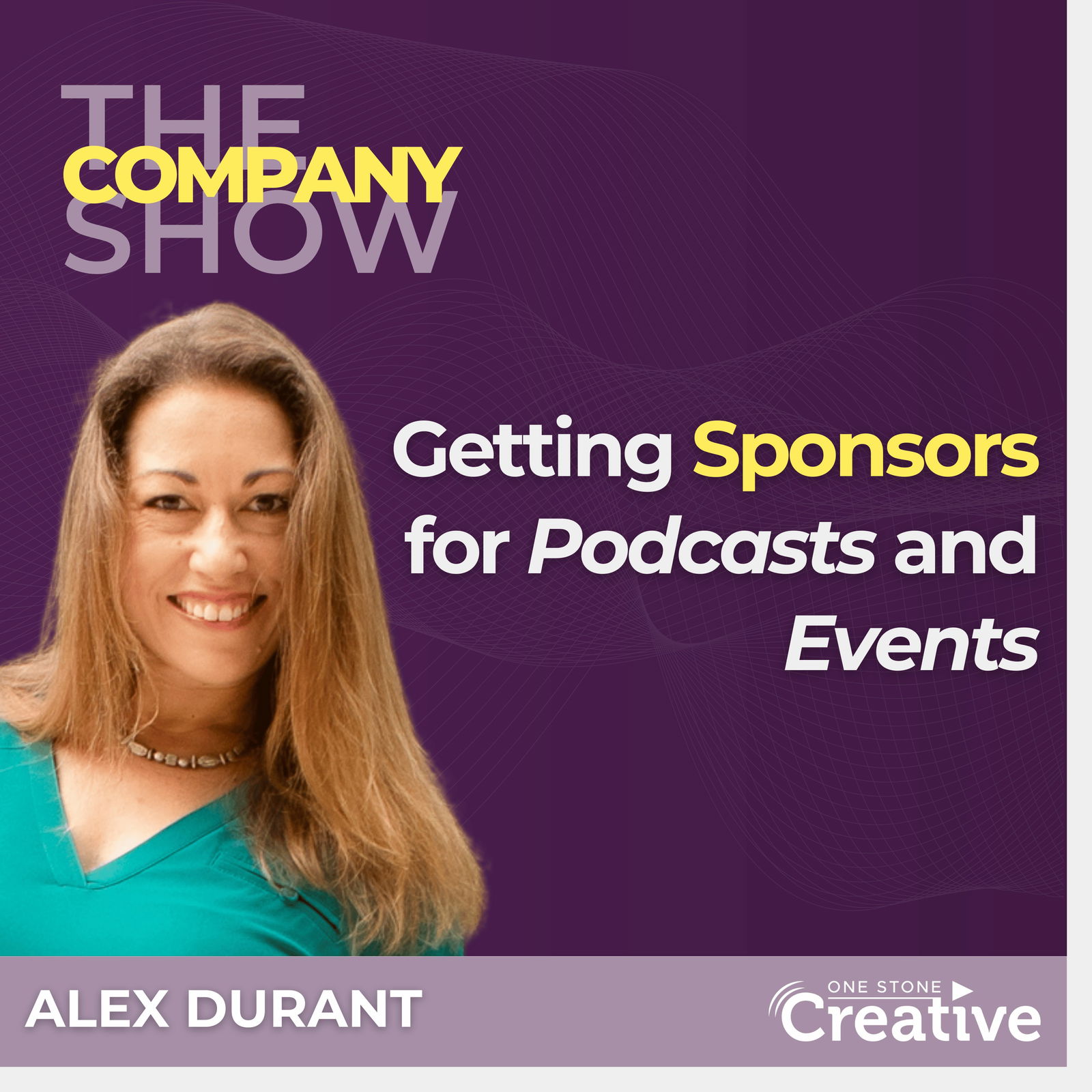
Getting Sponsors for Podcasts and Events with Alex Durant
I often say that sponsors aren’t a great path for most company podcast—the ROI just isn’t there when other business goals are more immediate and more valuable than the income that can be generated by sponsors.But most is not all, and if it’s a path you’ve deemed the right one for your show, I want you to have all of the information you need to create a great package.So, sponsorships! I’ve never had them for this show, nor have I arranged them for the Podcasting for Business Conference so far—although that will be changing this year!That means I don’t have the absolute latest, up-to-the-minute best practices on what makes a great sponsorship package, and how to communicate them. I’m lucky enough to know someone who does, however.Alex Durant is the owner of **Durant Consulting Inc.**, where, essentially, she takes everything that can be a nightmare about coordinating large events with lots of sponsors and takes care of everything.She works with companies to develop sponsorship packages and decks and coordinates to make sure everything is delivered as promised. For this reason, she is extremely sought after. I can tell you, if wrangling sponsors is anything like wrangling affiliates for big events; it’s a huge job with a lot of moving parts.It was actually talking to Alex that convinced me to open up the Podcasting for Business Conference to sponsorship this year. I’m so excited to bring you our conversation, where Alex shares how to think about sponsorship as it relates to your podcast and environment.Listen to the episode below or read the blog post here: podcastingforbusiness.com/85Tune in to the full episode to learn about:How to incorporate sponsors into different podcast formatsThe sponsorship real estateSponsors: When to look, how to choose, how to approachLeveraging industry connections for visibilityHow to build your sponsorship deckEnsuring clarity in sponsorship contractsThe recap deckHow to deal with a disappointed sponsorTechnical issues with podcast adsShare Your Expertise at PFBCon 2024As a final note today, please remember that speaker applications for this year's Podcasting for Business Conference are open now!If you have a skill, strategy, insight, or methodology that you think a business owner who podcasts needs to know, then I want to hear about it.Head over **here** and fill in the form that you find there to tell me and my team what you want to share with the community at the Podcasting for Business Conference.Be A Guest on The Company ShowDo you have a podcast that's making a major difference in your business or know one that is? Fill out this contact form and let us know about it.We'd love to have you here for an episode like this one!Need A Podcast?As always, this is Megan Dougherty, and The Company Show was made possible by the team at One Stone Creative.If you know a business owner that you think should have a podcast, do us a favor and send them to podcastingforbusiness.com!Key Quotes“Just because someone might be willing to give you some dollars, is it worth the reputation of having them as a sponsor? For your reputation, does it make sense at all?” - Alex Durant"The real winning blueprint for sponsorships is audience engagement.” - Megan DoughertyResourcesOne Stone Creative | LinkedIn | Twitter | Facebook | InstagramMake sure to check out our free Monthly Strategy Calls!Podcasting for Business Conference 2023 RecordingsLearn about what other business podcasters are doing:State of Business Podcasting Report 2023Alex Durant Website | Instagram | LinkedIn | FacebookRelated:Should You Get a Sponsor for Your Company Podcast?
30:4018/07/2024
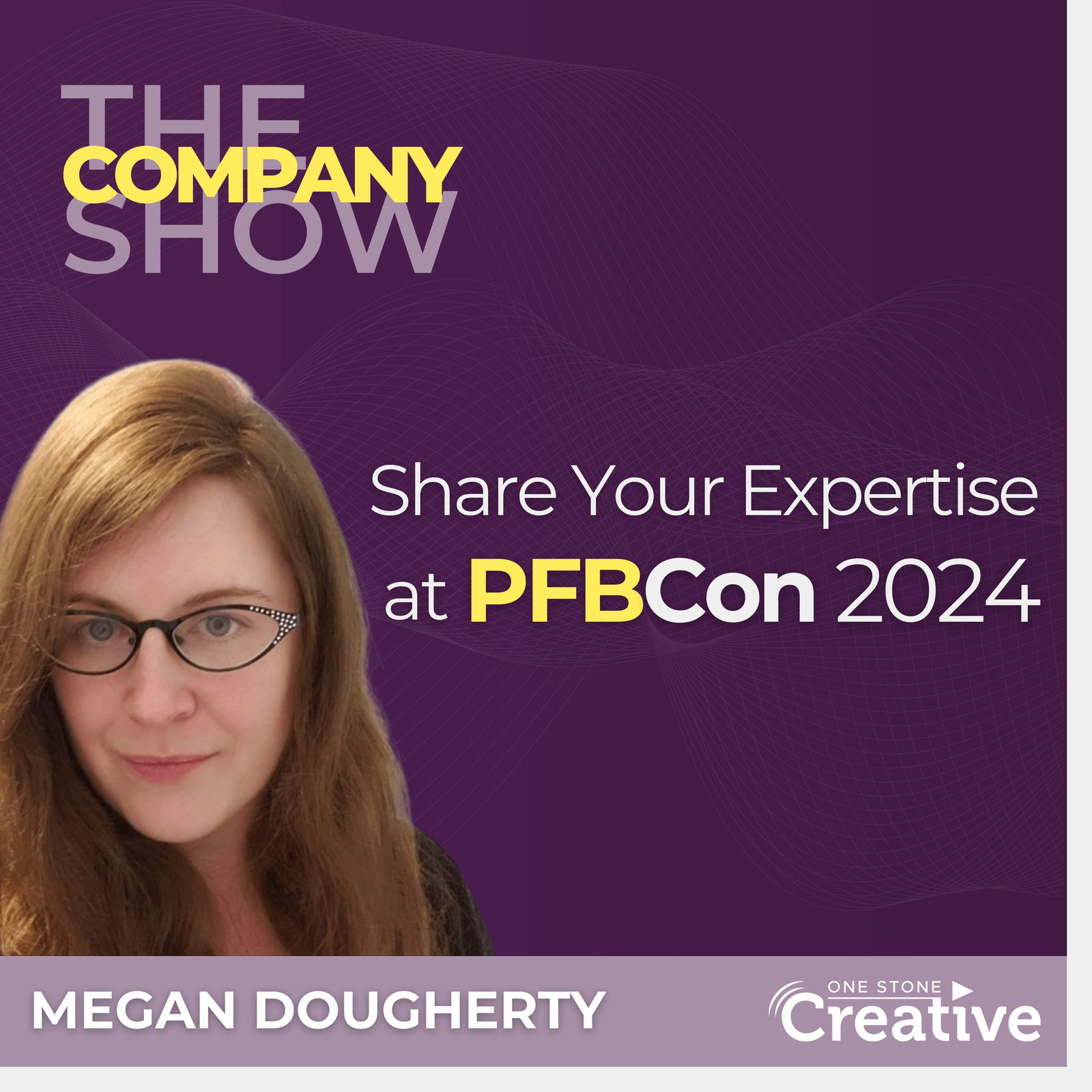
Share Your Expertise at PFBCon 2024
It is that time of year again, friends! We’re opening up submissions for speakers for this year’s Podcasting for Business Conference.The first PFBCon was in 2022, and came about while I, Tom Fox and some other friends were at the always fun and valuable Podfest and realized that as awesome as in-person podcasting events are, they aren’t always a possibility for business owners who podcast as only one of many, many things they have to do every week.So the Podcasting for Business Conference was born—something all virtual and all recorded to fit in around the work of running businesses that so many people need to do.And it’s time to start planning for this fall’s edition.This year’s event is going to be taking place November 14th and 15th with a few special events earlier in that week. I’m looking for 10 speakers who can give specific tools and strategies to help people podcast more effectively, profitably and pleasantly podcast.If you’ve got just such a strategy to share, you can to here and share it!To inspire your thinking, I’m sharing several (although my no means all!) of my favorite clips from last years expert lineup. Listen to the episode or read the blog post here: https://podcastingforbusiness.com/84Tune in to the full episode and get tips and strategies for…podcast visibility and growthpitching to guest on other showsrelationship building for salessearch engine optimizationEmail marketing and collaborationsPodcast re-recording and editingPLUS an exciting announcement and a special offer at the end!Don’t forget to join us for our free monthly strategy calls on the third Thursday of every month!Get Involved!I hope this has all got your creative juices flowing—and if you have some important learning for a community of business owners, experts, service providers and marketing managers and directors, I want to hear your ideas!You’ll find all the details and how to apply here. Applications will be open until July 31st. Please, tell your friends!The BookWhile I’m asking for favors, you may know already that I’ve written a book called, shockingly, Podcasting for Business. It’s going to be releasing in early September this year.This is a project that has been years in the making—we’ve completely codified the Business Podcast Blueprints and created a handbook you can use to design or refine, and optimize a podcast to bring real, bottom line value to your business.Special Offer!What you don’t know yet, is that I am going to give an absolutely free PFBCon ticket to every single person who pre-orders it.If this is something you and your community might be able to take advantage of, send me a note here or find me on LinkedIn—let’s talk.Need A Podcast?The Company Show was made possible by the team at One Stone Creative.If you know a business owner that you think should have a podcast, do us a favor and send them to podcastingforbusiness.com!Key Quotes"The whole pitch is really not about you as the person, it's about what you can bring to that show.” - Angie Trueblood“In podcasting, the only thing that you are limited by is your imagination.” - Tom FoxResourcesOne Stone Creative | LinkedIn | Twitter | Facebook | InstagramMake sure to check out our free Monthly Strategy Calls!Podcasting for Business Conference 2023 RecordingsLearn about what other business podcasters are doing:State of Business Podcasting Report 2023Become a speaker at PFBCon 2024 - Apply HereRelated:Podcasting for Business RefresherThe Value of Podcasting for Business with Tom FoxPFBCon 2023 RecordingsWhether you're a solopreneur, manager of a department, principal at a firm, or a non-fiction author ready to expand into audio, the Podcasting for Business Conference will help you leverage a podcast to meet your business objectives.Missed PFBCon 2023? Check out the recordings!
17:2211/07/2024
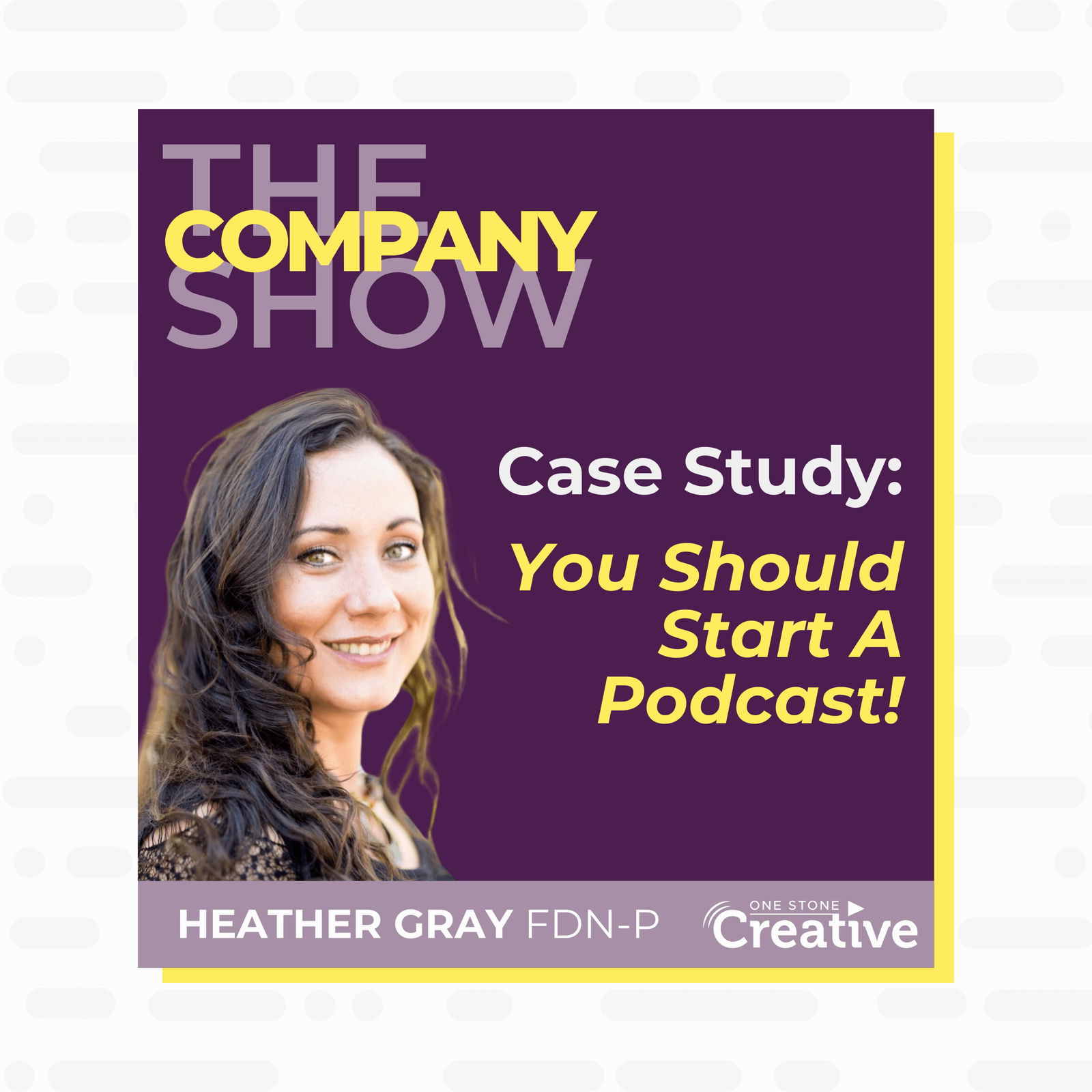
Case Study: You Should Start A Podcast! with Heather Gray FDN-P
You should start a podcast!These words have planted a lot of ideas in the heads of a lot of business owners—and your reaction to hearing that can tell you a lot.You might hear it and think: A podcast? Me? Not a chance. Or maybe: You know what, you’re right, I should have a podcast!Most of us fall somewhere in between the two, and think something like: You might be right… but what a lot of work, would it even be worth it?When you’re unsure and you take the plunge into podcast, it’s often a little deflating because getting started is a lot of effort and a lot of work work and often a lot of money but the rewards, though they can be considerable, usually come much later on in the process.My guest this week, Heather Gray, is formerly known as The Lyme Boss and has now rebranded to Renegade Health Boss. She started podcasting after getting just that kind of prompt from her community and fans, and ended up podcasting for a while before her show started to gain traction.Heather is a Functional Diagnostic Nutritionist and Bioenergetic Practitioner specializing in supporting clients with chronic and complex illnesses such as Lyme disease, Mold Toxicity and Autoimmune diseases.And her podcast is a powerful force in her business.In this case study episode, we’re talking about how Heather has leveraged her podcast for affiliate sales, sponsors, case studies and new clients—she has done such an impressive job optimizing the show to serve her business, and there is so much to learn from her.Listen to the episode read the blog post here: https://podcastingforbusiness.com/83Tune in to the full episode to learn about:The Story of The Lyme BossPodcast Sponsorships and StrategiesAuthenticity in Product EndorsementsStarting with Podcast AnalyticsThe Importance of Solo EpisodesHeather Gray’s Podcasting WorkflowThe Advantages of Embedded AdsLow-Tech Setup for High-Quality PodcastingThe Power of Task DelegationDon’t forget to join us for our free monthly strategy calls on the third Thursday of every month!We’re gearing up for PFBCon 2024Next week is an exciting week, because we’re opening up applications for speakers at this year’s Podcasting for Business Conference!Make sure you’re subscribed on your favorite channel to catch all the details.Be A Guest on The Company ShowDo you have a podcast that's making a major difference in your business or know one that is? Fill this contact form and let us know about it.We'd love to have you here for a case study episode like this one!Need A Podcast?As always, this is Megan Dougherty, and The Company Show was made possible by the team at One Stone Creative.If you know a business owner that you think should have a podcast, do us a favor and send them to podcastingforbusiness.com!Key Quotes“There is no quick rise with podcasting. You just got to put in your time.” - Heather Gray"I sometimes think the only thing more satisfying than getting a great opportunity is being in the position where you turn it down.” - Megan DoughertyResourcesOne Stone Creative | LinkedIn | Twitter | Facebook | InstagramMake sure to check out our free Monthly Strategy Calls!Podcasting for Business Conference 2023 RecordingsLearn about what other business podcasters are doing:State of Business Podcasting Report 2023Heather Gray | Website | Podcast | Facebook | Instagram | LinkedIn | YouTubeRelated:Case Study: Podcasting as a Long-Term Marketing Strategy with Susan FriedmannPodcast Case Study: Grow a Media Business Through Podcasting
33:4704/07/2024
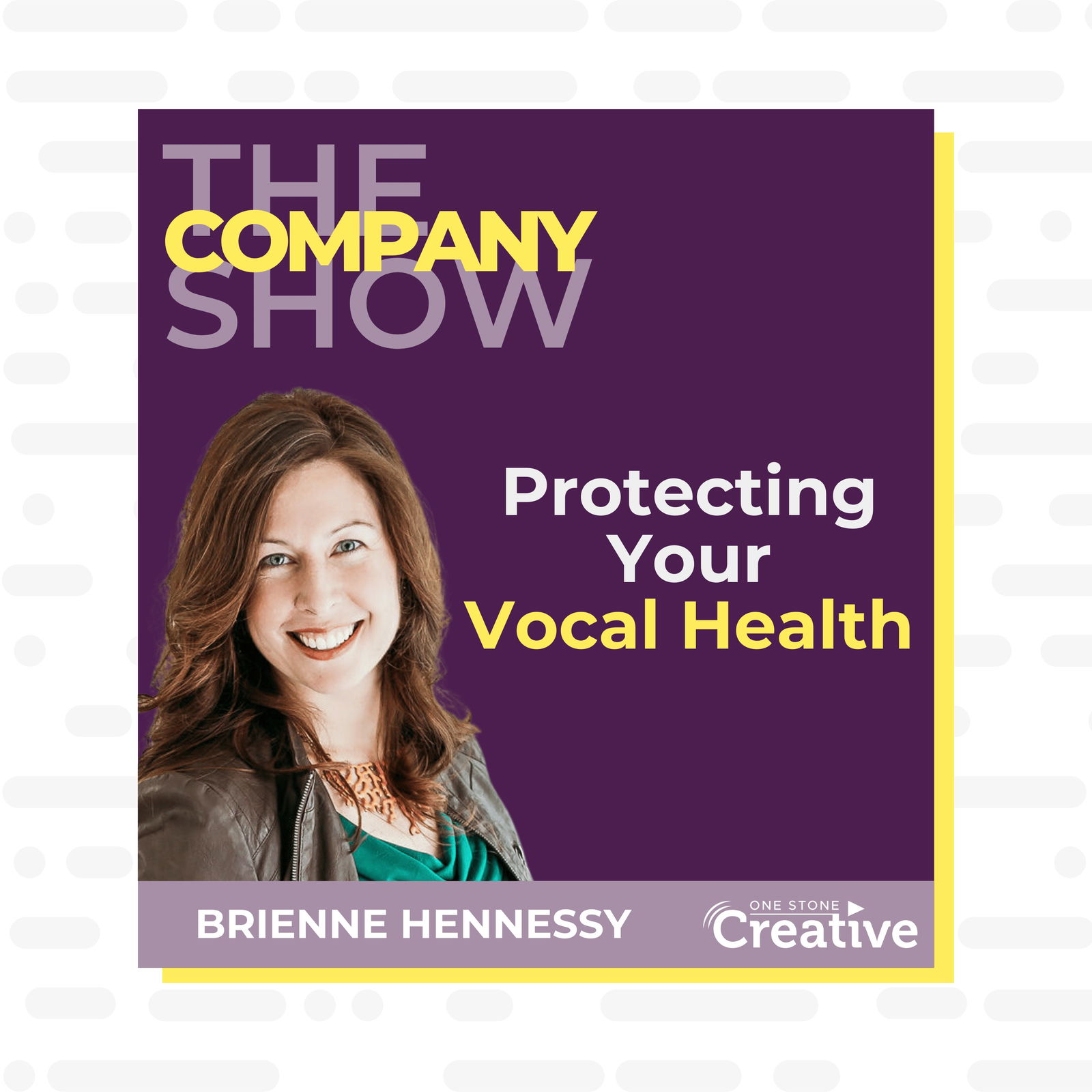
Protecting Your Vocal Health with Brienne Hennessy
Have you ever thought about the health of your voice?The two concepts don’t go together intuitively to me, which is interesting when you think about it because the voice is something created with the body.We’ve all had times when we lost our voice, or noticed it behaving differently based on our environment, situation or other kinds of health. But your voice is something that has it’s own health needs and as a podcaster, you should be aware of them.When you start podcasting as a marketing channel for your business, you're often not coming from a background where your voice is seen as a tool that needs to be cared for, but it is, and you should make it a priority.It's not just about how you sound in your recordings, it's about preventing vocal strain, improving the longevity of your voice, and having more control over how you sound.That is what I learned in my first conversation with today’s guest, who joined us for a Strategy and Networking Call in the Spring and totally changed how I think about my most important tool as a podcaster.Today I’m sharing the training that Brienne Hennessy, a licensed speech-voice pathologist and the founder of Your Vocal Vitality, gave us in our strategy and networking call back in the spring.She is teaching us how voice care is self-care and the mindset shift you need to make about it, what voice triage is, and how to actually improve recovery when we do have vocal difficulties, and some practical tips for preparing your voice before an interview. (Including a vocal exercise I experimented with live on the call!)This training did have a video component, so if you’d like to watch, you’ll find the video below!Listen to the episode, watch the video, or read the blog post here: https://podcastingforbusiness.com/82Tune in to the full episode to learn about:Vocal health issues and challengesUnderstanding the voice box: larynxAddressing vocal problems and daily strategiesThe power of warming upMisconceptions and clarifications on vocal healthHow to take care of your voice in a sustainable wayDon’t forget to join us for our free monthly strategy calls on the third Thursday of every month!Here’s the recording of the Strategy and Networking CallThis includes all the exercises and other fun bits that might have been cut out from the podcast version!https://vimeo.com/960104765Need A Podcast?As always, this is Megan Dougherty, and The Company Show was made possible by the team at One Stone Creative.If you know a business owner that you think should have a podcast, do us a favor and send them to podcastingforbusiness.com!Key Quotes“I've had too many people tell me they actually use the word hate with the sound of their voice and they hate the way it sounds and my question to you is, how can you hate the very thing that you're using to communicate your message with the world?” - Brienne HennessyResourcesOne Stone Creative | LinkedIn | Twitter | Facebook | InstagramMake sure to check out our free Monthly Strategy Calls!Podcasting for Business Conference 2023 RecordingsLearn about what other business podcasters are doing:State of Business Podcasting Report 2023Brienne Hennessy Website | LinkedIn | InstagramTop 10 Vocal Care TipsDiscovery Call with Brienne Hennessy
45:4627/06/2024
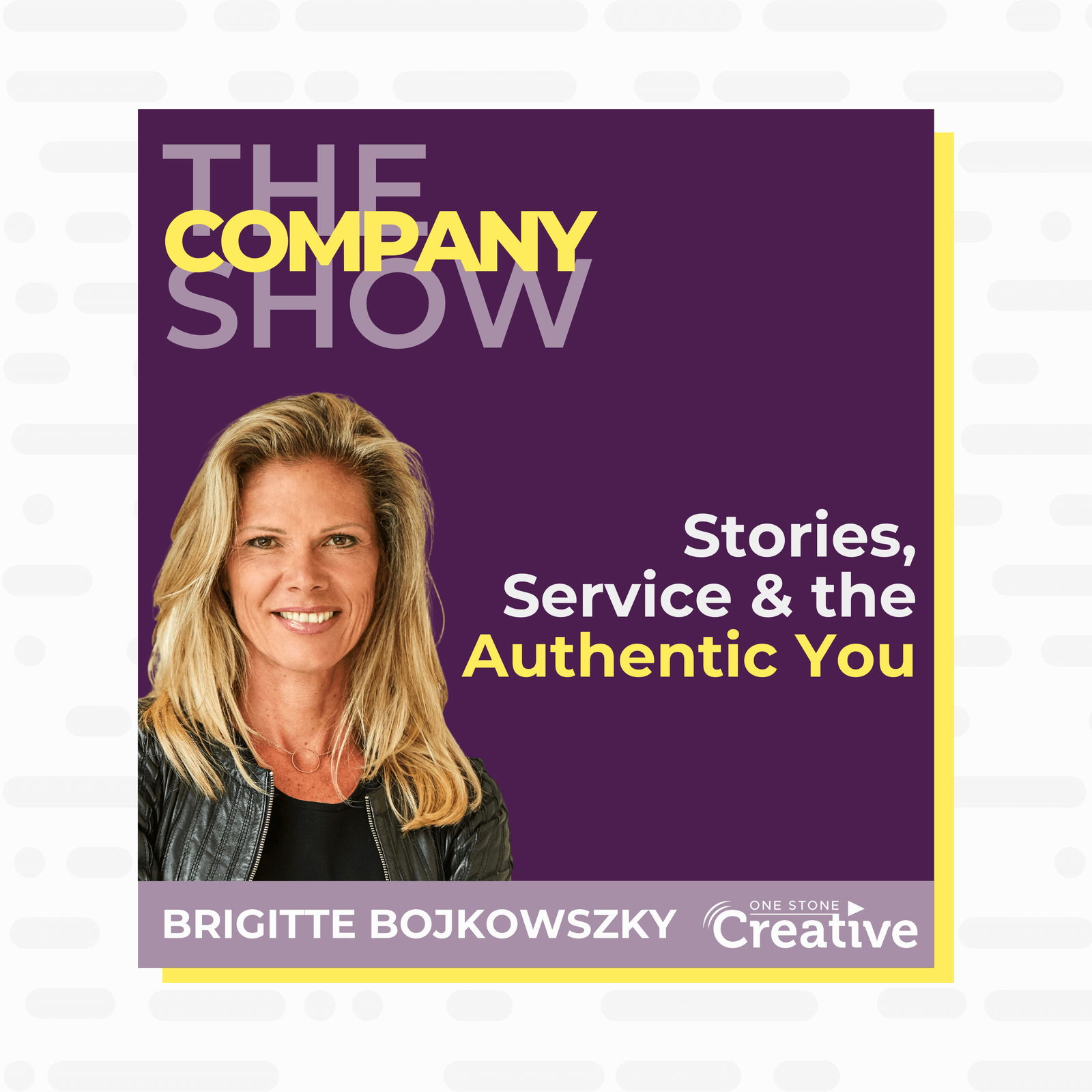
Stories, Service & The Authentic You with Brigitte Bojkowszky
I often say that there are two types of people in the world—those who have done frontline customer service, and those that haven’t.If you want to see the difference between the two, go out for brunch on Mother’s day. It will quickly become obvious to you which of your fellow diners have done their time in the customer service trenches.Aside from understanding in the very marrow of your bones how much harder service workers actually work than your average CEO (I’ve been both, it’s 100% true and I’ll die on that hill)—there is something you learn as a frontline worker, something that can make a huge difference to you as a business owner.It’s the actual, functional delivery of the company’s brand.Servers, to use the example I am most familiar with, tend to have a better understanding of how a brand is perceived by the actual buying public than anyone in the C suite.This, of course, can be for good or ill depending on how well customer service is managed, and how integrated their feedback is in the managerial and marketing processes of the business.That integration is all about taking the intangible—feelings, impressions, offhand comments, and codifying it into a real part of the brand that can be used in all outward facing communications, on your website, in your emails, and on your podcast.Today, I’m speaking with Brigitte Bojkowszky, the creator of Bridget Brands, who is a company and personal brand identity strategist with over 23 years of experience in teaching global marketing management and branding at universities worldwide.Brigitte and I are talking about what differentiates a company brand from a personal one, when you should use each, and how they relate to each other, and the importance of storytelling in all of your branding activities—including your podcast.Listen to the episode read the blog post here.Tune in to the full episode to learn about:The story of Bridget BrandsThe intersection of personal and company brandingStorytelling and brand ConnectionEfficiency and authenticity in AI usageBranding in company onboarding and operationsMetrics and indicators of effective brandingBrigitte’s podcast picks for mastering brand authenticityDon’t forget to join us for our free monthly strategy calls on the third Thursday of every month!Be A Guest on The Company ShowDo you have a podcast that's making a major difference in your business or know one that is? Fill this contact form and let us know about it.We'd love to have you here for a case study episode like this one!Need A Podcast?As always, this is Megan Dougherty, and The Company Show was made possible by the team at One Stone Creative.If you know a business owner that you think should have a podcast, do us a favor and send them to podcastingforbusiness.com!Key Quotes“You need to align your podcast closely to your company or corporate brand so it becomes one channel element or vehicle to communicate your ideas.” - Brigitte BojkowszkyEMBEDResourcesOne Stone Creative | LinkedIn | Twitter | Facebook | InstagramMake sure to check out our free Monthly Strategy Calls!Podcasting for Business Conference 2023 RecordingsLearn about what other business podcasters are doing:State of Business Podcasting Report 2023Brigitte Bojkowszky Website | LinkedIn | Instagram | Facebook | YouTubeBrandsTalk podcastRelated:What Makes an Audio Brand? with Jodi KrangleBranding that Feels Great with Sabrina ChevannesHow to Measure the Impact of Your Podcast with Megan Dougherty
41:3020/06/2024
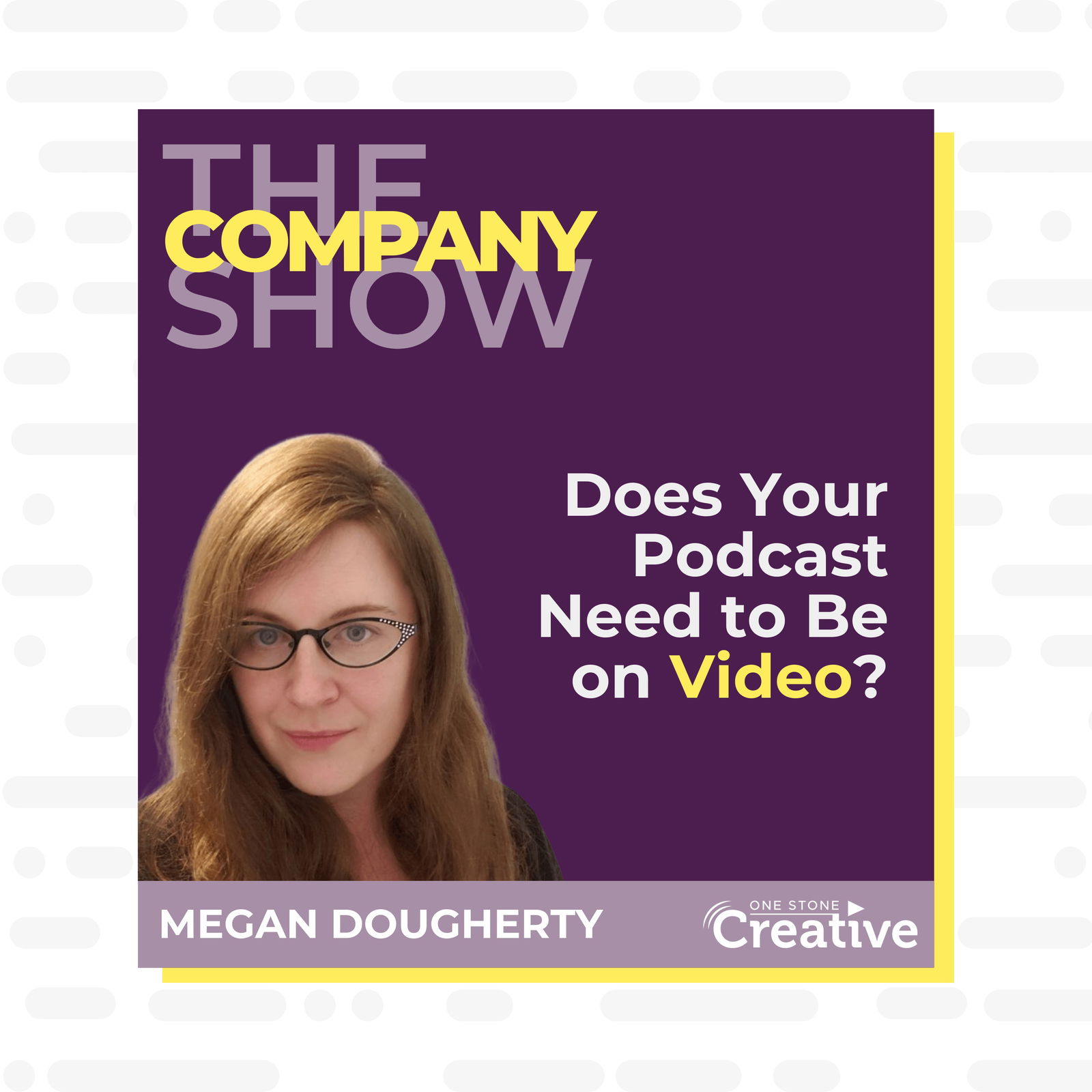
Does Your Podcast Need to Be On Video? with Megan Dougherty
Let me tell you a little story.Back in the halcyon days of 2019, I had a strong belief—I believed that video was video and podcasts were podcasts, and ne'er between should meet.Podcasts certainly did not belong on YouTube. I would have died on that hill.Then, in 2020, I conducted the first State of Business Podcasting Report and learned that the vast majority of the top 100 podcasts had YouTube channels, and most of them put episodes there. Now we make MP4 versions of all the podcasts we produce so they can go on YouTube.When I'm wrong, I'm wrong. It's become one of my best anecdotes, though, so there's a win.I have a whole lot of information for you today about audio vs. video podcasts and how to make that choice for your business. Listen below or continue reading the blog post!Tune in to the full episode to learn about:The current state of video podcastingPros and cons of video podcastsHow to make the choice between audio and videoDon’t forget to join us for our free monthly strategy calls on the third Thursday of every month!Before we get into audio vs. video, here’s an update:I am delighted to be able to report that Podcasting for Business, the book, is currently in editing and set for release later this year.It feels pretty good. This is a project a long time in the making, and I feel confident that we’re looking at podcast value attribution in an entirely new way that will change the game in how you design, produce and track the outcome of your company’s podcast.The official launch date for the book is Tuesday September 10th, and we have some very exciting things planned to celebrate it.We’ll have sample chapters, workshops, abundant bonus resources and privileged access to this year’s Podcasting For Business Conference.We’ll also have an entire behind-the-scenes documentary-style podcast I’ve created with Amy Collette, the book coach I’ve been working with to get this draft from my brain and our content archive. That will be coming out next month—stay tuned!Find out what’s coming and get involved here.I really can’t wait to share it with you. I mean that literally—I can’t.That’s why I’m sharing a part of one section with you today on this episode, all about making the choice between audio-first and video-first shows.Next Week on The Company ShowNext week I’ve got a fascinating conversation with Dr. Brigitte Bojkowszky, the creator of Bridget Brands, who is a company and personal brand identity strategist with over 23 years of experience in teaching global marketing management and branding at universities worldwide.I learned so much from the conversation, and I’m sure you will to, so make sure you’re subscribed on your favorite podcast player to not miss a thing!Need A Podcast?The Company Show was made possible by the team at One Stone Creative.If you know a business owner that you think should have a podcast, do us a favor and send them to podcastingforbusiness.com!Key Quotes“Getting good at making audio is hard and takes time. Adding all of the extra elements of video right at the outset is a lot and is often more than a business really needs.” - Megan DoughertyResourcesOne Stone Creative | LinkedIn | Twitter | Facebook | InstagramMake sure to check out our free Monthly Strategy Calls!Podcasting for Business Conference 2023 RecordingsLearn about what other business podcasters are doing:State of Business Podcasting Report 2023Related:The Video Advantage for SEO with Atiba De SouzaShould Company Podcasts be Company Vlogs? with Chrish WeiherPodcasting for Business on YouTube with Angela HollowellPFBCon 2023 RecordingsWhether you're a solopreneur, manager of a department, principal at a firm, or a non-fiction author ready to expand into audio, the Podcasting for Business Conference will help you leverage a podcast to meet your business objectives.Missed PFBCon 2023? Check out the recordings!
10:0014/06/2024
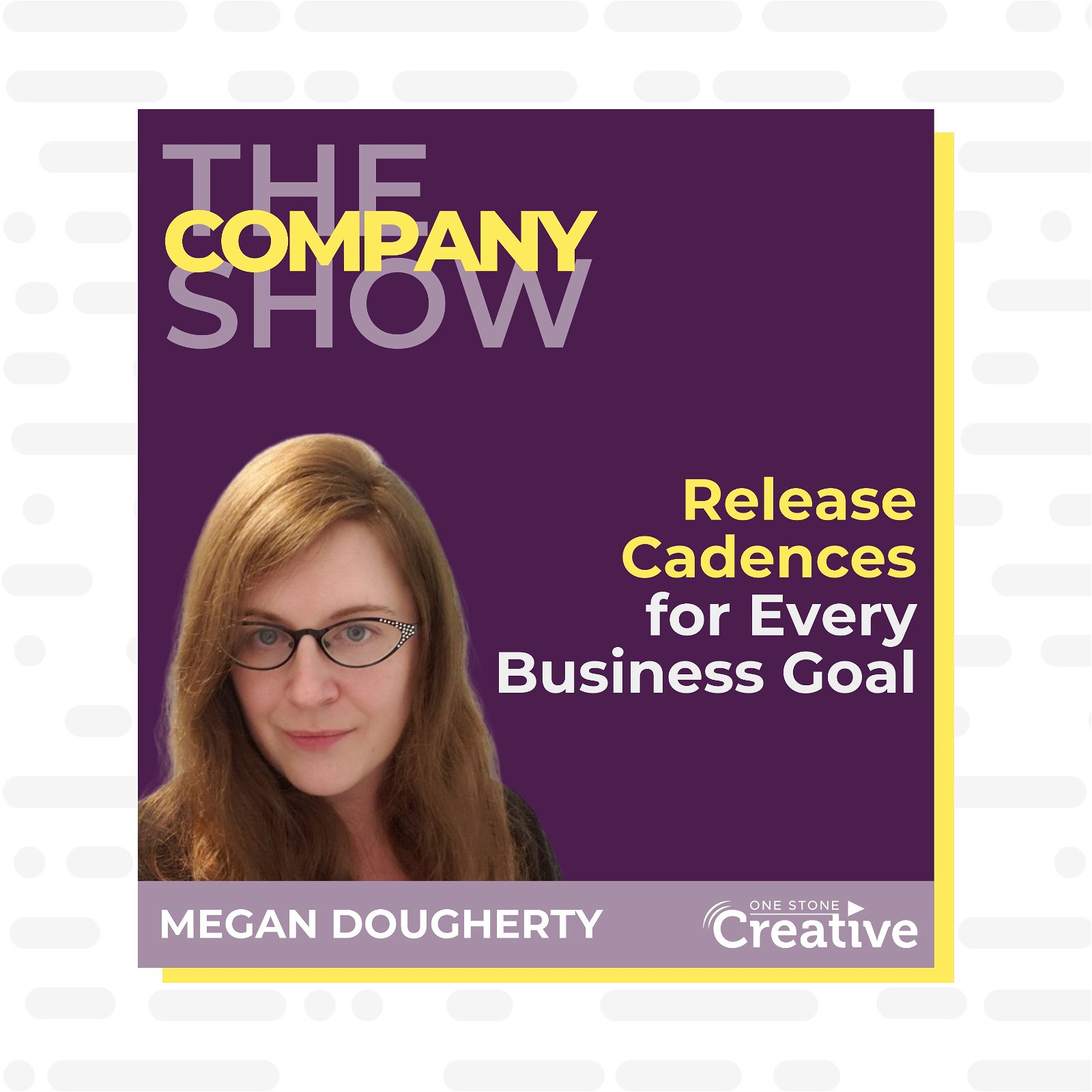
Release Cadences for Every Business Goal with Megan Dougherty
After “should we have a podcast?” one of the first decisions you’re going to have to make is how often you want to release and how long you’re going to podcast for.You’ve got options, and options within options—and it’s an important choice. Once you commit to a release cadence in your podcast, you should stick to it.Tom Fox, The Compliance Evangelist and creator of the Compliance Podcast Network, says, “Your podcast is a promise to your audience,” and he’s absolutely right.If you commit to and communicate that you’re going to start a weekly podcast, you should deliver a weekly podcast. It’s not just because it’s important to do what you say you’re going to do—inconsistent releases or a series of stops and starts just aren’t a great look for most brands.Consistency is professional, and it should be table stakes, which sometimes means not biting off more than you can chew when it comes to your podcast.That is it’s own challenge, because the reality is that more frequent releases means more and faster progress towards key business goals. So you’ve got to find the balance that works best for you, your team, and your business goals.Here is some information that will help you make the choice. Listen to the episode or read the blog post here: https://podcastingforbusiness.com/79Tune in to learn about:Release strategy based on business goalsShould you release in seasons?Types of podcast seasonsSeason topics that you can useDon’t forget to join us for our free monthly strategy calls on the third Thursday of every month!We’ll See You Soon!We’re going to be taking a short hiatus for the next 4 weeks while we work on something very, very exciting—One Stone Creative is writing a book!You can expect all the details, how you can get a sneak peek, maybe a nifty bonus or two (who knows?)We’ll be replaying some great episodes from the archive in the meantime; enjoy, and I’ll be talking to you in a few weeks!Need A Podcast?The Company Show was made possible by the team at One Stone Creative.If you know a business owner that you think should have a podcast, do us a favor and send them to podcastingforbusiness.com!Key Quotes“A season can also be a great way to test the waters of podcasting to see if you like it and if your audience and community are interested in hearing from you in this way.” - Megan DoughertyResourcesOne Stone Creative | LinkedIn | Twitter | Facebook | InstagramMake sure to check out our free Monthly Strategy Calls!Podcasting for Business Conference 2023 RecordingsLearn about what other business podcasters are doing:State of Business Podcasting Report 2023Related:Does Your Podcast Format match Your Podcast Goals?PFBCon 2023 RecordingsWhether you're a solopreneur, manager of a department, principal at a firm, or a non-fiction author ready to expand into audio, the Podcasting for Business Conference will help you leverage a podcast to meet your business objectives.Missed PFBCon 2023? Check out the recordings!
07:3109/05/2024
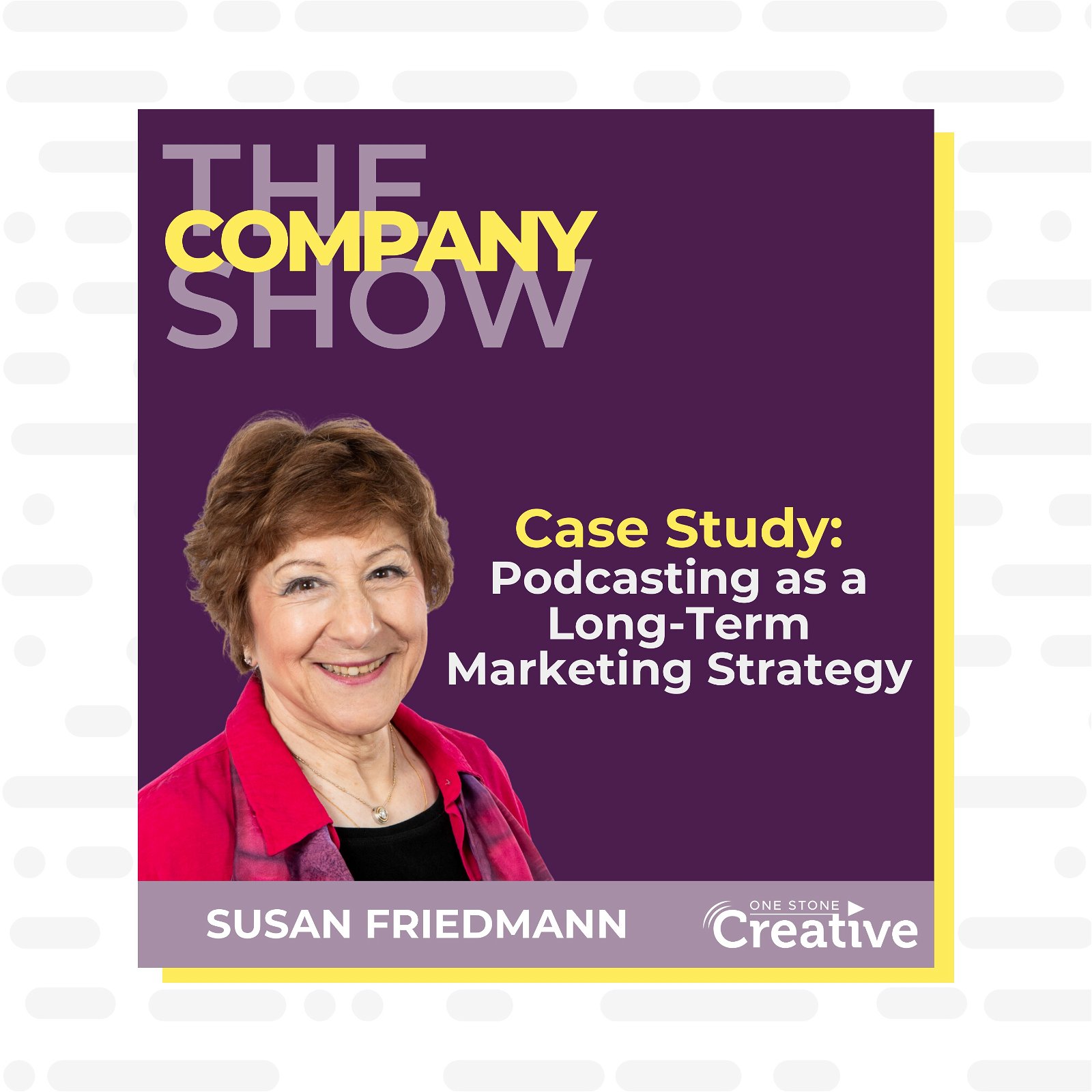
Case Study: Podcasting as a Long-Term Marketing Strategy with Susan Friedmann
How to include the bio of your guest in a podcast episode is a topic of some debate in the industry, and it should really come down, as it always does, to the type of show you're creating and your goals for it, as well as your personal tastes and preferences.I've been known to say that it's best not to have your guests share their own origin story on your podcast so that you can get right to the meat of the content more quickly. As a listener of this show, you'll know that makes me a terrible hypocrite, because I often start interviews by asking the guests to talk about their company and their podcast.I've tried just getting into a conversation, and honestly, for me, I find it a little too awkward and since my main goal of the podcast is building strong relationships, that's really okay. Maybe it's not perfect, but it's much better than fumbling the kickoff every week and feeling weird going into that kind of conversation.But I'm talking to someone today who is awesome at that particular strategy of skipping the intro and getting right into the heart of things immediately. It's one of the things that makes her podcast so dynamic and engaging for her audience. And she's here to give us a deep dive into the podcast that has been a key marketing strategy for her business for the last eight years.Susan Friedmann is the owner of Aviva Publishing and host of the Book Marketing Mentors podcast. In this case study episode, we're going to be digging into how Susan has used her podcast as a marketing and audience engagement strategy for over 400 episodes.Susan was so generous with her knowledge and experience, and this case study is a wonderful example of how a podcast can become a fundamental part of a long-term marketing strategy.Listen to the episode or read the blog post here: https://podcastingforbusiness.com/78Tune in to learn about:The birth and growth of Aviva PublishingPodcasting as a marketing strategyPodcast planning and launchMetrics vs enjoymentSusan Friedmann's podcast production workflowMeasuring podcast successHow to nurture client relationships and leverage resourcesFuture plans for Book Marketing MentorsDon’t forget to join us for our free monthly strategy calls on the third Thursday of every month!Be A Guest on The Company ShowDo you have a podcast that's making a major difference in your business or know one that is? Fill this contact form and let us know about it.We'd love to have you here for a case study episode like this one!Need A Podcast?As always, this is Megan Dougherty, and The Company Show was made possible by the team at One Stone Creative.If you know a business owner that you think should have a podcast, do us a favor and send them to podcastingforbusiness.com!Key Quotes"I usually have a starting question to get us in. I get straight to the chase; this is a 25–30-minute interview, I want to get to something substantive. Maybe I'm wrong here, but I don't do the tell us about yourself and your history. I don't do that because that can take up a bit of time that I would rather use getting down to the subject.” - Susan Friedmann"I find often, speakers, they can be such excellent guests because they know when to stop and it’s a really underrated skill in being either a host or a guest.” - Megan DoughertyResourcesOne Stone Creative | LinkedIn | Twitter | Facebook | InstagramMake sure to check out our free Monthly Strategy Calls!Podcasting for Business Conference 2023 RecordingsLearn about what other business podcasters are doing:State of Business Podcasting Report 2023Susan Friedmann Aviva Publishing | Book Marketing Mentors Podcast | LinkedIn20-Minute Brainstorm with SusanRelated:Case Study: Growing a Media Business Through Podcasting with Rayna RokickiHow to Measure the Impact of Your Podcast with Megan DoughertyPitching and Podcasting for Authors with Angie Trueblood
48:1302/05/2024
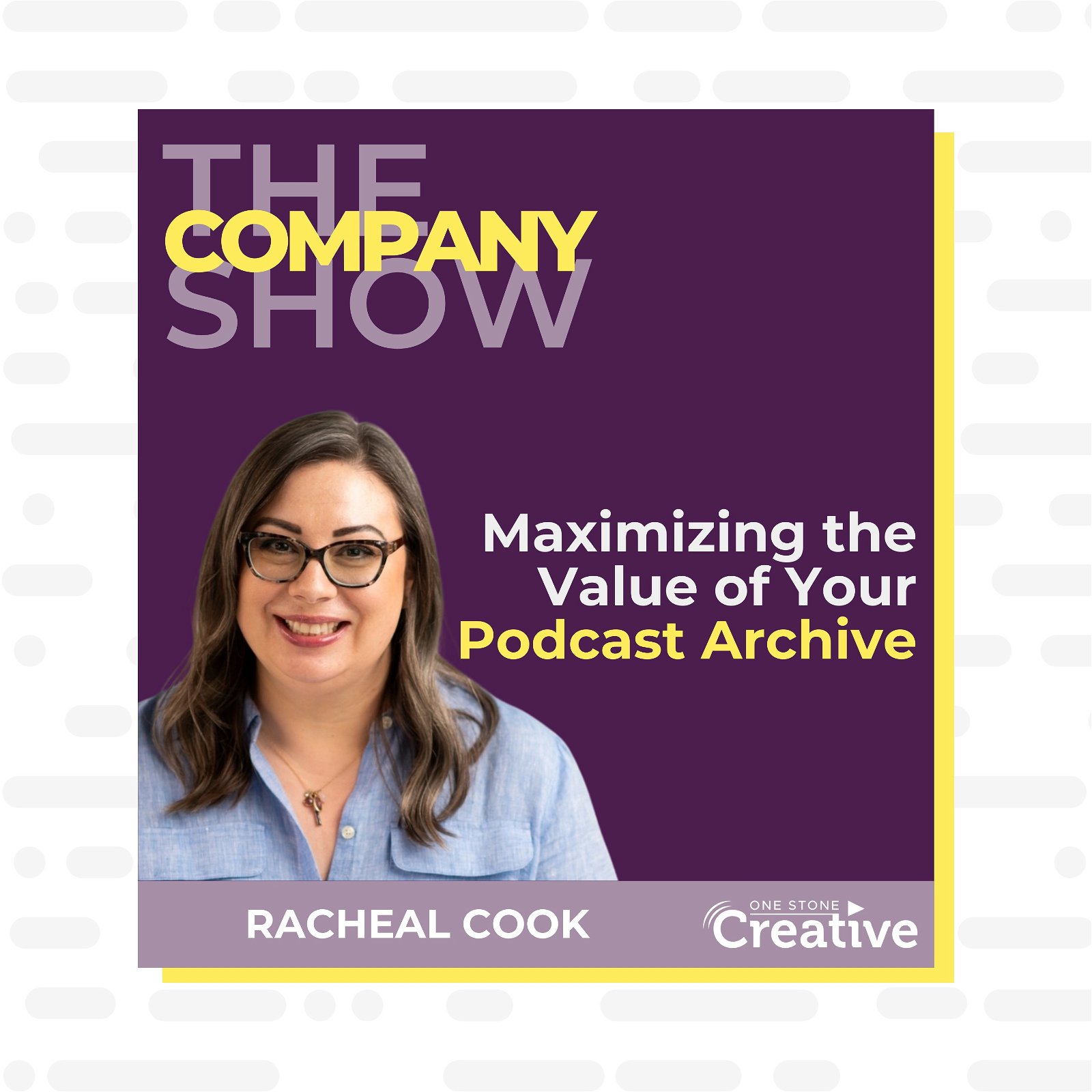
Maximizing the Value of Your Podcast Archive with Racheal Cook
A truly massive content archive will usually cause one of two feelings:Unspeakable delight about the opportunityA sucking dread at the thought of the work involved in repurposing itThe difference between those feelings? Strategy and organization.This episode of The Company Show is all about strategy and organization and how you can use them to make sure your content archive fills you with more joy than terror.My guest this week is past mistress at the art and science of understanding the role that content plays in a customer's buying journey. And her process of content tracking and annual content audits is positively aspirational.Racheal Cook is the founder of The CEO Collective and host of Promote Yourself to CEO and she has helped thousands of women entrepreneurs design predictably profitable businesses without hustle and burnout.We had an amazing conversation that covered a lot of ground. Listen to the episode below or read the blog post: https://podcastingforbusiness.com/77Tune in to the full episode to learn about:effective content strategy and organizationevolving your content and podcastthe power of evergreen contenttreating your podcast as a library of assetscontent management and planningattract listeners through multiple channelsbuilding a nurturing content ecosystemtracking audience engagement and acquisitionDon’t forget to join us for our free monthly strategy calls on the third Thursday of every month!Next Week on The Company ShowNext week, we've got an exciting case study episode coming up with Susan Friedmann, the creator of Aviva Publishing and host of the Book Marketing Mentors podcast.We're going to be digging into her strategy, results, and what she's learned over more than 400 episodes.Need A Podcast?As always, this is Megan Dougherty, and The Company Show was made possible by the team at One Stone Creative.If you know a business owner that you think should have a podcast, do us a favor and send them to podcastingforbusiness.com!Key Quotes“You don't need a massive audience. You just need those loyal people who listen to you every single week and who come back to you again and again.” - Rachel Cook“My job on my podcast is twofold. It's to nurture those people, walk them through this content series where I'm really comprehensive covering a specific topic, but also it's to get them to engage on my website by opting in for something.” - Rachel Cook"A truly massive content archive will usually cause one of two feelings.: one, unspeakable delight about the opportunity, or two, a sucking dread at the thought of the work involved in repurposing it.” - Megan DoughertyResourcesOne Stone Creative | LinkedIn | Twitter | Facebook | InstagramMake sure to check out our free Monthly Strategy Calls!Podcasting for Business Conference 2023 RecordingsLearn about what other business podcasters are doing:State of Business Podcasting Report 2023Racheal Cook Website | Podcast | Instagram | TikTok | LinkedIn | FacebookRelated:Create with Intent to Repurpose with Jaclyn SchiffBringing Order to Chaos in Your Podcast ProcessesHow to Measure the Impact of Your Podcast
43:0425/04/2024
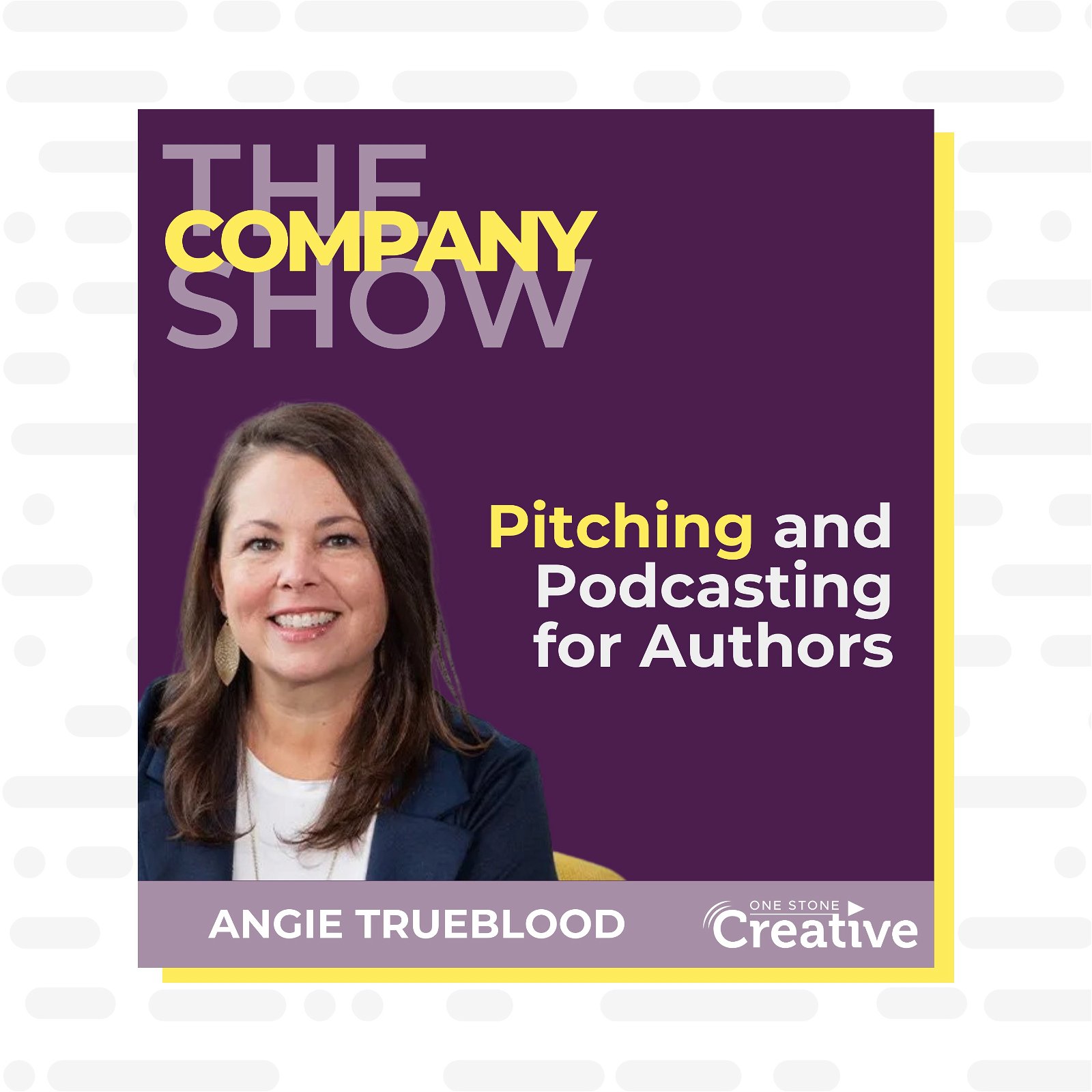
Pitching and Podcasting for Authors with Angie Trueblood
What’s the best way to grow your podcast audience? That is a topic that could be debated hotly by pretty much anyone who works in podcasting. But all would agree that if being a guest on other people’s podcasts isn’t the very best method, it’s high on the list.Pitching well, which is to say, effectively and in a manner that results in guest appearances and new professional relationships is one of those things that is simple but not easy.Simple: Find complementary shows, communicate your value, bring your best content and generally be a helpful and gracious guest.Not easy: How do you pitch, are you good enough, will they listen to you, how much research do you need to do, do you have to promote your episode, how long is this all going to take and what if no one accepts you?Maybe I’m the only one who gets a little in my head about it, but it’s not likely.Angie Trueblood the founder of The Podwize Group is one of my very best friends in the industry, and since our very first interview, we’ve been talking, collaborating, workshopping and generally working together to create ways that different kinds of businesses owners can leverage podcasts and podcast appearances.And through these conversations we’ve come up with really excellent use-cases for different kinds of business owners—most specifically, authors. Turns out we also have in common a love of the written word and the people who create those words as a marketing strategy for their companies.So, enjoy this conversation I had with Angie; there have been some changes in both of our businesses since it was originally released. Check the show notes for the latest links and details but the strategy and practice of pitching is solid.There is so much gold in this conversation that will help you refine your own pitching strategy to get more visibility on your show, your book and your business.If you’re interested in that, listen to the episode or read the blog post: https://podcastingforbusiness.com/76Tune in to the full episode to learn about:Benefits of podcast guesting for authorsPitching for Podcasts vs. Other PublicationsShould you outsource the pitch?Overcoming Pitching AnxietyPitching time and schedulingHow to be a great podcast guestLaunching your book with podcastsDon’t forget to join us for our free monthly strategy calls on the third Thursday of every month!Need A Podcast?As always, this is Megan Dougherty, and The Company Show was made possible by the team at One Stone Creative.If you know a business owner that you think should have a podcast, do us a favor and send them to podcastingforbusiness.com!Key Quotes"I want more than anything else to have a guest who is prepared and takes this opportunity seriously. If they proactively send me information that's going to help negate any weird things happening, perfect. I'm your biggest fan." - Angie Trueblood"The more you do, the more people hear you, and then all of a sudden you're being heard everywhere." - Megan DoughertyResourcesOne Stone Creative | LinkedIn | Twitter | Facebook | InstagramMake sure to check out our free Monthly Strategy Calls!Podcasting for Business Conference 2023 RecordingsLearn about what other business podcasters are doing:State of Business Podcasting Report 2023Angie Trueblood Instagram | LinkedIn | Twitter | The Podwize Group | Go Pitch Yourself PodcastRelated:The Ultimate Guest Pitching System with Kris WardPractice Makes Prepared with Meridith GrundeiA Dance of Guests and Hosts: Optimizing Your Workflows and Relationships with Jason CerconeDon’t Leave Your Guest Guessing
44:5018/04/2024
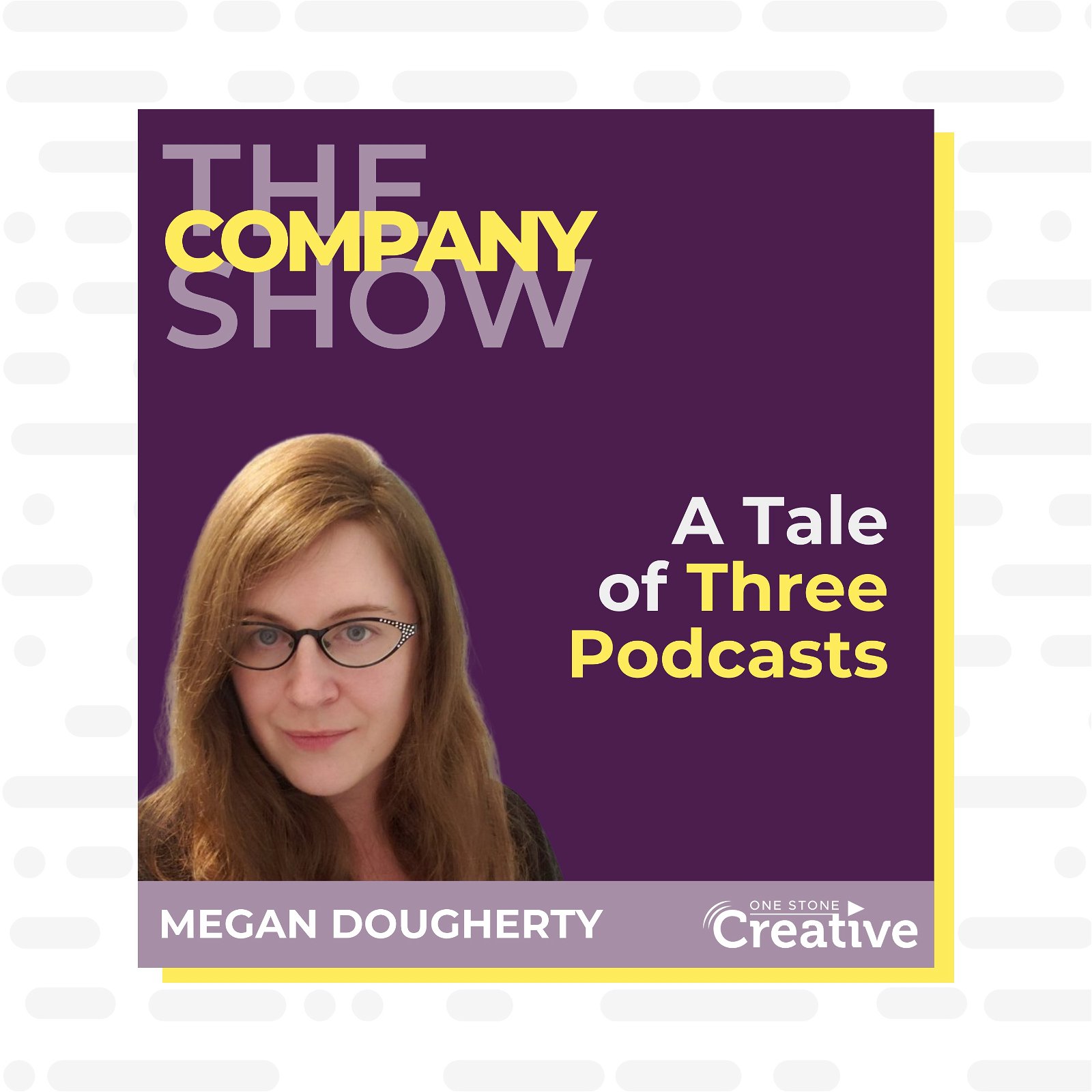
A Tale of Three Podcasts with Megan Dougherty
Podcasts that look very similar from the outside can actually create completely different kinds of value for the businesses running them. Here’s what I mean:Imagine a standard podcast. The podcasty-est podcast you can dream up. You know what I'm talking about: about 40 minutes long, one host interviewing one guest, released every Tuesday. The Ur-Podcast—there are a lot of them.It’s tempting to think they all sound the same. The more cynical among us might say that they do. But they can be serving very different functions for the companies that run them and making a very different impact based on the Blueprint used and the individual metrics optimized for.Let’s take a look at how a ‘bread and butter’ podcast format can be optimized for very different business outcomes. Listen to the episode or read the blog post here: https://podcastingforbusiness.com/75Tune in to the full episode to learn about:How similar podcasts can serve different purposesHow to optimize podcast for different goalsOptimizing workflows, recordings, and post-productionShould you be concerned about competition?Don’t forget to join us for our free monthly strategy calls on the third Thursday of every month!Let’s ConnectI’d love to know your reason for podcasting—and how you’re optimizing for it! Find me on LinkedIn or Instagram.Need A Podcast?The Company Show was made possible by the team at One Stone Creative.If you know a business owner that you think should have a podcast, do us a favor and send them to podcastingforbusiness.com!Key Quotes“No one has ever found a podcast on a topic they are interested in and said: *That’s it! I have found the one and only podcast on this topic I’m going to listen to; I will never seek out or listen to another one—*that doesn’t happen." - Megan DoughertyResourcesOne Stone Creative | LinkedIn | Twitter | Facebook | InstagramMake sure to check out our free Monthly Strategy Calls!Podcasting for Business Conference 2023 RecordingsLearn about what other business podcasters are doing:State of Business Podcasting Report 2023Related:Does Your Podcast Format match Your Podcast Goals?Using LinkedIn to Supercharge your Relationship Building with Sophie LechnerMaximizing your Creative Energy to Serve Your AudienceCreating Impact with Expert Knowledge with Kachina GosselinPodcasting with Purpose with Fatima ZaidiPFBCon 2023 RecordingsWhether you're a solopreneur, manager of a department, principal at a firm, or a non-fiction author ready to expand into audio, the Podcasting for Business Conference will help you leverage a podcast to meet your business objectives.Missed PFBCon 2023? Check out the recordings!
08:2811/04/2024
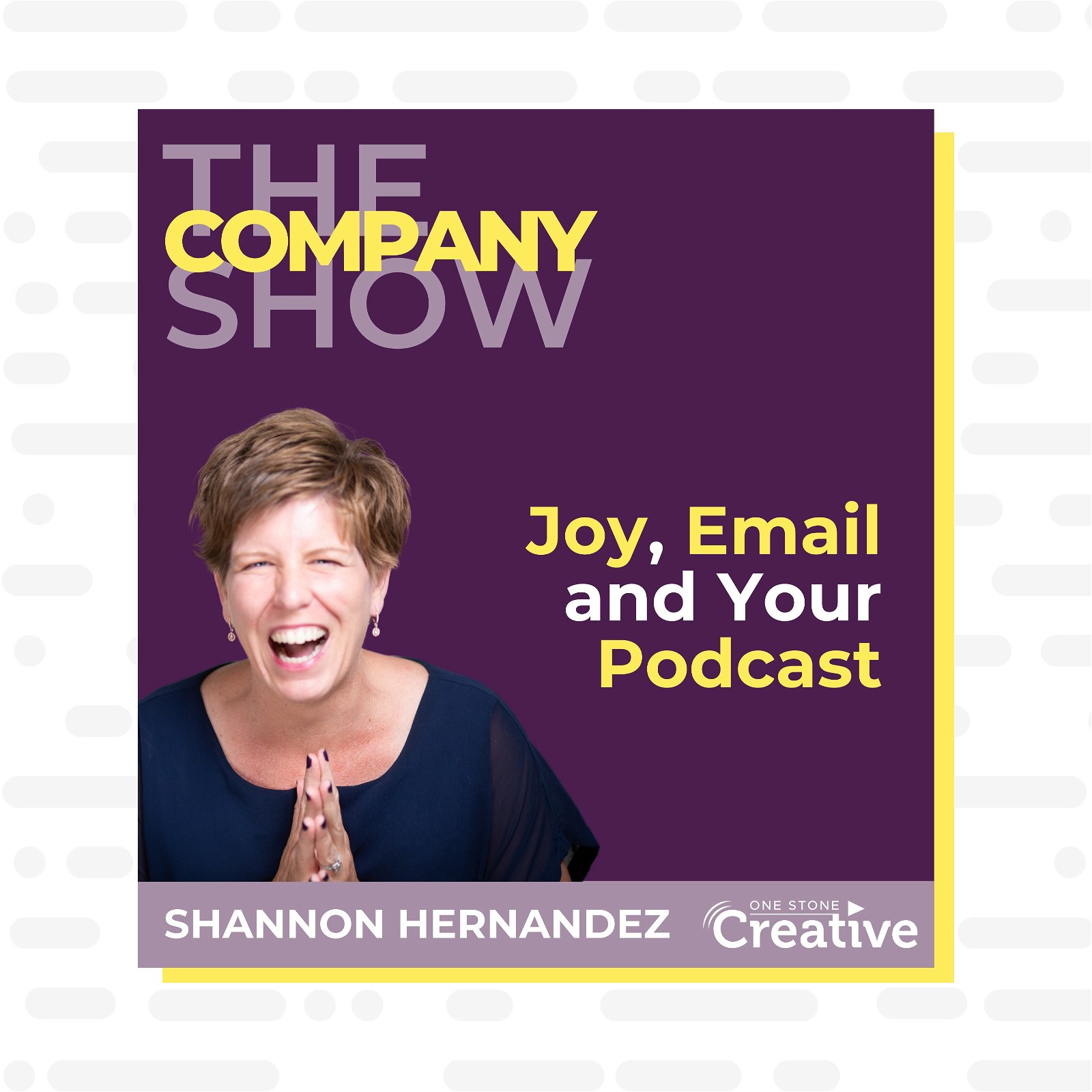
Joy, Email and Your Podcast with Shannon Hernandez
I’m sure you’ve heard of the Pareto principle, or the 80-20 rule where 80% of consequences or results come from 20% of causes—or efforts.On the one hand it’s great because you’re getting huge value out of some of the work you’re doing…. but which part?That’s the rub and trying to answer that question is the work of entire industries and an important activity for business owners and marketing managers evaluating what they and their teams spend time on.It’s one of the reasons we developed the Business Podcast Blueprints - so it would be easier to see what work was creating what results to facilitate strategic decision making. I remember when we first started One Stone Creative, and I was another one of those marketers who just kind of threw up her hands and said: it’s going to work but we don’t exactly know why.It was only through years of experimentation, data collection and analysis that we started to see the patterns that let us codify the Blueprints into tools that could be used proactively to get specific business outcomes and the attendant clarity—from podcasting.Most of us aren’t just podcasting through, we’re blogging, and posting on social media, making videos hosting events, and creating visuals.And there’s an expert I’m really excited to introduce you to who is bringing a wonderful level of rigor and analysis to content marketing more generally, with a special emphasis on the king of all content—the email.My guest today is Shannon Hernandez, the creator of the Joyful Business Revolution.We’re talking about data, we’re talking about working according to your strengths, we’re talking about email the as-of-yet unseated, most profitable form of communication on the internet, and we’re doing it with Shannon’s specialty—absolute joy.If you want to step up your content creation game and learn more about the power of email, listen to the episode or read the blog post: https://podcastingforbusiness.com/TCS074Tune in to the full episode to learn about:The Content Personality QuizCreating content outside your personalityWhy Shannon is shifting to emailPodcasting and email marketingHow to bring joy to the content creation processCold emails and effective engagementHow Shannon used The Business Podcast BlueprintsDon’t forget to join us for our free monthly strategy calls on the third Thursday of every month!Key Quotes"I've asked myself several times over the last couple of years, did I make a mistake in picking joy as the leader of the brand Joyful Business Revolution? Because early on, we attracted a lot of people who were not joyful at all, and what they wanted was joy.” - Shannon Hernandez“If the only way to keep my business going was an email every 2 hours on Facebook, I just burn it to the ground.” - Megan DoughertyResourcesOne Stone Creative | LinkedIn | Twitter | Facebook | InstagramMake sure to check out our free Monthly Strategy Calls!Podcasting for Business Conference 2023 RecordingsLearn about what other business podcasters are doing:State of Business Podcasting Report 2023Shannon Hernandez Website | LinkedInJoyful Content Creation FrameworkContent Personality QuizRelated:Maximizing your Creative Energy to Serve Your Audience
45:0104/04/2024
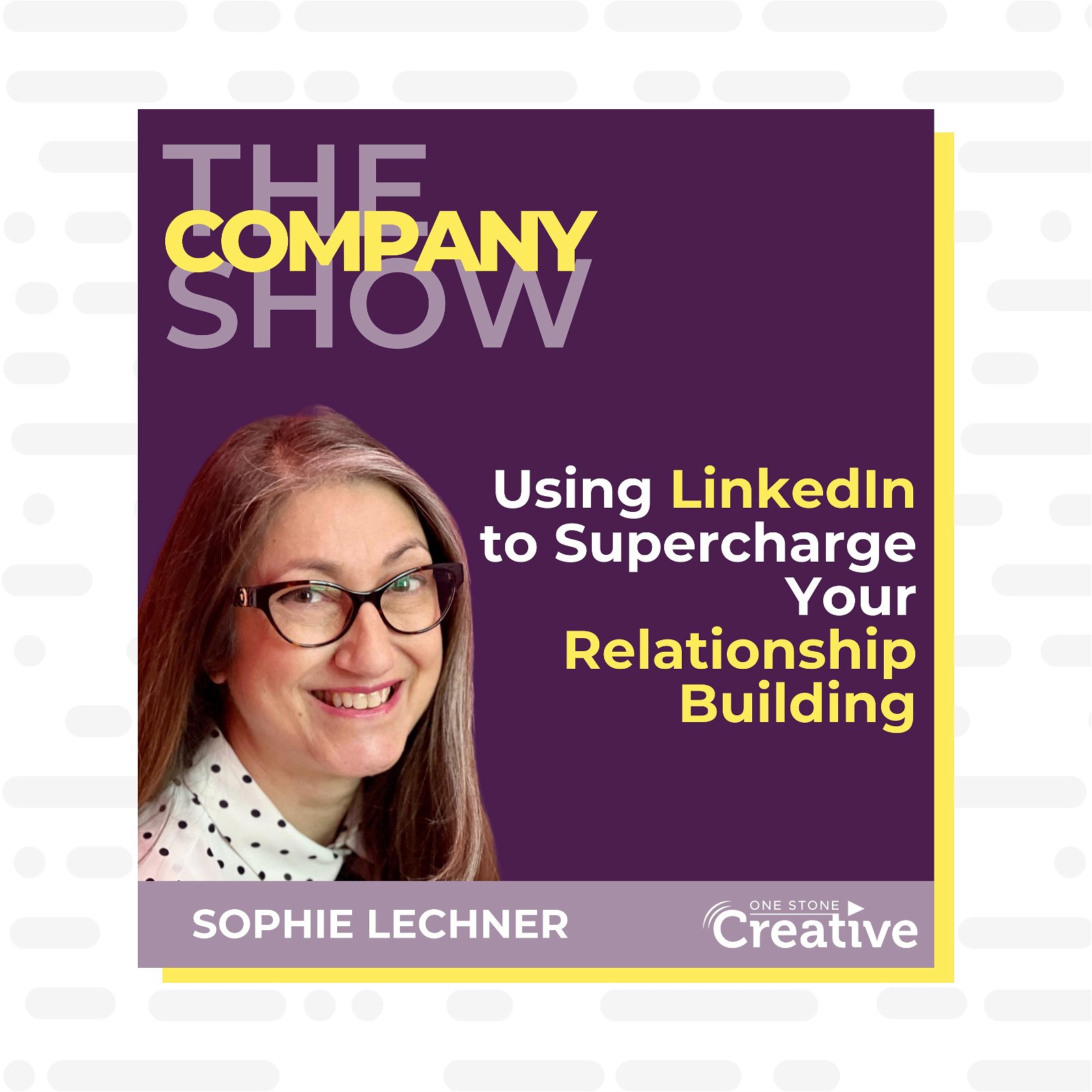
Using LinkedIn to Supercharge your Relationship Building with Sophie Lechner
I have a weakness for walls of text. I really do.See, I love to teach and think and expound and explain, and I do it best in writing. This is, as I have been frequently reminded by my wonderful business partner, rather merciless on the end reader, on websites, in newsletters and emails, and sometimes even on social media.And it's a problem because while the content may be good and fondly like to believe that it is, it's hard to read. This is important everywhere, but it's especially important on social media.And I've never been a huge fan or a super user of it, which means I've never been great at configuring things in the right way to perform the best. But there are so many experts who are so, so good at it, for which I am profoundly grateful because so many of them are so generous with their knowledge.We are talking with one of those experts today, and she's got some strong opinions about the length of content that belongs in LinkedIn, as well as the topics, the relationship building, the role of LinkedIn to business, and how podcasters can take advantage of it.Sophie Lechner is the creator of The Magnet Model, and she helps mission driven entrepreneurs find their audience on LinkedIn and build relationships with them so that they can spread their message and grow their own businesses.If you want strategies that you can use today to improve your LinkedIn game, listen to the episode or read the blog post here: https://podcastingforbusiness.com/73Tune in to the full episode to learn about:The strengths of LinkedIn as a platformHow to make LinkedIn work for podcastersLinkedIn mistakes and best practicesThe ideal LinkedIn post from Sophie LechnerRelationship building with podcast hosts and guestsDon’t forget to join us for our free monthly strategy calls on the third Thursday of every month!Key Quotes"In this day and age, if we want a book, we'll go get a book. You're serving yourself, right? You want people to read it, so make it so the text will just jump into their brain without having to make any effort." - Sophie LechnerResourcesOne Stone Creative | LinkedIn | Twitter | Facebook | InstagramMake sure to check out our free Monthly Strategy Calls!Podcasting for Business Conference 2023 RecordingsLearn about what other business podcasters are doing:State of Business Podcasting Report 2023Sophie Lechner Website | LinkedInCreate headlines here!Related:Learning From ExpertsMastering Facebook Ads for Podcast & Business Growth with Stacy ReedA Dance of Guests and Hosts: Optimizing Your Workflows and Relationships with Jason CerconePFBCon 2023 RecordingsWhether you're a solopreneur, manager of a department, principal at a firm, or a non-fiction author ready to expand into audio, the Podcasting for Business Conference will help you leverage a podcast to meet your business objectives.Missed PFBCon 2023? Check out the recordings!
34:5428/03/2024
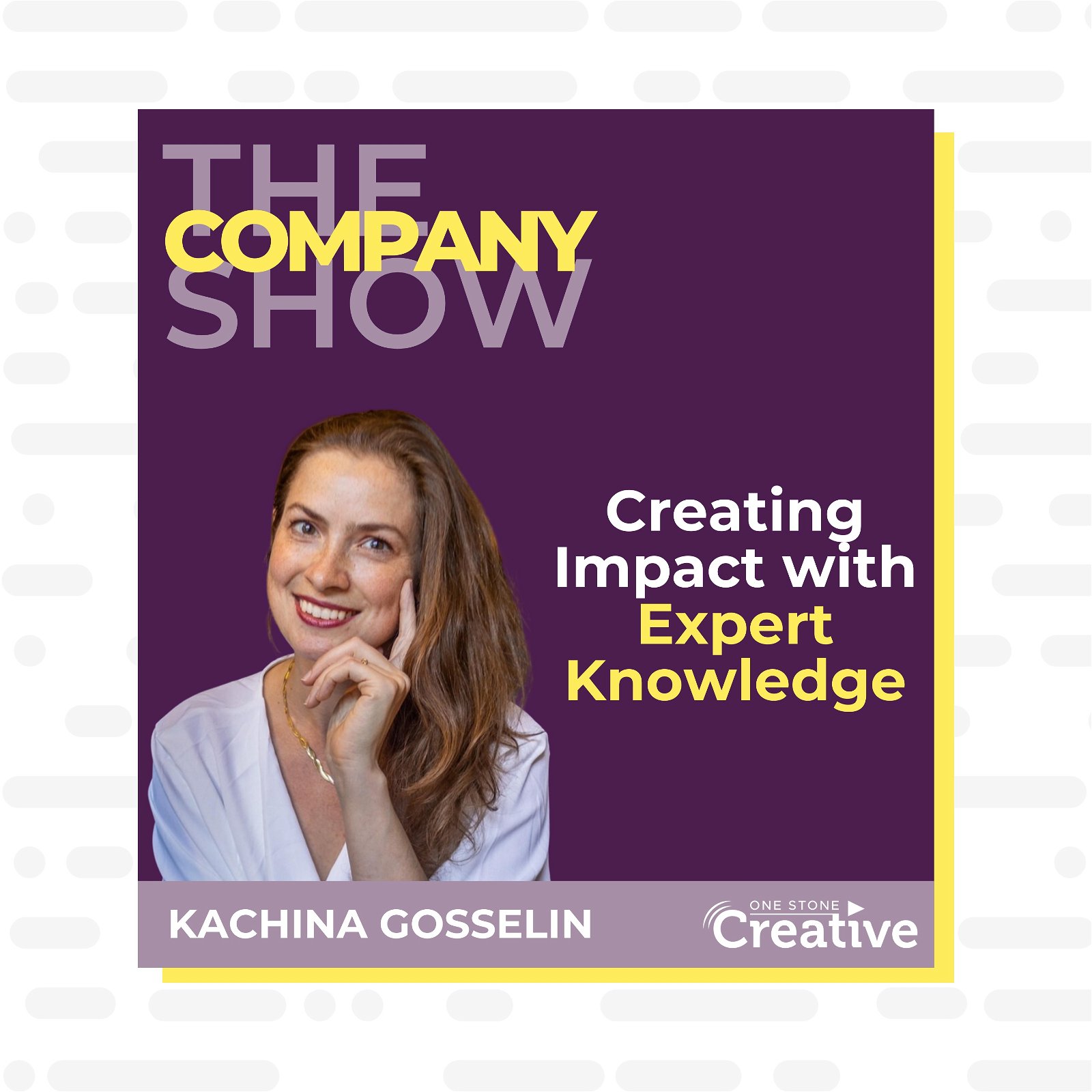
Creating Impact with Expert Knowledge with Kachina Gosselin
Stop me if you've heard this one: I want to develop a passive income stream. You've heard it; you might have thought of it—I definitely have.But I've also been in the Internet marketing industry long enough to know that while evergreen, scalable monthly recurring revenue is possible and can over time be largely automated, passive is at best an exaggeration of the work involved in keeping that kind of machine turning—and at worst a damn dirty lie to sell you a quick fix.When people think of passive income or, more realistically, scalable evergreen product-based income, courses are usually at the top of the list. Creating a course is treated like getting your very own golden goose that's going to lay profit eggs for you every single month.The thing is, it can work and be an amazing way to scale your business, serve more people, and make a bigger impact in the world. But it is not a fit for every business, and it is not a fit for every stage of every business.My guest today understands that and has built the criteria for success with courses into every level of her own company. And she has some very interesting thoughts on how podcasts and scalable products like courses and group training programs can work together.Kachina Gosselin is the founder of Founders Path. She graduated from MIT with a degree in aeronautics and astronautics and now specializes in helping experts monetize their expertise and thrive in the creator economy.If you want to leverage your expertise and generate more impact, listen to the episode or read the blog post: podcastingforbusiness.com/the-company-show/ Tune in to the full episode to learn about:How experts can turn into course creatorsThe importance of pricingWhen should you create your own course?The related costs and investmentsThe quality standards that you must meetThe intersections of podcasting and coursesDon’t forget to join us for our free monthly strategy calls on the third Thursday of every month!Monthly Strategy & Networking CallsThis episode was originally a live Strategy and Networking call which we hold on the third Thursday of every month.There was actually another 30 minutes of amazing discussion and Q and A with Kachina about how these ideas can be applied in different contexts and creating community - if you want to hear it, register for the calls, and you’ll have access to the recording.Each one has a training and learning portion, followed by Q and A, hotseats for whatever you’re working on with your podcast, and a chance to network with other podcasters, industry professionals - they’re so much fun, and I’d love to see you there.Learn more and register for free at PodcastingforBusiness.com/StrategyCalls.Need A Podcast?As always, this is Megan Dougherty, and The Company Show was made possible by the team at One Stone Creative.If you know a business owner that you think should have a podcast, do us a favor and send them to podcastingforbusiness.com!Key Quotes"I don't want to be intimidating at all, but I think we do just have to acknowledge those harsh realities, that a course is a really advanced product to sell." - Kachina Gosselin"The standard for what is expected for an audiovisual product. It's getting higher every year—here are fewer and fewer excuses." - Megan Dougherty"Simple is not easy." - Kachina GosselinResourcesOne Stone Creative | LinkedIn | Twitter | Facebook | InstagramMake sure to check out our free Monthly Strategy Calls!Podcasting for Business Conference 2023 RecordingsLearn about what other business podcasters are doing:State of Business Podcasting Report 2023Kachina Gosselin Website | Instagram | LinkedInJoin her Mastermind ProgramSophie Lechner Website | LinkedInRelated:Should You Make an Online Course?How to Outline a Podcast, Book or Course in an AfternoonLearning From Experts
36:1321/03/2024
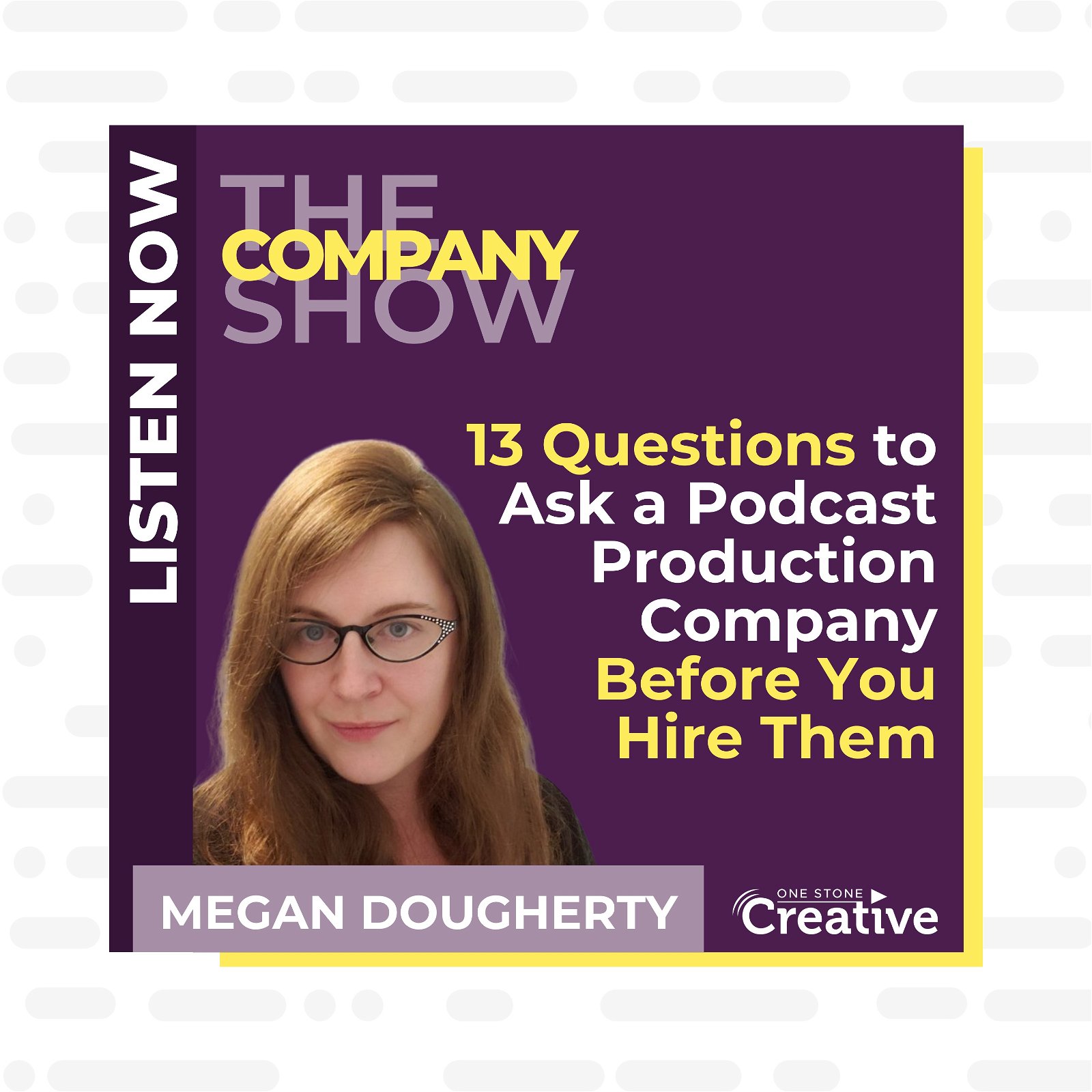
13 Questions to Ask a Podcast Production Company Before You Hire Them
Unless you’re overburdened with free time and a desire to learn a variety of new, highly specific skills or have a team member with the time, interest, and aptitude, starting a podcast for your company usually means hiring a third-party service provider.You’ve got a lot of options for what that relationship can look like. There are solo providers like editors and promoters, podcast coaches and consultants, full-service production agencies, training companies, niche-specific agencies, and recording studios with in-house production—all with their own spectrum of price, quality, and capacity.As you know, hiring a third-party provider can be such a thing. When hiring for a podcast, it’s also fairly high-risk; your show needs to reflect well on your company and help you achieve important goals, and the provider you choose to work with needs to be reliable and produce high-quality work.When you work with a great one, then creating your podcast is going to be a really pleasant part of your workflow. You’ll get to focus on creating interesting and valuable content and won’t have to do much else while the benefits to your business stack up. But when you end up with a less than satisfactory one, it will be one heck of an expensive nightmare and time-suck.Today, we’re talking about what information you should gather from the different providers you talk to when you’re exploring hiring help for your company’s podcast.Listen to the episode or head on to https://podcastingforbusiness.com/71 and read the blog post!Tune in to learn about:Considerations for hiring a third-party podcast production service.Questions to ask potential providers including success metrics, contract terms, ownership of episodes, handover points in the process, and support provided.Understanding the provider's workflow, turnaround time, and use of AI.Importance of trust and clear communication with the chosen provider.Don’t forget to join us for our free monthly strategy calls on the third Thursday of every month!Before we start…We published a version of this back in 2022 in our very first podcast season, and a lot has changed since then—the podcasting industry has exploded.There are so many different kinds of providers and different technologies available to help or hurt your show, and generally, there's just a lot more noise you’ve got to cut through in order to make a great decision for your organization.So, when you’re ready to take the plunge, or less happily, if you took the plunge and sank, then you should probably plan to talk to at least a couple of different providers; the types of services and prices for production can vary really widely.If you have friends or colleagues who podcast, asking for recommendations is a fantastic way to get your starter list, and if you don't know anyone, join literally any podcast group on Facebook, post that you're looking for an editor, and be prepared to receive dozens and dozens of messages from people wanting to sell their services.You will almost certainly find a decent fit within that horde of eager humans. (And you’re warmly invited to talk to us too!) Once you’ve got your discovery calls booked, here’s what you should ask:1. What does a successful podcast look like for your company?2. Do you need a contract? What are your terms?3. Who owns the life of an episode?4. What are the handover points in the process, and where and how are information and content shared?5. Is there any kind of coaching, feedback, or strategic help provided?6. What is your turnaround from raw audio to finished episode?7. Is your company utilizing AI? If so, how?8. What assets do you provide?9. Who is providing the service, and who are your points of contact?10. If you're starting a new show, what is included in a launch? Follow-up: How long does the podcast launch take?11. What type of editing does the firm do?12. How long do their clients keep podcasting?13. What do you do when there are problems?Key Quotes"When you work with a really great producer, production company or other kind of provider, then creating your podcast can be a really pleasant part of your workflow." - Megan Dougherty"What does a successful podcast look like for your company? As a producer, this is one of my favorite questions to be asked because it means that someone is thinking seriously about how to evaluate the podcast as a marketing channel." - Megan DoughertyResourcesOne Stone Creative | LinkedIn | Twitter | Facebook | InstagramMake sure to check out our free Monthly Strategy Calls!Podcasting for Business Conference 2023 RecordingsLearn about what other business podcasters are doing:State of Business Podcasting Report 2023Related:Achieving Business Goals with Podcast Managers with Ted CraggShould You Book a Podcast Studio? with JP DavidsonWorking with VAs for Your Podcast with Kristy YoderPFBCon 2023 RecordingsWhether you're a solopreneur, manager of a department, principal at a firm, or a non-fiction author ready to expand into audio, the Podcasting for Business Conference will help you leverage a podcast to meet your business objectives.Missed PFBCon 2023? Check out the recordings!
17:5214/03/2024
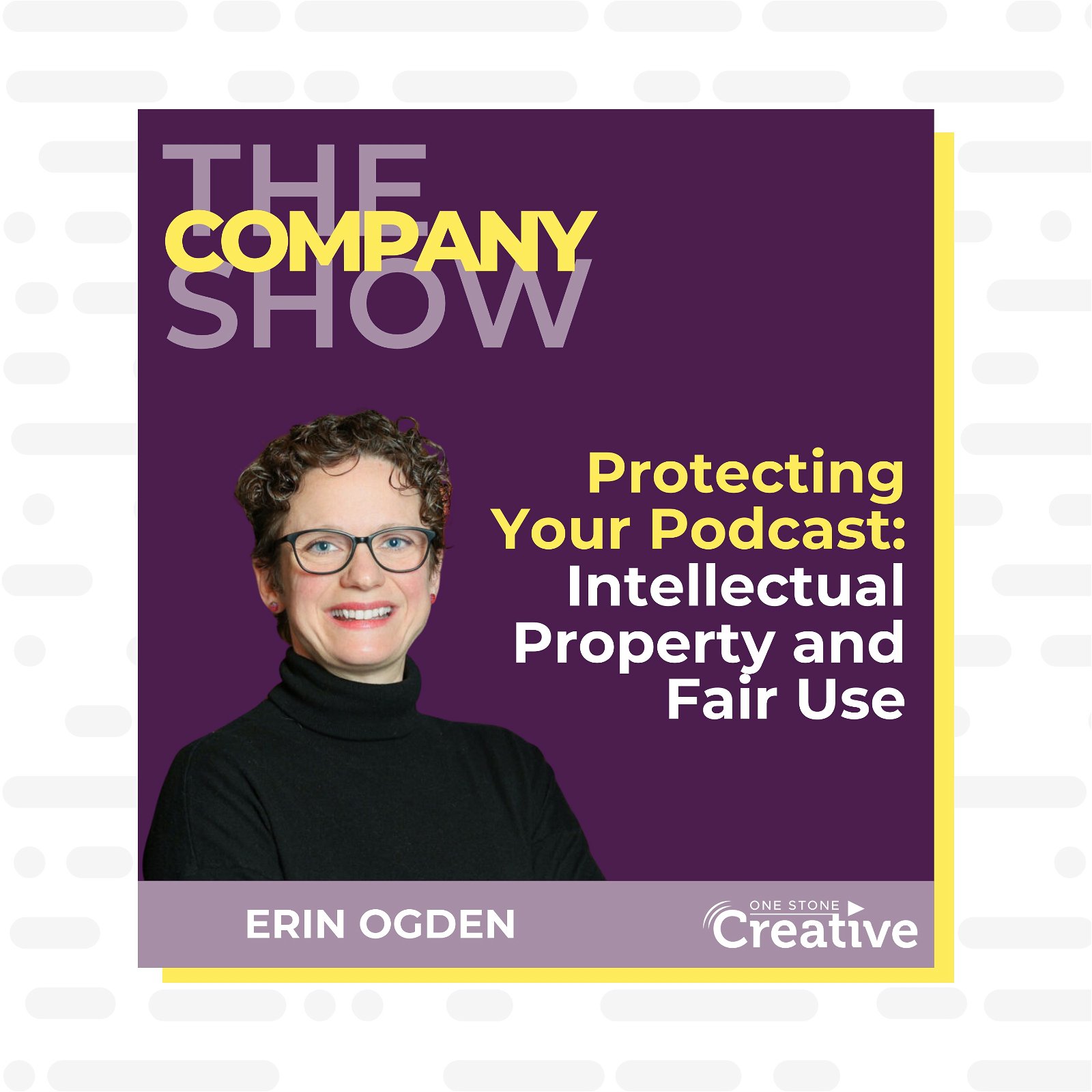
Protecting Your Podcast: Intellectual Property and Fair Use with Erin Ogden
There's a persistent myth in the podcasting world that you can use a little bit of someone else's content without facing any potential legal consequences whatsoever. Maybe 45 seconds of a really popular song or a clip from a TV show that perfectly demonstrates what you're talking about. It's not true.There are protections for other people's content in place, just like there are for yours. And of course, that doesn't mean that you can never use other people's content. It just has to be transformative, which is a whole other kettle of fish on its own, and altogether, it's really a complicated issue filled with nuance and can potentially be pretty high stakes.While figuring out all of this copyright, fair use, and intellectual property stuff alone is totally possible…Most of the information is available out there on the Internet, on government websites, and in books, and it's especially accessible if you have some experience with legal terminology. But that can be time-consuming, and honestly, who has a whole week to become an armchair intellectual property expert when you've got the new Stephen King sitting on your coffee table waiting to be enjoyed?No, it's better to get information straight from a reliable source, and on this episode, we've got a bona fide trademark and copyright nerd joining us to shed a little light on the subject.Erin Ogden is an attorney at the law firm Ogden Glazer + Schaefer. Whether she's helping clients directly or working with other attorneys to help their clients, she helps identify, protect, and monetize intellectual property while looking at the business holistically, which is exactly what we're looking for today.So if you're ready for a lot of extremely valuable information critical to the long term success of your company's podcast, listen to the episode or read the blog post: https://podcastingforbusiness.com/69Tune in to the full episode to get answers to these questions:What is fair use?Do I need a trademark? When should I apply for one?What if somebody steals my content?Should I make my guests sign a release form?Can I create my own agreements? Or do I need a lawyer to do it for me?Don’t forget to join us for our free monthly strategy calls on the third Thursday of every month!Key Quotes“If you think it's transformative, assume you need to talk to a lawyer to make sure, because you are not going to be able to make that determination.” - Erin Ogden“If in doubt, get permission or don't do it.” - Megan DoughertyResourcesOne Stone Creative | LinkedIn | Twitter | Facebook | InstagramMake sure to check out our free Monthly Strategy Calls!Podcasting for Business Conference 2023 RecordingsLearn about what other business podcasters are doing:State of Business Podcasting Report 2023Erin Ogden Visit The Ogden Glazer + Schaefer Website | Read the BlogStacy Reed Website | Instagram | Twitter | Facebook | LinkedIn | YouTubePFBCon 2023 RecordingsWhether you're a solopreneur, manager of a department, principal at a firm, or a non-fiction author ready to expand into audio, the Podcasting for Business Conference will help you leverage a podcast to meet your business objectives.Missed PFBCon 2023? Check out the recordings!
28:5607/03/2024
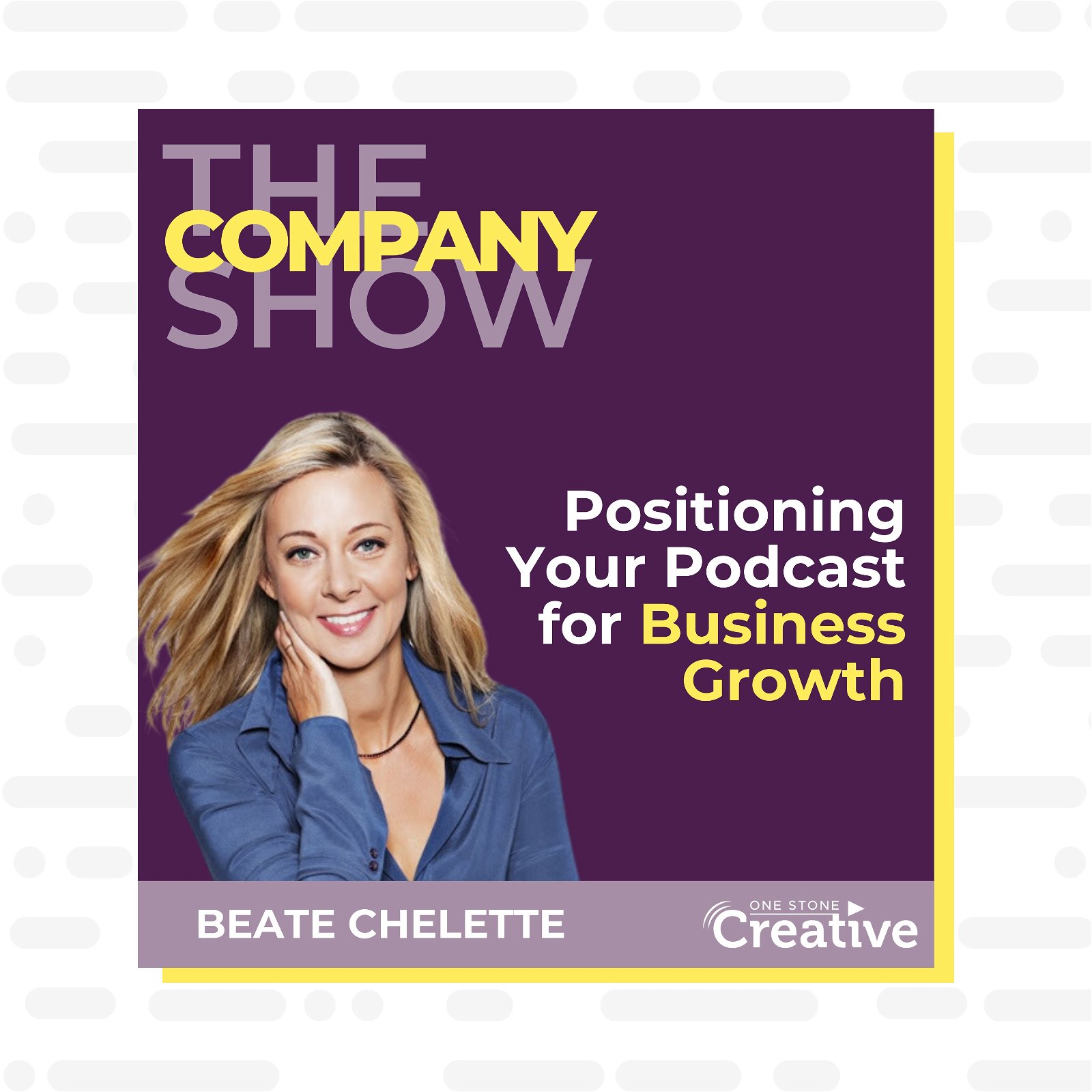
Positioning Your Podcast for Business Growth with Beate Chelette
Aligning your podcast with your business goals is crucial for success, which means you need to set clear podcast goals, choose the right format to achieve those goals, and understand industry best practices.Today I have the pleasure of sharing with you a conversation that I had with Beate Chelette, the Growth Architect. She's a business strategist and podcast host who provides visionaries and leaders with strategies to grow their authority so they can scale their impact.Beate and I are talking about changes in the entrepreneurial landscape, having a good understanding of what's going on in your industry and making decisions accordingly, and a good deep dive into the good, the bad, and the terribly ugly of different podcast strategies that we have run across over the years of being in this industry.So we're operating from the same foundation: podcasts can be leveraged within a business in a way that serves the business itself, listeners, and everyone else involved with the project. But we approached many things in somewhat different ways.This was a conversation I learned a lot from, and I think you will too.Tune in to the full episode to learn about:The importance of aligning podcast with business strategyUsing podcasting to build authority and relationshipsFocusing on quality guests and professional production standardsStrategic guest selection and promotionThe long-term nature of podcasting for branding and lead generationPatience and consistency in building audience and reputationDon’t forget to join us for our free monthly strategy calls on the third Thursday of every month!Key Quotes"All you need is one person a year who hears something, who becomes a good client, and everything's paid for.” - Beate Chelette“Who cares if the downloads are small? Most of the shows we produce, we don't even look at the downloads.” - Megan DoughertyResourcesOne Stone Creative | LinkedIn | Twitter | Facebook | InstagramMake sure to check out our free Monthly Strategy Calls!Podcasting for Business Conference 2023 RecordingsLearn about what other business podcasters are doing:State of Business Podcasting Report 2023Beate Chelette Website | Instagram | LinkedIn | Facebook | TwitterListen to her podcast: Business Growth Architect ShowTake the quiz! What's Your Talent Worth?Angie Trueblood Instagram | LinkedIn | Twitter | The Podwize Group | Go Pitch Yourself PodcastRelated:Does Your Podcast Format Match Your Podcast Goals?Case Study: Growing a Media Business Through Podcasting with Rayna RokickiHow to Measure the Impact of Your PodcastPFBCon 2023 RecordingsWhether you're a solopreneur, manager of a department, principal at a firm, or a non-fiction author ready to expand into audio, the Podcasting for Business Conference will help you leverage a podcast to meet your business objectives.Missed PFBCon 2023? Check out the recordings!
37:4029/02/2024
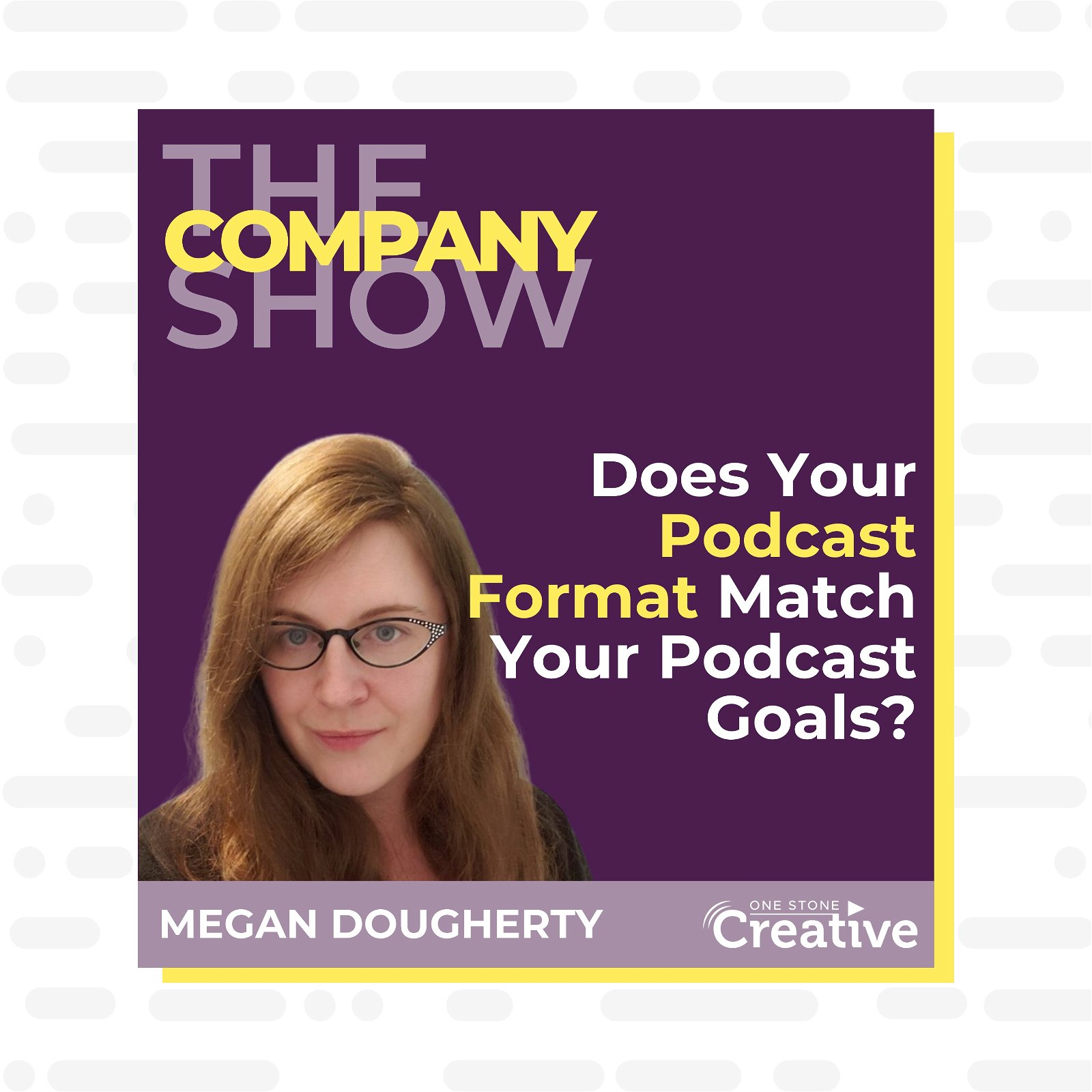
Does Your Podcast Format Match Your Podcast Goals?
Podcasts can come in a lot of different shapes and sizes, and one of the first decisions you need to make as a podcaster is what type of show you want to create.This is one of the biggest early stumbling blocks company podcasters can run into, and the consequences of making the wrong choice can be severe when it comes to actually getting any value out of the project.Often, when people think "podcast", they think: "interview," but it's not that clear cut, and selecting the wrong format for your business goals can mean you invest a huge amount of time and resources in something that will be… sort of okay, but maybe not that great. Depending on which of the Blueprints you're using, and which specific success metrics matter the most to you, not to mention your specific needs around time and budgetary investment, there are styles of show that make more or less sense for your business.The most important consideration is how well a specific format helps you meet your overarching, and specific podcasting goals.Creating a show with the wrong format for your goals means you are putting yourself at an immediate disadvantage when it comes to making progress toward your business objectives, and it’s all too common for businesses to put tons of effort into a podcast - and make amazing content- but not see the kind of bottom-line impact they need to justify the work.We're going to talk about Interviews, Solo episodes, Co-hosted conversations, Panel Discussions, Demonstrative Shows, Documentary style, Clip Shows, and Lives. There are other formats of course, like narrative, fiction, news, and more – but these are the ones most likely to find a place in podcasts that exist AS businesses, or are passion projects. We’re always balancing the desire to create with the needs of a business, and while quality is always critical, efficiency matters too!Tune in to the full episode to learn about:The different podcast episode formatsand when to use them for different business objectivesDon’t forget to join us for our free monthly strategy calls on the third Thursday of every month!Key Quotes"Creating a show with the wrong format for your goals means you are putting yourself at an immediate disadvantage when it comes to making progress towards your business objectives." -Megan DoughertyNext Week on The Company ShowNext week we’ve got a fantastic conversation with Beate Chelette, a business growth architect who is joining me to talk about how and why you should perform research for your show, different ways to leverage one within your business, and some very bad podcasting behavior we do NOT want to see anymore.We agreed on a lot of things - and also had some different ways of looking at certain strategies, which made for an amazing conversation. Here’s a quick preview, and otherwise, can’t wait to catch you next time!ResourcesOne Stone Creative | LinkedIn | Twitter | Facebook | InstagramMake sure to check out our free Monthly Strategy Calls!Podcasting for Business Conference 2023 RecordingsLearn about what other business podcasters are doingState of Business Podcasting Report 2023Related:An Exhaustive List of Different Podcast Episode Formats – and When To Use ThemHow to Choose your Podcast Content (And Format, and Assets and Marketing)PFBCon 2023 RecordingsWhether you're a solopreneur, manager of a department, principal at a firm, or a non-fiction author ready to expand into audio, the Podcasting for Business Conference will help you leverage a podcast to meet your business objectives.Missed PFBCon 2023? Check out the recordings!
27:4322/02/2024
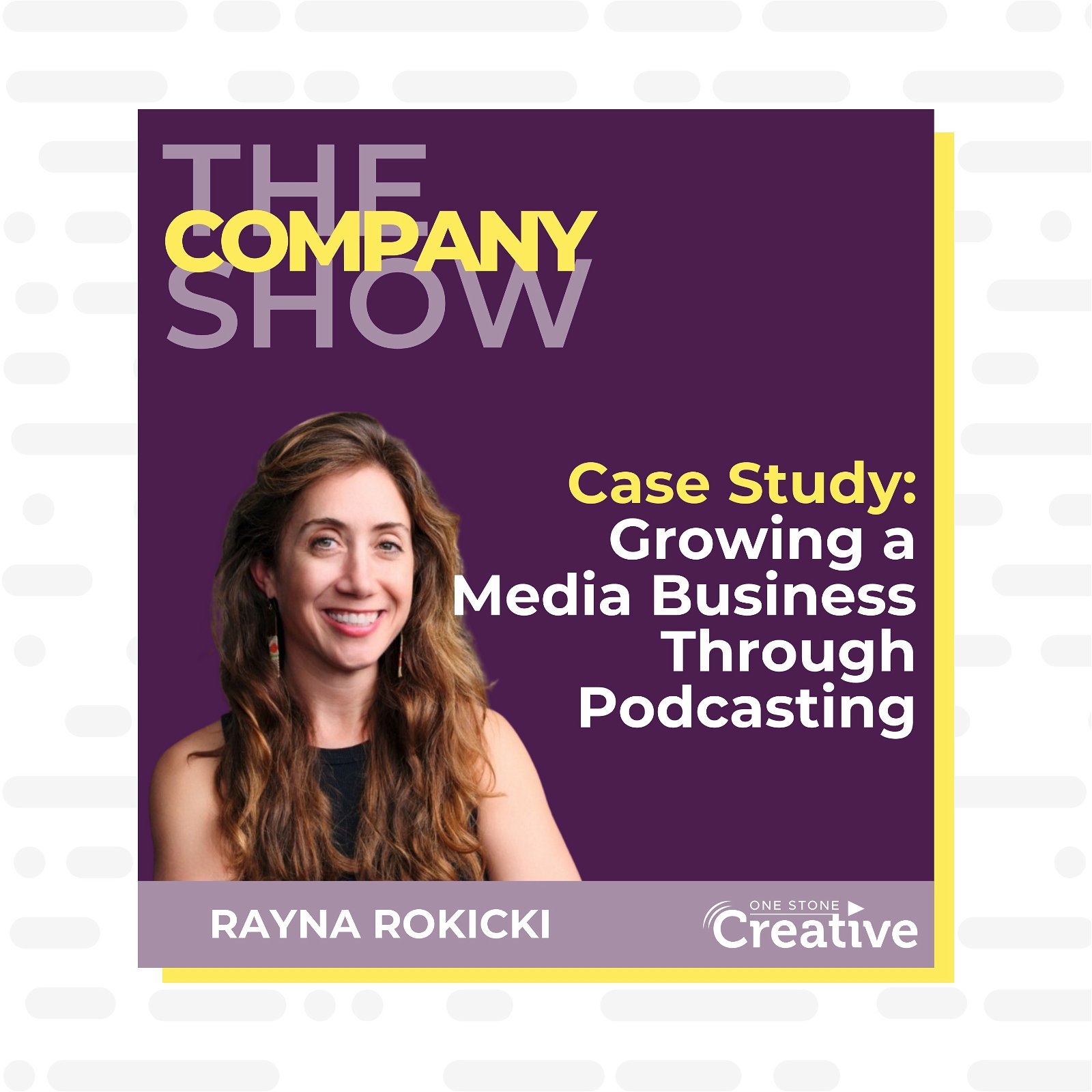
Case Study: Growing a Media Business Through Podcasting with Rayna Rokicki
On this episode of The Company Show, we’re taking a look at how Rayna Rokicki, the owner of Ladies First Digital Media and the host of the You Betcha She Did! podcast, uses a relationship-building guest strategy perfectly to grow her show and her business.Relationship-building is one of the most popular and effective podcast goals for companies. This helps them create and nurture the connections they need for different kinds of business growth, from new leads, to educating and serving existing customers, to referral partners, to potential collaboration partners, and dare I say, maybe even new friends too.Rayna created a great show and strategically uses it to grow her media business by connecting with potential clients, refining and experimenting with formats to use within the business, and creating awareness of the many amazing women in her area, herself included.It is a fantastic conversation and you're really going to enjoy it.Tune in to the full episode to learn about:Rayna’s team templates and workflowGoal setting and pivotingTech tools and social media strategiesHow all of these helped Rayna achieve her long-term objectivesDon’t forget to join us for our free monthly strategy calls on the third Thursday of every month!Key Quotes"I've definitely learned that you need to throw out perfection, and I tell it to my clients all the time. If you want perfect, this is not the right space for you. You just have to get started, you have to dive in, and you got to learn along the way." - Rayna Rokicki"Just start. Don't get stuck." - Rayna RokickiResourcesOne Stone Creative | LinkedIn | Twitter | Facebook | InstagramMake sure to check out our free Monthly Strategy Calls!Podcasting for Business Conference 2023 RecordingsLearn about what other business podcasters are doing:State of Business Podcasting Report 2023Rayna Rokicki Website | Instagram | LinkedIn | You Betcha She Did!Related:The Ultimate Guest Pitching System with Kris WardA Dance of Guests and Hosts: Optimizing Your Workflows and Relationships with Jason CerconeFinding and Inviting Guests to Your PodcastDon’t Leave Your Guest GuessingWhy Don’t Podcast Guests Share Their Episodes?PFBCon 2023 RecordingsWhether you're a solopreneur, manager of a department, principal at a firm, or a non-fiction author ready to expand into audio, the Podcasting for Business Conference will help you leverage a podcast to meet your business objectives.Missed PFBCon 2023? Check out the recordings!
39:2515/02/2024
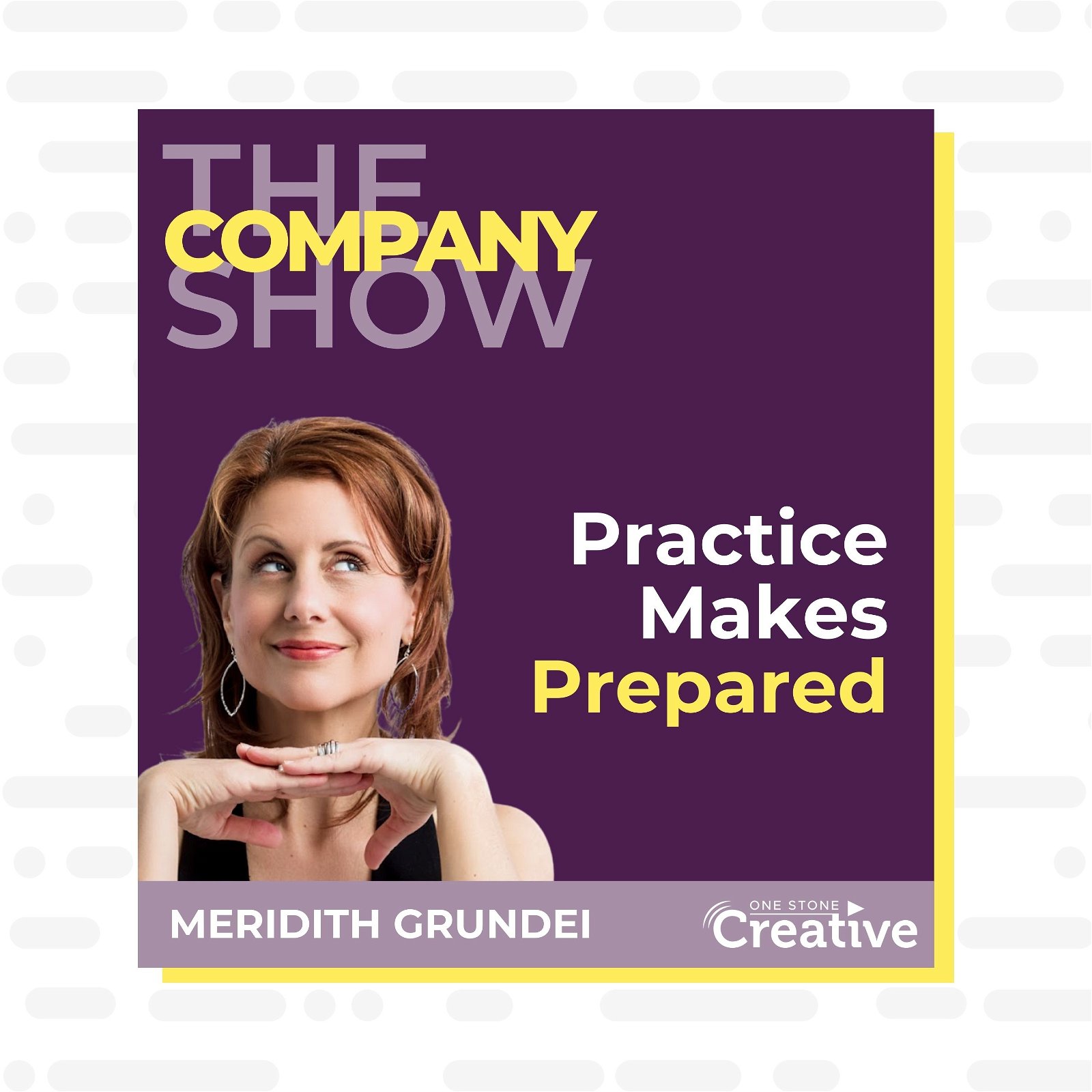
Practice Makes Prepared with Meridith Grundei
Consistent practice doesn’t guarantee that everything will go perfectly—but it does make sure that you’ll be prepared for whatever happens. In this episode, director, actor, and educator, Meridith Grundei shares tips and strategies that will help you become ready and confident as a host, presenter, or guest!Meridith is an expert in communication and has spoken to companies like Amazon, AWS, Panasonic, and Merck and was a teacher at the Second City in New York.She has 90,000 dedicated fans on TikTok and was recognized as one of the top ten speaking coaches by Yahoo in 2022. She is the driving force behind Grundei Coaching, where she incorporates improv theater techniques to foster trust, empathy, and creative thinking.Meridith shares so much practical advice and specific strategies that we can use for improving performance as podcast hosts and as guests. And of course, these are skills that you can transfer to sales, to your marketing, to how you pitch yourself, and how you network.I took pages of notes and even took a stab at the half-life exercise she gives us in the call as homework, so you'll get to hear that at the end of the show.Meridith has been so giving of her time and knowledge and her improv skills are so interesting and so engaging and can make such a difference in how you create your content.Tune in to the full episode to learn about:The transformative power of improv theaterHow to enhance presence and mindful communication through ImprovThe power of smiling in podcastingThe Half-Life exercise for condensing communicationDon’t forget to join us for our free monthly strategy calls on the third Thursday of every month!ResourcesOne Stone Creative | LinkedIn | Twitter | Facebook | InstagramMake sure to check out our free Monthly Strategy Calls!Podcasting for Business Conference 2023 RecordingsLearn about what other business podcasters are doing:State of Business Podcasting Report 2023Meridith Grundei Website | Instagram | TikTok | LinkedIn | YouTubeRelated:How to Be a Better Storyteller with Gini DietrichPFBCon 2023 RecordingsWhether you're a solopreneur, manager of a department, principal at a firm, or a non-fiction author ready to expand into audio, the Podcasting for Business Conference will help you leverage a podcast to meet your business objectives.Missed PFBCon 2023? Check out the recordings!
34:3808/02/2024
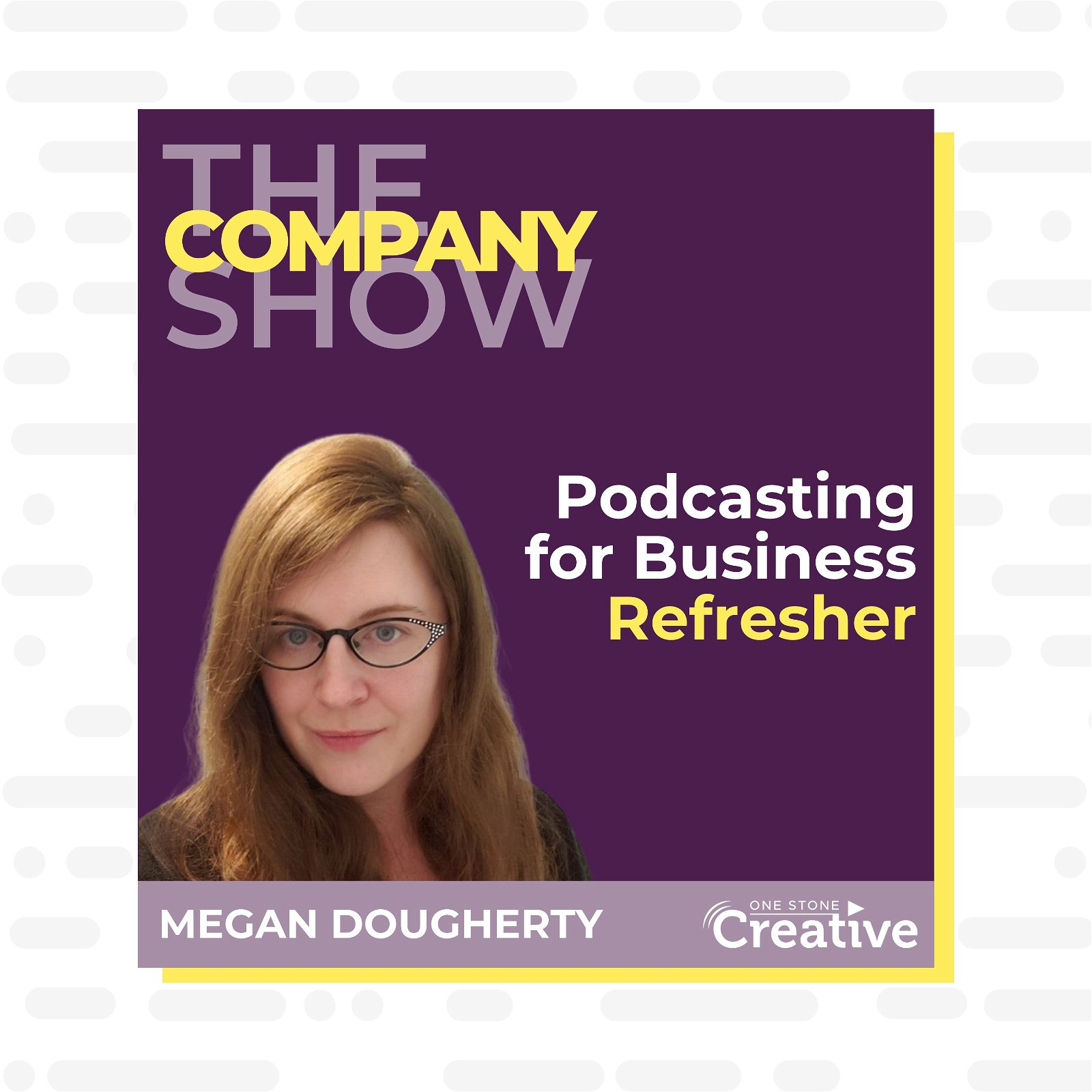
How to Measure the Impact of Your Podcast
When you podcast as a passion project, you need to have a why that keeps you going. When you podcast with the intent of turning it into a business, you need a plan to generate income to support the work.When you podcast in support of your existing business you need... well, it depends on your business.But whatever your business is, and however your show supports it, you need to know that what you are doing is working. So, the question we should all be asking ourselves, is: what is my podcast supposed to be **doing for my business?In a perfect world, that’s an easy question to answer, and you have clear data to back that answer up. In this world, most company podcasts are doing a lot of things right and a few things wrong. While it’s plainly successful enough to keep doing it - it’s really hard to figure out why.However, it is possible to identify the specific ways your podcast is generating value for your business and track exactly how much value every month, giving you the clarity you need to make decisions about it.Tune in to the full episode to learn:The importance of identifying the overarching goal of your podcastTracking specific outcomes to determine its effectivenessMetrics for different types of podcastsTracking metrics and optimizing your podcast contentHighlights from the State of Business Podcasting ReportDon’t forget to join us for our free monthly strategy calls on the third Thursday of every month!Effective Value Measurements for PodcastsHere’s how it works:Identify the most important, overarching goal of your podcast. It will usually be one of the Business Podcast Blueprints: Thought Leadership, Relationship Building, Audience Engagement, Conversions or Content.Figure out the specific outcomes that indicate how well your podcast is meeting that overarching goal.Regularly track that outcome as a metric and optimize your podcast to get more of it.Then do it again and again for every different way your podcast is creating value for your company.Easy, right?Easy to say in any case. Doing it when you’re 6 months or a year into production and there’s always something running late is somewhat more complicated.So, let’s run through a couple of examples here, so you can get a solid idea of how this process works. We’ll start with an Audience Engagement Show.Audience EngagementThis is a type of podcast that I think is frequently overlooked in favor of the exponential possibilities in Relationship Building Shows, or the outward-facing nature of Thought Leadership ones. But you’ve heard the adage I’m sure that it’s easier to sell more to an old customer than it is to get a new one. Well, by the same token, it’s easier to nurture a relationship with someone who knows your name than make a fresh introduction, and that is where audience-building podcasts really shine.Shows with an Audience Engagement Blueprint exist primarily to engage people who are already aware of you - it could be clients, email subscribers, social media followers or fans, listeners, or traffic that are entering your orbit from other strategies like paid search or PR campaigns.So, let's say that Company A has this as their main overarching purpose - they want to engage and nurture people who, by whatever means, know who they are.The outcomes that are going to tell them it’s working might be getting input and feedback from listeners on topics that matter to them, and less time spent on customer service because customers are being served and educated by the show.Now we assign metrics to those outcomes:For getting feedback and input, Company A has created different webpages or playlists for each of their podcast subtopics so that people can easily access the content they are most interested in, and the traffic to those pages, and downloads from those playlists are going to provide the data about how much of their audience is interested in each topic, informing their future content creation decisions. For an example of this in action, check out Amy Porterfield’s Online Marketing Made Easy landing page, which we’ll link in the show notes, among many other strategically excellent things you’ll see on this page, is a section where you can choose different topics and immediately see episodes relating to it that you can click through, providing that juice data about audience-interest.For Customer service, Company A already has an idea of how much time they are spending per client on customer service each month, and they have created podcast episodes and segments to specifically address common concerns or problems and trained their team members to provide those segments and episodes to customers encountering those concerns. The change in the amount of time spent on customer service over time will tell them how well their content is helping educate the customers.Now let's look at how we might follow this process for a Relationship building show.Relationship BuildingThese are podcasts that exist primarily as a networking tool so you can meet the types of people who will be great additions to your professional network for reasons like becoming clients, referral partners, co-promoters, collaborators, and all the other good things that come from knowing lots of great people.Company R specifically wants their podcast to be a source of new networking partners that will refer business to them, and that will result in invitations to appear on other podcasts.So, let's assign metrics to these outcomes, and figure out how we track them.Some metrics can be found pretty easily, like the website traffic and download numbers we looked at above, but in other cases, things need to be a little more manual.For new business, podcasters will need to keep track of how many referrals each of their guests sends them every month, and over time look for patterns in the type of guest that was most interested in making those referrals.So, you might track email introductions from your different guests, or ask your new leads on discovery calls how they found out about you. This is good practice anyway, but the key here is to keep a regularly updated document with the information so you can see how much business your podcast guests are sending your way.Now, for invitations to your guests’ podcasts, you’ll have to make sure you are interviewing enough people who also have podcasts and adding a request or suggestion about an episode to some part of your guest management workflow.Just like for tracking referrals, you need a central location to keep track of the guest opportunities that result from the interviews you host on your own show.All strategic elements of relationship building need to be done with one important thing in mind:The relationship is the important part, and even when you have specific goals and metrics for outcomes you want, remember to put the human first!On the subject of doing exactly that, Atiba De Souza gave an amazing presentation at PFBCon in November - all about using podcasting as a tool to generate new relationships and partnerships in your industry, partnerships - it was an amazing talk and he had one particular tip I wanted to share with you today about preparing for when you’re going to be a guest on other shows and how to be the kind of guest that not only gets invited back - but gets invited to do other things.https://vimeo.com/908014795?share=copyI love this idea, and not just for when you’re preparing to be a guest, but when you are preparing for a guest to join you on your own show. (And if you want to hear Atiba’s whole strategy - and that thing that happened to him back last January, you should grab a copy of the recordings of the Podcasting for Business Conference at PFBCon.com.) The principle at play here - taking the time to get to know the person you are talking to and what they care about - is the same when you’re a host as when you’re a guest, and investing in that, no matter what your specific goals are, is going to make it easier to reach them.Now obviously, there is a lot of work that goes into thinking about your podcast in this way - there is strategy and infrastructure required to make it work, and nuances that are going to be unique to you - but if you’re willing to learn that strategy and DO that work, your podcast is going to generate much, much more value for your business - and perhaps more importantly - you’re going to be able to see it happening, and have clarity on what is working and what isn’t.While we’re talking about clarity…Data Highlights from the State of Business Podcasting ReportI wanted to share a little insight my team and I gleaned from last year’s State of Business Podcasting report - there was lots of interesting detail, and we’ll be exploring it over the next few months, but there were three particular takeaways that I think can make a big difference to your strategy right away.As you probably know, every year we pull a list of the top 100 podcasts and evaluate them on about 70 different criteria to help establish trends and baseline best practices for those podcasting in support of a business. There were three particularly interesting takeaways this year:Social Media Promotion: Quality over Quantity. Both the number of social media channels used by the top 100 podcasts and the frequency of posting on them were down on most channels this year. This seems to indicate that podcasters were not finding enough ROI in really aggressive broad social media posting. (Although there certainly are still plenty of daily and multiple daily posting schedules - it’s less than in previous years) The exception is LinkedIn which saw modest growth in usage but a significant increase in posting frequency. Daily posts have increased from 10% to 22% of the shows using the platform, and multiple posts per week have increased from 11% to 28%.Hooks are out. The hook, sometimes called a sizzle clip, is a clip from the interior of an episode played at the beginning before the intro and hello. A couple of years ago more than half of the shows we evaluated used hooks, but that number has been in steep decline and now only about 20% of the top shows use one (10% use a host-recorded intro in place of a hook - this trend might increase). My best theory for why this is happening is the popularity of short-form videos - those shorts, reels, and TikTok videos with good moments from episodes are serving the function of a hook in introducing the topic and teasing the value of full episodes. If you promote via short video clips, consider removing the hook from your episodes and getting into the content more quickly.Podcast Networks. There was a big jump this year in the number of the top shows that were part of podcast networks: 51% to 66%. There are different kinds of networks, topical (shows produced by the network or independently on a single theme) broadcast (news and other organizations that release using a podcast format among other media types), and content (companies whose whole purpose is creating and releasing content - not theme restricted). One of the bigger benefits of being in a podcast network is the cross-promotion to an existing audience - this is why so many are in the top 100 (not all stay!) close to their launch. This is a benefit you can mimic as an independent by collaborating with other shows for cross-promotions.There is so much more fun detail in this year’s report, and I invite you to check it all out at podcastingforbusiness.com.Something we’ve got planned for future episodes is deep dives into specific data points we looked at for the top 100, as well as breakdowns of some of the shows that make up the list. It’s going to be a lot of fun, and I’d love to hear what you’re most interested in - head over to podcastingforbusiness.com and send us a message to let us know!While you’re there, you might want to check out the Business Podcast Accelerator. This is a brand-new service from the team at One Stone Creative, where we will work with you to identify the metrics that matter most, support you in tracking and analyzing them every month, review your content, help you optimize your show, and provide on-demand email and voice support that will complement your current workflows for planning, production, and promotion. It’s really exciting, and you can find it at podcastingforbusiness.com/accelerator.Thank you for being here with me this week, The Company Show is Produced by One Stone Creative, and the best way you can support the show is by telling someone about it!Coming Up NextNext week I’m talking to Meredith Grundei A speaker, director, actor, and coach with a passion for helping speakers elevate their performance BIO - she shares so many tips on being a good presenter and a good host, increasing your confidence and presence when you’re on the mic or camera.It is such a great conversation; I can’t wait for you to hear all of it. So, make sure you’re subscribed to your favorite podcast listening app, and we’ll be back next week.Key Quotes"Your podcast is going to generate much, much more value for your business - and perhaps more importantly - you’re going to be able to see it happening.” - Megan Dougherty"The relationship is the important part, and even when you have specific goals and metrics for outcomes you want, remember to put the human first!" - Megan DoughertyResourcesOne Stone Creative | LinkedIn | Twitter | Facebook | InstagramMake sure to check out our free Monthly Strategy Calls!Podcasting for Business Conference 2023 RecordingsLearn about what other business podcasters are doingState of Business Podcasting Report 2023Related:Metrics that Matter for Company PodcastsTurning Your Business Goals into Content MetricsPFBCon 2023 RecordingsWhether you're a solopreneur, manager of a department, principal at a firm, or a non-fiction author ready to expand into audio, the Podcasting for Business Conference will help you leverage a podcast to meet your business objectives.Missed PFBCon 2023? Check out the recordings!
18:5301/02/2024
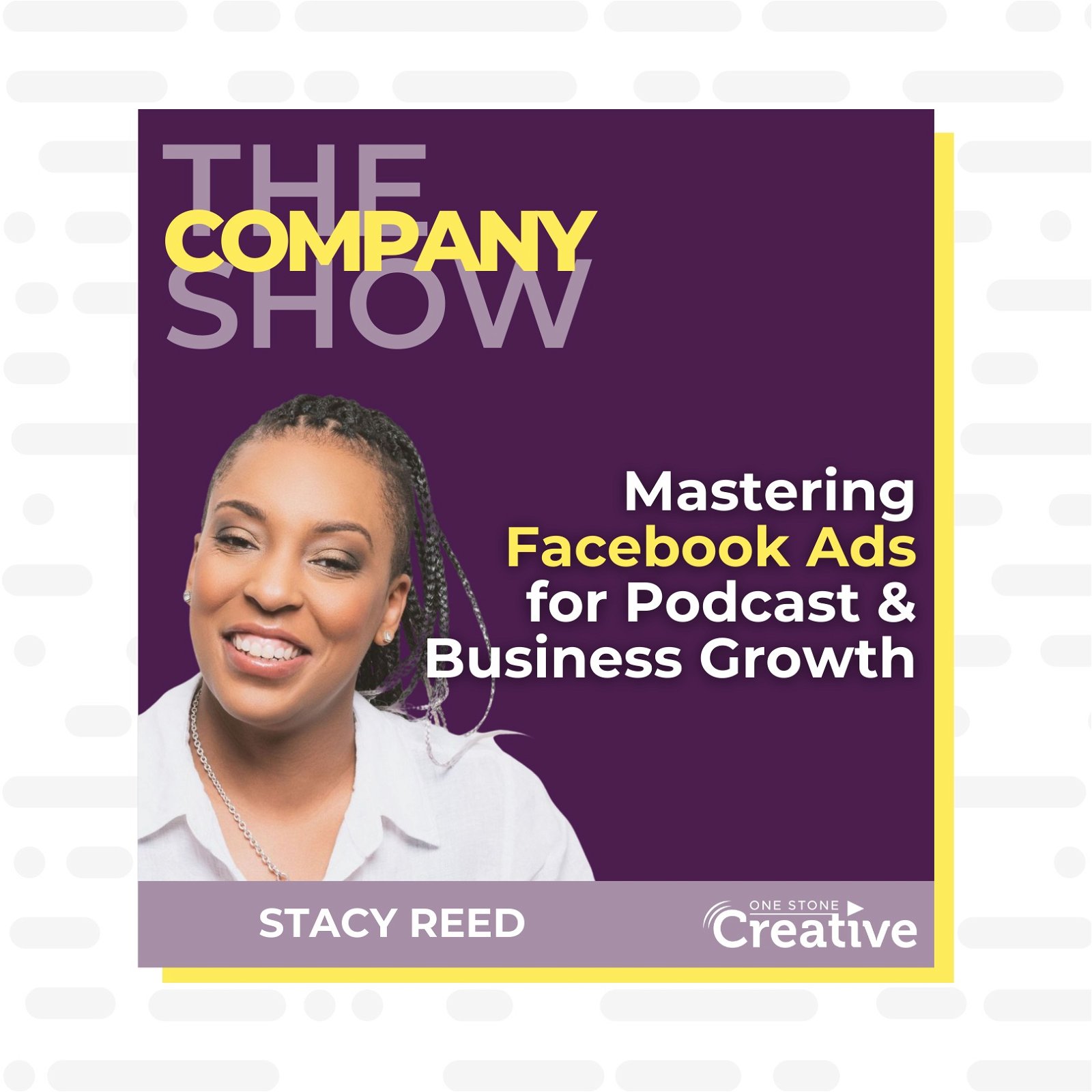
Mastering Facebook Ads for Podcast & Business Growth with Stacy Reed
Paid social media is a tough nut to crack, but once you manage to make it work it can become a lucrative and dependable source of traffic and revenue for your podcast and business.I have never been able to get to the meat of that particular nut, but a recent guest expert on our Strategy and Networking calls AND speaker for next week’s Podcasting for Business Conference Stacy Reed of Stacy Zeal & Co. has - and she teaches other people how to do it too. Stacy is a Strategic Marketing Consultant and Facebook Ads Expert, who teaches CEOs how to make more money, gain their time back, and rapidly increase their visibility to impact the world.She joined us for an in-depth conversation about the technical and strategic elements of Facebook ads - from what the heck a pixel is, to the different types of campaigns you can run for different purposes.This was such a rich and valuable conversation, that we decided to run it here on the Company show as well. Listen to our conversation below, or continue reading the blog post!Tune in to the full episode to learn:How to use Facebook ads to grow your podcast and your businessEverything you need to know about Facebook PixelHow to choose the right advertising platformThe things to consider before running a campaignHow to choose the best objective for your campaignThe best practices when it comes to copy & creativesDon’t forget to join us for our free monthly strategy calls on the third Thursday of every month!How Stacy Reed Grew Her Podcast Through Facebook AdsLeveraging Her Marketing BackgroundIt's interesting because it's like I've always been someone that I want to be able to create something once and then figure out how can I get the most eyeballs on it. My brain does not like to create new all the time.We're in a content world, so we have to create new content for sure. But I remember just thinking, oh my gosh, this episode was so good and it did not get as many downloads as I was hoping that it would get or so many people just need to hear this episode.It's just so, so good. And then also being an ads expert, my background is in marketing. I've been in marketing for eleven years. I led paid social at Zappos, and so I was really immersed in Facebook ads, Instagram ads, TikTok ads, and all the different ad platforms on some of the social networks.And that's what I teach and that's what I talk about in my business. And I really started to think about how I can use ads and podcasts together. Because volume is my specialty. So being able to say like, I want to drive volume to particular offers or to particular things, then I started to think, how can I use what I'm creating on my podcast to then help me to generate business?Because it gives you the context of how I use my podcast in my marketing because it helps you to understand how the ads come into play.Shifting Towards Lead GenerationSo my podcast is primarily nurturing content. I get a lot of people who love to listen to my podcast. And my goal with my podcast is to nurture people until they are ready to become clients.I post a lot of content about ads, about marketing strategy, about business strategy, those kinds of things. When I started to think about how I can use ads to amplify this or to accelerate my podcast, I started to think about how I can use it to generate leads, because that's really what I need for my business.We all as business owners, are someone who is looking to get brand deals and things like that. This may not be super applicable, and there are other ways you can use ads, but the way that I use them is to generate leads. Where I start with it is using it as a nurture content. But then I started to think, how can I use this as lead generation? What I typically do is I like to create series on my podcast.So I'll create, for example, a series about marketing funnels, because that's one of the things I found. Like, I have a course on Facebook ads, and when I did a promotion last time I found that, I was asking people like, okay, well, why didn't you sign up? And some people were saying like, oh, I don't have a marketing funnel, so I can't run ads.And I'm like, oh really? I could teach you how to run a market, I can teach you how to do a marketing funnel, and I can show you this. So I created a series of podcasts about key elements of marketing funnels, helping people to understand that they already probably have a funnel if they're creating content.If you're a podcaster, you typically have a funnel, you just haven't really set it up yet or defined it yet. So I created that series and then I published some of my podcasts. I took those episodes and I just put them into a PDF guide that just says like, hey, here are four episodes that will help you to create a marketing funnel.Podcast Series as Lead MagnetsI put like a little workbook in there. I pulled something out of my course. I put it in there and then I use that as a lead magnet because now I had to realize that people listen to my podcast and then they become clients. So they like to binge my podcast. They like to consume my episodes. That's where people go when they are really kind of in that place where they're like, I want to work with Stacey, but maybe I'm not ready yet.And I thought, how can I take this nurture content and also turn it into a lead generator? That's really kind of been the journey for me. It's like one figuring out running ads to individual episodes. It's running ads to series and taking those episodes and repurposing that content into a lead magnet.Those are the ways that I've been typically using podcasts. And then I run ads to those things. I run ads to the individual episodes. I run ads to the lead magnets as a series. If you are a business owner and you need to generate leads and you are creating podcast episodes also as a part of your nurture content, you can absolutely take that and put that into a series.Another lead magnet that I had that did really well, especially when I was just starting out, I had created a private podcast series where I worked with someone who would help me outline each episode.I used Hello Audio as the private podcast distributor, but then I ran ads to it like running ads to that actual private podcast. Those kinds of things I think are really effective because people are searching for specific information. Especially with podcasts, you can really give people a well-rounded picture.You can give people one episode, but if you can give people three or four episodes that paint that full picture for them, then that's really tactful. And then you just use that as a lead generator and run ads to it.Everything You Need To Know About Facebook PixelI always recommend that you put your podcast on your site because one, if you're running ads to a podcast player, your Facebook Pixel is not going to be able to pick up on that because your Facebook Pixel is what you can install on properties that you own.So, like your website, I can't go and install my Pixel on Apple's podcast player. For example, if you're running ads directly to the podcast player, Facebook is not able to receive those signals to see, like, is this person actually doing something there?Because your pixel operates like a bridge between Facebook and your website. And so it's always sending signals back and forth. Facebook is sending someone to your website saying, what do they do? Do they take the desired action? If they do, that's great.Then Facebook's going to say, oh, well, Susan took the desired action, so we're going to find more people like Susan. If Susan does not take the desired action, which means, going to the landing page and downloading something or whatever the action is, then it'll also send that signal back to say, like, Susan did not take the desired action.So it's like, let's find people who are not like Susan, or maybe Susan is not in our target audience, so let's find people who are different than Susan. Facebook is always building a profile of who your people are.So you want to make sure that your podcast episodes are posted on your site and that you're actually sending an ad tracker to your site so that you can get an accurate read on the data. SEO also helps.Taking Advantage of Facebook & Instagram’s SynergySo because Meta owns both Instagram and Facebook, you actually would just need one Facebook Pixel and that will pick up your signals and send that back to Instagram and Facebook.One of the great things about running Facebook ads is that you do get two channels in one because you can run the exact same campaign, exact same budget, exact same creative as Facebook and Instagram and Messenger and WhatsApp, because Facebook owns those other channels as well, and it would just come out of the same budget pool.So you really are getting two channels for one. And what Facebook is going to do is it's going to show you an ad on the platform that you're most likely to convert on. You get on Facebook, you see an ad, and then you may see a similar ad from the same person on Instagram or an ad that's maybe a different variation of that ad on Instagram.It's going to show you the ad based on the platform that it thinks that you're going to most likely to convert on that's. One of the things I love about Facebook is that you get both Facebook and Instagram for essentially the price of one.Should you set up your Pixel now?Right away, because what happens is when you install the pixel. So, as I mentioned, it's that bridge, right? It's sending signals back and forth. So whether you're running ads or not, those signals are always kind of happening.What people are doing on your website, Facebook is always building a profile, and you can build an audience that says, like, hey, here's my website traffic. Like, want an audience specifically of people who visited my website in the last 90 days. You can go all the way back to 180 days.I believe you can say like, hey, let me create a custom audience of people who have visited my website over the last 180 days. Maybe you're doing some kind of special promotion where you want to make sure that you target your site visitors or people who listen to your podcast.Because if you're putting your podcast on your website, that counts as website traffic. You can even drill into specific pages. You can create an audience of people who have visited, specifically my podcast page or individual-specific URLs. Like you can say the URL contains this or contains that, contains that.When you install your pixel, it starts collecting that data. So whether you run ads or not, I definitely recommend installing the pixel because that means that you have even more data to work with.If you start in Q2 of next year, you can still target people who visit your website. From today until then. It starts from when you install that pixel.Watch this free training from Stacy Reed to learn how to harness the power of Facebook Pixel.Choosing The Right Advertising Platform & Understanding Your AudienceI haven't run across too many niches that I would say don't work with Facebook ads. But what you have to think about is where are your clients or the people you're trying to reach making their buying decisions about your type of offer or your type of business.For example, if you have a podcast that talks to HR professionals, right, maybe your podcast helps HR professionals do their jobs better. They're probably not making their purchasing decisions about HR-related stuff on Facebook.They probably were making those decisions on LinkedIn because that's where it's a more professional site. It's where they're actually in the mindset of business. But that's not to say that your clients aren't also using Facebook, and also because think about how I know for myself and a lot of people that I come in contact with.I use Facebook, I use Instagram, I use LinkedIn, I use Twitter. I use all the different social platforms. But the mind frame that I'm in in each of them when I'm on them is different. When I'm on LinkedIn, I'm looking at more professional things. I'm expecting it to be a little bit more of a professional platform.On Facebook, there is a little bit more of a social element. Like my Facebook page is all business for sure. So I don't do business on Facebook and most of my business comes from Facebook.But when I'm going on Facebook, if you're thinking about your customers, if you're helping people with weight loss, for example, are they going on Facebook? Are they going on Instagram to find that kind of information? Are they following weight loss influencers? Are they following those kinds of pages? Is that kind of stuff that they're actually consuming on that platform? What you want to think about is not necessarily your specific niche.It's more like where are your customers and your clients? If you're trying to get brand deals, for example, you may want to be heavily on Instagram because that's where a lot of brands are going and looking for content creators on Instagram because that's where their clients are.Industry-Specific ExampleI used to work at Zappos and I led paid social there. We were heavy on Instagram, we were heavy on Facebook. We weren't doing too much on LinkedIn. LinkedIn was more so for different corporate verticals. We had Zappos at work which was all about making those connections with people who own warehouses so that we can give their people discounts on specific shoes.If you need steel-toe shoes, for example, you can figure out different facets of your business that may fit on different channels. But for the most part, think about where your consumers or the people who are consuming your podcast, where are they making purchasing decisions about your types of offers and that's where you want to make sure that you are showing up.Leveraging the Reach of FacebookI wouldn't say it's not niche-specific because there are a lot of different niches that can work on Facebook and Instagram and there are a lot of different people who use Facebook and Instagram.Facebook has 2.9 billion monthly active users. If you're telling me that your people aren't on Facebook, it's like, I mean, out of 2.9 billion people, like, you're telling me nobody and none of your people are using Facebook, okay?But it's really about figuring out when it comes to your type of service or your type of product, where are they making their purchasing decisions, and that's where you want to make sure that you're showing up.Things To Consider When Starting with Facebook Ads1. Your goals and your sales cycleFor example, I get people who come to me and say, hey, Stacey, I started running an ad and it didn't convert in two weeks. Weeks, and I didn't get any sales in two weeks until now. Facebook ads don't work for me.Well, how long is your sales cycle? My sales cycle is three months. Okay, well, if your sales cycle is three months, why are you expecting people to convert after two weeks? That's something that you have to understand. People tend to sit on my email list for at least three or four months before they buy from me. That is what I used as my timeframe to measure when I was working at Zappos.We are expecting people to buy something that day or the next day. We have a very short sales cycle. Either you want the Nikes or you don't, those kinds of things that we were measuring success based on one or two-day sales cycle. So one, it's about understanding what your sales cycle is for your particular type of products or for your particular services.2. Fresh ad accounts don’t have a lot of dataFacebook is always is, the more you run ads, the more efficient your ads are going to be. Because Facebook is taking all that data and putting it into like a container, and it's saying like, okay, these are the people who convert for are.When Stacey runs ads, she typically talks about these kinds of things. These are the people who typically convert for her. So they're building a profile of your people. So you want to make sure that you're looking at it from a sense of like, facebook ads are a long-term strategy.They're not something that you put a dollar in. You're going to get a dollar right out, right away. But if you are someone who has an email list, then you can appreciate the value of having a lot more people on your email list, especially a lot more targeted people. Because that's the one great thing with Facebook ads, is that you can really target people.Like if your clients are small business owners, you can target small business owners. So you fill your email list with a lot of people who are actually in your target audience. If you are someone who also sends your podcast out via email, that means that you get more people who are seeing your podcast, and ask more people who are in your world.3. How long should you run your ads?Give it at least three or four months because there's a lot of testing that goes into Facebook ads to figure out what strategy works, and what doesn't work. There's a lot of receiving a whole lot of data. And that's the great thing about Facebook ads also, is that you get a ton of data. You get a lot more data than you get from just the podcast analytics that you get. You get a lot more data than what you get from organic marketing.And so if you're able to actually run some ads, and you're able to receive the signals and say like, okay, this is working, this was not working, that's part of the process, is figuring out what works, what doesn't work.So give yourself at least 90 days. Give yourself three or four months to really figure out if something's working for you.3. How much should you spend?Facebook ads are very, very flexible when it comes to budget because how they charge you is by cost per impression.Google ads and some of the other platforms are charging you by clicks. They're saying you're paying $2 every time somebody clicks on your ad. But Facebook charges you based on how many thousand people have seen your actual ad.So it'll say like, you're paying $5 for 1000 people to see this. So if you're thinking about it in that way, and 1000 people is not a lot of people when it comes to Facebook, if you think about there are 2.9 billion monthly active users on this site.If you're spending $5 a day and your cost per impression is $5, then you're only getting 1000 people to see your ad a day, or you're only getting 1000 impressions a day.That's not really a whole lot of people, especially if you're thinking about how big of a pool the audience is. So I like to tell people I like to spend a minimum of $15 a day. Then that helps you to be able to get some data. The costs are very controlled. You can always turn things off immediately.4. Increased competition during Q4In Facebook, if something's not working, you can just turn it right off. So $15 a day is a minimum that I like to spend because that gives you space to be able to get some data in and get your ads seen by people. Especially during Q4 work, your costs are a lot higher because there's a lot more competition.Everybody's trying to run ads during this period of the year, so your cost per impression is going to be high. It's going to be a lot higher than it typically would be throughout the rest of the year. You have to kind of account for those kinds of things.Or what is the cost, what is Facebook charging you to get in front of your people? How much competition is fighting for that audience? Business owners, for example. There's a lot of people trying to target business owners.So if there are a lot of people trying to target business owners, that means the costs go up $15 a day minimum, somewhere between two hundred and fifty dollars to five hundred dollars a month if you're thinking about a monthly budget as a minimum.5. How much of your revenue should you allocate to marketing?But what I also like to tell people about budgets is that you have to start to look at your marketing and create an expense line for your marketing. A percentage of your revenue should be allocated to marketing.For example, with me, I follow the Profit First System, which is a great book, teaching you how to balance your money and stuff like that. When I started to look at that, and when I started to do that, I allocate how much I pay myself as a percentage. I allocate how much profit I want to have as a percentage.I figured out what my expenses are based on, what percentage my expenses are of my revenue, and then I figured out, okay, what's left for me? I allocate about 5% of my monthly revenue to my marketing and to my ads, because that is a percentage that works for me, meaning that I can spend that and still be able to pay myself, still be able to make a profit, and all that kind of good stuff.If you're someone who's making $10,000 a month, $20,000 a month in revenue, $500 might not actually give you enough volume for you to actually be able to see something that's working, especially if you're making 20 to 40k a month, $500 is really not just going to be a drop in the bucket for you.If you're just starting out and you're really trying to play around and figure out what's going on here, then yeah, $500 $250 a month actually is a good budget for you. But if you're making over $10,000 a month, then you really need to start allocating a percentage of that revenue to your marketing. So that way you can actually give it a fair comparison.Your Objectives & How They Affect Facebook Ads BillingFirst off, what are impressions?Impressions are more so just how Facebook is going to bill you. That's when they're billing you a certain dollar amount for a thousand impressions.Regardless of how you set your campaign up, they're still going to charge you by impressions, and based on the objective that you could what you're talking about is our objectives. Essentially, Facebook has been able to bucket its users based on their behavior.It can say, like, Alexandra is more likely to become a lead, or Stacey is more likely someone who's going to make a purchase. Or Megan is more likely going to be someone who's just going to double-tap and keep scrolling. She's not going to leave the platform. She's just going to like, comment, and share, and then she's going to keep on scrolling.So it's able to kind of bucket people that way. And then that's what's going to determine your objective. When you select a lead generation objective. For example, Facebook is going to show your ad to people who are more likely to become a lead. Or if you pick sales, it's going to show it to people who are more likely to make a purchase.Even can go just traffic where it's like people who are more likely to just go to the landing page, let it load, and then they don't actually sign up for something, but they actually do go to the landing page.Selecting Your ObjectiveLead GenerationSo there are so many different objectives that you can choose. I typically use a lead generation objective when I'm running ads for my podcast because that's my goal. My goal is to generate leads. And the way that I structure my podcast on my website, I have lead magnets in there.So I'll say, for example, when we were talking a little earlier, I'll take a podcast series that I have. I just did a series on funnels, on marketing funnels. I took that. I took all four episodes and they were published in the podcast land, right? So you can go to my podcast player and you can find the episodes.But I wanted to make it easy for people to say, like, I'm interested in marketing funnels here. Just give me all your content on marketing funnels. So I created a little PDF that just has a link to each episode in there. And I have like a little workbook that goes with it as well. I run Lead generation ads to that because I want people who are more likely to sign up to become leads.Traffic ObjectiveI rarely use a traffic objective because I don't want just people to go to my website. I want people to actually go there, stay, wait for it to load, and actually sign up for something because my ultimate goal is to get people on my email list, email, especially if you're a podcaster.I get most of my downloads when I send out an email saying, hey, I have a new podcast episode that comes out. And so my goal with my business is to grow my email list exponentially because I find that most of my revenue comes from my email whenever I'm doing any kind of promotions. So that's why I typically use a lead generation objective.What are the factors that cause ad price fluctuations?But if you think about lead generation is going to cost less than sales because sales is a higher objective, a higher purchase intent. So Facebook is going to charge you more for your cost per impression for sales than they are going to charge you for leads.Traffic is going to be even less expensive to run because people are just going there and they're just checking it out doesn't require a commitment. The costs are going to fluctuate based on the time of year, based on how much competition is for your audience, based on the objective that you use.All of that stuff kind of goes into the factor of cost. And Facebook doesn't actually tell us specifically like, oh, we charge this for lead generation, we charge this for sales. They don't tell us how much they're going to charge. Those kind of things do impact the cost.The Objective Showdown: Leads, Traffic, and SalesLeadsMy ultimate result is I want people to consume my podcast and want to be on my email list. That's why I run lead generation campaigns. And I also have things that are like pop-ups on my site that say, would you like to join our email list? I'll send you my top five episodes.All of the things on my site are set up to really kind of collect leads because that's how I feed my business. That's how I make sales from leads. If you are trying to get a brand deal and. Your brand deals are coming from how many downloads you get or how many listeners you get.So because my objective is to get leads, that's why I set my pages up the way that I do to really kind of get those people onto my email list. And then I have like a welcome series that comes behind us, like, oh, thanks so much for listening to the podcast. Here are my top five episodes, top five downloaded episodes, or things that I think are most relevant to anybody who lands on a particular page.Sometimes I have lead generators on there where I'm like, hey, get the companion guide that goes with this series. So if I do a series, I always create some kind of worksheet or something that goes with it that includes a link to each episode. And on there, I have a pop-up that says, like, would you want the companion guide to go to this episode? Add your information here and I'll send it to you.So it really kind of depends on what is your objective as a business with this particular episode and that's going to determine how you set it up.TrafficBut you might want to do a traffic objective because you want people to just kind of go to your website and really need them to become a lead, but you really want them to go to the site.Maybe they want them to listen to your podcast player on your site. Or they go to your site, they see your podcast player, and you have your buttons down that says listen on Apple. And they go and listen on Apple. Really depends on what your business objectives are.SalesSay you have a digital product, for example, that you're promoting in your podcast episode and you have some sales checkout or something on your page. Then you want to run some sales objectives because then it's going to get people to your site who are more likely to complete the purchase.If you have a podcast episode about how to plan your week, and then you have a planner that goes with it that you can buy, like a $10 planner or something that goes with it, you should definitely put that on your landing page, on the page of the podcast player where people go to on your show notes, I guess I should say.For that case, I would probably want a sales objective because I want people who are more likely to become sales to make a purchase rather than someone who's just going to become a lead or just go to the page and check it out.SummaryIf growing your list and growing your opt-ins are the most important, you're going to want a lead generation campaign.If you just want to make those sales and maybe your sales cycle shorter, it's an easier buy for people. You're going to go with the sales objectiveIf downloads and show growth are your goals, then you can take the least expensive option, which is going to be the traffic campaign on Facebook.Boosting Posts: The Biggest Mistake You Can MakeThat is something Facebook asks me to do all the time.It makes it so tempting. It's like, don't you want to boost this post and get 600 more people to see? It just goes perfectly with the objective conversation we were just having. One of the objectives that you could also have on Facebook is engagement.Engagement is likes, comments, and shares. And honestly, engagement doesn't pay the bills. Y'all, I don't care how many people like it, I don't care how many people share it. I want to know, did someone become a lead? Did someone make a sale? Did someone come into my marketing ecosystem somehow?So when you're boosting a post, the objective is engagement. You cannot change the objective there. When you're boosting a post, Facebook is just going to show your creative to people who are more likely to comment, like, and share.You also are limited in the audiences that you get to target. When you go to boost a post, you have very limited options for the audiences that you can show this to. You can show it to people who are similar to your followers, you can show it to maybe demographically like people who live in a certain area.Why Ads Manager is SuperiorBut when you're building ads in Ads Manager, there's a whole Meta Business Suite there that shows you how to run ads. That's where you can see insights for your organic content. There's a ton of information in Meta Business Suite. That is the platform that you go into and you run ads from. And in there you can run ads to custom audiences.Custom Audience TargetingFor example, if you do have an email list that has over 1000 people on it, you can upload that email list directly to Facebook and say, hey, show this ad to people who are just like the people on my email list, or show it to my people on my email list.Because maybe people are competing for your audience's attention. Especially during Q4, people who are sending emails are going to go from sending one email a day to two emails a day or three emails a day.Advanced Audience TargetingSo as we move through Q4, you can run ads directly to just your email list. Or you can create a lookalike of your email list of people who have similar behaviors and habits. You can create more custom audience instances. You can retarget your website traffic.So if people are kind of like, say, if you decide you want to run ads with each of your new episodes, which is a lot, I would say, to do, I wouldn't necessarily recommend that. But let's say that you have a really great episode and you want to make sure that your customers or your clients in your world see it. You can do that.You can run ads for people who follow you on Instagram or people who have interacted with you on Instagram. But when you're boosting a post, you're very limited to the amount of audiences that you can choose because it's very limited on the objective and it's just a low lift and a very cheap, like, kind of dip your toe in to get yourself going with ads.I always recommend that you avoid boosting posts because like I said, I don't care how many people like the post, I want to know how many people are actually going to the landing page and consuming the content.Best Practices For Call To Actions & CreativesCall to ActionSo call to action is the easiest. So I'll talk about that first. Facebook does have an actual call to action button that says Listen now. That's the one that I use when I am running ads directly to a specific podcast episode. I'll say listen now. That one's really good you can use.I mean, Learn More is a little vague. I always tell people with the call to action buttons, you are limited to what Facebook gives you. So, like, Facebook is only going to give you a certain I think maybe it's like ten or 15 options that you can choose from.But I say pick the one that's closest to the one that you want people to actually do. Because what I learned when I was working at Zappos and we were spending millions of dollars, so we were doing a lot of testing. One of the things we were testing was Shop Now versus Learn More.Literally 90% of the time when we were running these tests, if we wanted people to get more purchases, this is for people that hit Shop Now for the ads that say Shop Now than the ads that say Learn More.That's one of the things that I took as a learning for myself. And I teach that to my students in that the call to action button should be as closest to the action that you want people to take. So if it's listen now it's listen now if it's download download.So, for example, when I create a lead magnet with my funnel series, the Call to Action, there is download because I want people to download or sign up or something like that.I do make it so that people have to go through a landing page to be able to actually get that series so that I collect the lead. So that's call to action buttons, you're limited to what Facebook gives you.But pick something that's as close as possible not to say that Learn More doesn't work because Learn More does work. It can work. So if you do want people to go to your landing page and check something out, learn more is probably like the default.If I don't see anything else that fits, then I'll pick like, learn more or something like that.CreativesOne of the things you have to think about with Creative is that with our attention spans, right? Our attention spans are about 2 seconds.At this point, TikTok is probably making it even shorter. It's really hard to capture attention on social. Very crowded landscape. But what you want to make sure that you're doing is infusing messaging within your creative.That's the first thing I talk about when I talk about creating ads, what is the message that resonates with your listeners that will bring them in to listen to this episode?I was talking to someone who also does like, podcast production, and she runs ads to her podcast, but she was saying, I just run ads, saying like, hey, here's my podcast. Go subscribe to it. And she was like, well, why are you running ads to specific episodes?And I said because I want to get people in a specific mind frame. If I'm sending ads to one of the podcast episodes I ran ads to why now is the perfect time to run Facebook ads. I want to capture someone who is right on that cusp of thinking, like, should I be running Facebook ads right now, or should I not be running Facebook ads right now?Rather than running ads to my podcast, which is Roadmap to $1 Million, which I am going to test, I am going to test running ads just specifically like, hey, here's my know subscribe, blah, blah, blah.I am going to test doing that. But I wanted to make sure that the messaging was connecting with people who are right on the fence about whether should I be running ads right now. Should I not be? That's what I will say about Creative is that you want to make sure that you're infusing that messaging.With the funnels series that I did, one of the ads kind of the message that was, you already have a funnel. You just don't know that you have a funnel because a lot of people think that they don't. But I'm like, if you're making sales, you have a funnel.Funnels are just a way for to move people from “I have no idea who you are to please take my money.” That's what it is. What is that journey that people go on to actually buy from you? You already have a funnel.You just haven't defined it yet. And that's a way to stick out. Because if I just say, like, hey, download this, listen to this episode about funnels, it's like, well, why do I need a funnel? Well, what if I already have a funnel? It's just a little vague.So you want to make sure that you're infusing that messaging, you're using the language that your customers use, your clients use, or your listeners use.You want to make sure. For example, I use the example of, like, soda versus pop. Some people say pop, and some people say soda. If you know your clients are soda people, then you want to say soda, because if you say pop, they're going to be like, well, what is that? Then it's not going to resonate. Those kinds of things are definitely helpful when you think about messaging.Creative FormatsFor creative, I like to use a mix of still images and video.In my course. I teach people how to actually structure their video ads because video definitely helps to bring in a lot of builds that know, like, and trust. You can pull, like, clips from your podcast. Maybe there's a really interesting message in there that really kind of hooks people.You can use that if you don't record your podcast. For video, for example, you can use still images and then maybe put a caption over top of it or maybe pull a caption out of what you said, something that really grabs people's attention.But it should be very specific. It shouldn't just be, hey, listen to my podcast because it's the greatest thing since Life spread. It should really talk about who is your podcast for, and who benefits most from your podcast. What are the things that you talk about? Who is it really for?Like, my podcast, for example, is not for people who are just starting out in business. I'm not teaching you, like, marketing one on one. I'm not teaching you what is a landing page or what is a lead magnet.I teach people how to take their business to the next level. I teach people who I already have something working. They're like, I have something that's working. I'm making sales, but I'm really trying to scale it and take it to the next level.That's who I talk to in my ad. Creative, keeping in mind who you're talking to and what they care about, is the best way to figure out what you actually should be saying in your actual ad.Graphics versus Copy: Which Has A Bigger Impact?Honestly, the copy is the most important.Yeah, I can give you an example that literally just happened to me recently. And this isn't, like, specific to a podcast, but this is just to illustrate the difference. I just did a live webinar earlier this week, so I was running ads for my live webinar.I had given myself a two, three-week runway to run these ads, and I'm glad I did. And that's what I teach my students and the reason is because the first week these ads were doing were crap. They were not converting. They were just like the click-through rate was very low.I wasn't getting a whole lot of leads. I was just like, what is happening? And I got frustrated, and I just was like, oh my gosh, what's going on here? To kind of step out of the frustration and say, like, okay, what is the data actually telling me?When I was looking at the data, the first thing I like to look at is my click-through rate. If people are not clicking on this ad, then they're not going to have the opportunity to go to the landing page and actually fill this out.Improving Creative and Click-Through RateWhat I realized was that the click-through rate, and that's an indicator of creative. So your click-through rate is an indicator of is this creative resonating with this particular audience? It wasn't resonating because my click-through rate was at, like, 0.5%. And I like to have a click-through rate of about 1% or higher.To me, if you're at 1% or higher, that's 1% is about average. Anything higher than 1%, that means you're pretty good. What happened, though, is that I'm not filming these ads again. I'm not going to reshoot these ads. Okay? But what I did is I literally just changed the copy. I changed the headline because one of the first things people see is the headline.I was looking at my analytics to see like, okay, which headline? Which creative is actually performing the best? I went through there, and I took out some headlines. Reformatted that a little bit, and literally with the exact same creative and exact same audiences, that click-through rate went from 0.5% to 3%.The Power of Copy ChangesThen I see people were actually signing up for the landing page, and I started to see the leads come through. Just because I changed the copy. I didn't change anything about the video that was running. There was a still image running also. All of that was exactly the same. The only thing I changed was the headline.And I think I judged the copy just a little bit on the body copy, and that made a tremendous impact. So I would definitely say don't get too tripped up on the actual creative.The images that I use are literally just like from photo shoots that I've done, like business photo shoots. It's not necessarily a headshot. I use more of a lifestyle image. So there's one image that always converts.For me, for some reason, it's just me sitting on a couch with my laptop, and that one just converts. Every time I run it, it converts. So I use that image in all of the different campaigns. I run it till it stops working until I start to get to that point where I'm like, okay, people are sick of seeing this image. Then I will stop using it.But I just changed headlines, I changed copy, and all that kind of stuff. So I would definitely say copy is the biggest indicator because the creative and the graphic is going to cause people to stop scrolling.The headline is going to also cause people to stop scrolling, but that body copy is what people are going to actually look at to determine whether they actually want to click on the ad and go to the next page.And I teach in my course, I teach people how to use Chat GBT for copy to really kind of get headlines and body copy at least giving you a starting point, because that's the thing, sometimes people are kind of lost because they don't have a starting point.But if you're going in through Chat GPT and saying like, give me some Facebook ad headlines that can help you to get some really good inspiration for what you should be posting, and then you start to run some things.And the more you run stuff, the more you actually see the data and you can say, like, oh, this headline is working really well on this particular ad. Let me actually take this headline and apply it to some other ad.Should you use emojis in your copy?Creative or adding emojis to headlines also helps, really, because it kind of helps to make it stick out from the feed. I use emojis in my body copy also, and Chat GBT, sometimes they go emoji crazy, so you might have to rein it back in. We don't need an emoji after every single word.So sometimes you rein it in a little bit, but emojis are good, and that's if your audience when I talk to my people, I use emojis so it fits with my brand. If you're someone who does not use emojis, don't just throw a bunch of emojis in there just to stick out.You want to make sure that it's on brand for what you're talking about with who you are and how you present. But using emojis, those kinds of definitely helps to make things stick out.But I would definitely put more emphasis on the copy instead of getting yourself tripped up with like, I'm not a good writer because I don't think of myself as a good writer, but I just go to Chat GBT. And it can give me a starting point, and then I can take that, and then I can judge it up and make it my own.Should you personally appear in your video ads?Yeah, so I have a client, who argued that people did not want to see her in her videos and in her ads. She argued me down. I said, let's try it.So we literally had the same exact video script. One of her talking, just talking to the camera. It was her doing a voiceover. So she had somebody do stock stuff. Like it was stock photos, b-roll style.Yeah. So we had like a video without her in it at all. And then we had a video where it was like a combo, where it was like some visual, and then it was cut to her talking and stuff like that. And literally, the video of her just talking to her people was always performed the best.That's why I tell people I'm like, I get that we're like introverts and stuff like that. So maybe just use a still image of you. Like use a nice photo from a photo shoot that you may have done from a business photo shoot, or if you have some really good clear photos.That's the thing. I just want to make sure you can take photos on your phone own, but just make sure it's very clear it's sized correctly. But the image that converts best for me is literally just me. Like I said, I'm looking at the camera. I'm sitting there like sleep.Facebook Ads Library as a ResourceAnd honestly, what you can do is if you go to Facebook's Ads Library, you can see anybody's ads that are running. You can search for one. If you know your competitors are running ads, you can go.This is a part of Facebook's page transparency, the whole Cambridge Analytica, whole scandal thing. From that, they have made things more transparent. So you can see any page that's running ads. You can go to their page, you can see the ads that they're running.Or you can go to Ads Library then you can type in my name and you can see my business page and you'll see the ads that I have running. Or you can do that with your competitors.You can do that to get inspiration. I just taught a workshop to some restaurant owners earlier this week, and we were just going through and looking at local small businesses. So we were looking at ads for like, Yard House and Red Robin and Olive Garden and some of these bigger brands who have these big budgets for just inspiration, right?You can take a look in there and see inspiration because it doesn't necessarily mean that something is performing really well. If you go to someone's business page and you go to page transparency you got to find it.Caution: Only use these ads as inspirationBut going to the Ads Library is a lot more straightforward because then you can just type in somebody's name. You can even type in topics. You don't even have to type see somebody specifically their ads.You can say like, restaurants, and it'll pull up all ads that mention restaurants. You can do podcasts and you just search in there. But I just want to make sure you caveat to say just because something is running does not mean it's performing, does not mean that it's actually getting someone meeting their business objectives.So use it for inspiration, but don't take it as this is what I have to actually create.More on Stacy ReedI have a course called Maximize with Ads. It is all about how to run your own Facebook and Instagram ads.I have always been an in-house marketer, meaning I've worked for the brands that I've been doing marketing for and I love to be able to work with people who want to build their own in-house marketing teams or have people on their team that actually can have multiple skill sets.That's really who the course is for. It's for you if you want to run your own ads, if you have a team, you want them to run ads for you. And it's really for the specifically like online coaches, online service providers, consultants, people in that kind of space who need to generate leads and who need to generate sales.Because I really want to make sure that the course is very focused on what we have on what you actually need. And now I'm actually working on specific strategy cards for different niches. So strategy cards specifically for podcasters. This is what I'm doing on my podcast ads. Here's how you recreate that.I'm also creating some for people who do sales calls. So it's like how do you actually move people from a Facebook ad to an actual sales call? Those kinds of different things are actually on our roadmap.In October, we're doing a big refresh of the course and putting a whole lot of new awesome stuff in there, especially for podcasters. I'm starting to attract a lot more podcasters and people who like me are just, hey, like, I love what I do and I love creating content, but I also have a life and I also don't want to be having to talk about having to share the podcast episode that came out three months ago.That's really good. That's still getting some downloads. I want to be able to amplify that and light that thing on fire. And so that's really who the course is for. And we have support also. So we have actually office hours.Right after this. I meet with my students and they can come on and ask me questions. We have a Facebook group where there's a bunch of people in there who are not poo-pooing ads. They're like team ads. Yes, we love ads off of it. And so that's what the course is all about.I have a podcast called Roadmap to $1 Million. It. Comes out weekly. We post episodes every Tuesday.You can also find me online. My name all around these internet streets is @stacyzeal.co that's also my website as well, Stacy Zeal & Co. and that's where you can get access to the course.So if you go to https://stacyzeal.co/maximize you can watch my workshop, where I go deep about Facebook ads and the strategy and my framework and all that kind of good stuff.And you can really kind of learn what is the process, what does it look like? What do you need to have in place? First, we talk about funnels, we talk about messaging, all that kind of good stuff.So I would definitely say start by watching my workshop and that'll actually lead you into grabbing the course. I love it.PFBCon 2023There is little that is more inspiring than getting to learn directly from experts.If you'd like to continue this conversation with Stacey, you can next week at the Podcasting for Business Conference, where she will be giving an even more in-depth presentation on how to strategically use Facebook ads for your Pod guest.It will be a presentation that you should not miss, and I hope that we see you there. You can register for your ticket here.Key Quotes"Facebook ads are a long-term strategy. They're not something that you put a dollar in, you're going to get a dollar right out, right away.” - Stacy Reed"I always recommend that you avoid boosting posts because like I said, I don't care how many people like the post, I want to know how many people are actually going to the landing page and consuming the content." - Stacy ReedResourcesOne Stone Creative | LinkedIn | Twitter | Facebook | InstagramMake sure to check out our free Monthly Strategy Calls!Podcasting for Business Conference 2023Learn about what other business podcasters are doingState of Business Podcasting Report 2022Stacy Reed Website | Instagram | Twitter | Facebook | LinkedIn | YouTubeRoad to $1 Million PodcastMaximize with AdsRelated:Structuring an Episode For Effective Ads with Heather OsgoodPodcast Promotion that Feels Good with Alexandra CohlThe Philosophy of Podcast Promotions with Deirdre TshienAbout Stacy Reed“Stacy Reed is absolutely obsessed with taking online brands to new heights through strategic marketing. As a Strategic Marketing Consultant and Facebook Ads Expert, Stacy teaches CEOs how to make more money, gain their time back, and rapidly increase their visibility to impact the world with their brilliance.She’s had the incredible opportunity to lead paid social efforts for big names like Zappos, UGG, Steve Madden, Adidas, Crocs, and many more generating over $150 Million in sales across channels like Facebook, Instagram, TikTok, Pinterest, and more.With over 11 years of marketing expertise under her belt, Stacy loves sharing her knowledge and helping online brands maximize their marketing strategies. Her ultimate goal is to teach you how to scale your businesses to a remarkable $1 Million and beyond. Stacy hosts the Roadmap to $1 Million podcast, where she shares actionable insights on all things business and marketing. She has also been featured in Business Insider, The Baltimore Sun, and Peacock’s Podcast Network for Comcast’s Founding in Color Season 2.Stacy is on a mission to give you the strategies, secrets, and expert support you need to grow your sales and impact the masses without sacrificing your life. So, if you have a big vision and you’re looking to skyrocket your business, check out her Facebook ads course Maximize With Ads and follow her podcast Roadmap to $1 Million.”
44:0709/11/2023
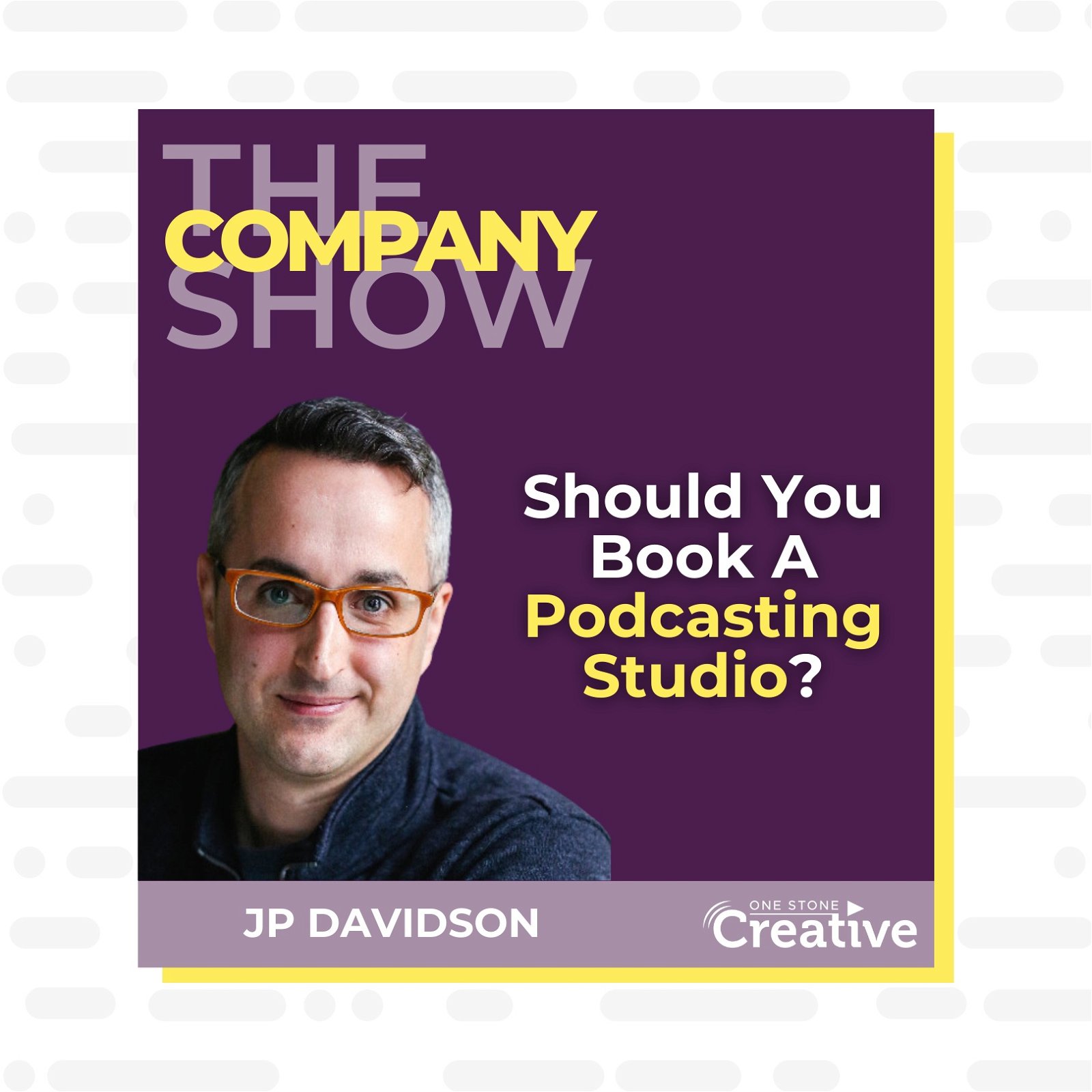
Should You Book A Podcasting Studio? with JP Davidson
There is not much that the best mic in the world can do about recording in a really sound-unfriendly environment. And some of us live in sound-unfriendly environments.If you are currently looking at your location options for podcasting and only finding places that are loud, echoey, or filled with blank empty spaces, but having the best possible audio quality for your show is important to you, then you might want to consider booking time at an in-person studio.I’m personally quite lucky in that my home office is usually pretty quiet and I have enough fluffy stuff kicking around to minimize echo, but there have been days, I’m particularly thinking of last spring when my next-door neighbor was having their windows replaced - when I would have been delighted to be able to go somewhere quiet and just get my content out in peace.My guest today owns and operates just such a venue - and a production company to boot! JP Davidson is the creator of Pop Up Podcasting an Ottawa-based producer and studio.If you want to learn who should book studio time and why - and what kind of value a live-on-a-call producer can provide, listen to our conversation below, or continue reading the blog post!Tune in to the full episode to:Get a better understanding of in-person podcasting studiosLearn about the different recording options for businessesUnderstand the role of the remote podcast producerKnow what to look for in a podcasting studioLearn which processes should be outsourced vs done in-houseDon’t forget to join us for our free monthly strategy calls on the third Thursday of every month!Pop Up Podcasting: A look into podcast recording studiosJP Davidson runs an in-person podcast recording studio where people can come and record their episodes. Here’s JP’s overview of what that entails:The shows that they serveWe're a production company as well as a physical studio space here in Ottawa, Canada. We're right downtown and close to all kinds of businesses, government associations, and parliament buildings, so lots of different clients come through our space.What’s their setup?We have a four-person podcast studio with three cameras. We handle video, and we have some lighting for video as well, so we can do a video or audio. Then we handle a lot of the technical production as far as editing, setting up distribution for our clients, and that sort of thing.Other servicesWe also advise and consult on marketing and other associated things. Although mainly we're kind of a technical production house.Things to consider when thinking about recording options for businessesI work with a lot of companies that podcast. One of the big things at the beginning of the show is how am I going to capture the best audio to kind of give this project the best effort I can.So if someone's making the decision, should I set up my office to record, should I make a room in my house to record or should I book time with the professional studio?According to JP, here are the things you need to consider when making that decision:Can you do it in the long term?I think a lot of the early kind of conversations around show design and how are we going to record this and all that. I like to bring up sustainability because I think a lot of us in podcasting know it's a long game and doing a short burst and then running out of steam, and skipping the next six months of episodes doesn't do anybody any good.It's really about what you can do consistently over the long term. So that really comes into it. If somebody is like, I work from home, it's really hard for me to get downtown to record or over to a studio space, then for sure we work with a lot of clients who record at home, record from the office remotely.That sustainability question is like, can you get to a studio space or is it going to be way better for you to be recording from home or from the office?How much is your budget?The other question is cost. It's a bit more expensive to record from a studio. We do a hybrid approach where our producers will connect with people remotely and be a remote producer during the call.And that helps a lot of our clients because there is this scary factor of technology when we're recording in our own spaces, with our own microphone, on our own computer. And so having a producer on the line can help smooth those things over.The studio is definitely the highest quality, most reliable way to do it. We double-record everything and back up everything. We have a producer on-site to fix anything that might be going wrong, reposition the microphones, and all that stuff.But I totally recognize that a good number of our clients are remote because it can be the best solution for a lot of people.An additional benefit to physical podcast studiosAnother benefit of renting a physical space outside of your own workspace is there is an amount of accountability to that.I find, especially for the solopreneurs or the owner-operators of small businesses, it's really easy to backburner the marketing promotion work that podcasting often is.But if you're paying, you've got a monthly subscription, you've got three hours of podcast studio time, you're going to go there and you're going to use it and you're going to get your studio time filled.JP Davidson’s take on this:Even just on that micro level. For example, I have an appointment at 11:00 a.m. on Thursday. I'm going to go and get my show done. That can be really helpful.And the remote production that we do kind of has that built in too, because my producer is waiting for me at that time. I should say too, that we do a lot of hybrid. So host in the studio, remote guest, or vice versa. Some shows kind of flip between the two, depending on people's availability.My philosophy is that the host should always sound the best. That's what we sort of have come to expect from listening to the radio and watching TV news and everything else. Whether the host is in the studio to sound great or they're at home and we set them up with a nice microphone and the rest of it, we want everyone to sound great.But the host is the one we can reliably control the most because they're the consistent factor every week or every two weeks on the show.Host vs guest audio quality: Who should sound better?I feel it's preferable to have the guest and the host sound a little more equal if there's a huge disparity.The question is, is it always better to make the host sound as good as possible? Or is there ever a case for making the host sound a little bit worse if it kind of decreases the gap between host and guest?JP’s take:With so many things around this stuff, it's opinion and it's art more than science. It hurts my heart a little too much to on purpose reduce audio quality. It's never really occurred to me to do that to make them match up more.I mean, let's shoot high for everyone, but I wouldn't necessarily draw. We're used to that from radio. A host in a studio and a caller on a bad cell phone. We've heard it looking at you, CBC.Maybe NPR in the States pays for tape syncs and brings people into the studio more. But here in Canada, we don't do that. We're hearing phone audio pretty often on the radio.Considerations for audio qualityOne of the things I think about it is because we have sort of the different podcast archetypes that we work with, longtime listeners will be familiar with the Blueprints, so we've got shows that are forethought leadership for establishing the brand of the company.And then we've got shows that are more relationship-focused. And I'm just thinking of this now in that case, if it really is about building relationships with your guests, that's when I think I'd try to equalize the audio..The guest doesn't hear it, but if it is a thought leadership, IP-focused show, just make everyone sound as good as possible, but focus on that host.Because you don't want to dunk on your guests if they're right. If you're trying to make them the star of the show.What does a remote producer do in an in-person podcast studio?Here at One Stone Creative, we don't do live remote production. So our clients, they record their own audio with their own guests and they send it to us.For JP’s podcast studio, it’s a little bit different:It's largely on the technical side, although we'll also chime in often at the end of the conversation, we'll chime in and say the answer to that question was sort of muddled. Let's retake that. You used this acronym throughout and never defined it. Maybe let's define that.It's the stuff that I was producing podcasts as a freelancer for years. People would record on their own and send me audio and the stuff where I was like, I wish I could have been there to ask them to do this or change this.And it's the same thing. On the technical side, we've connected with clients before and they have the ATR2100x here, the classic podcast USB mic.But we've had so many people have this great mic in front of them, and then the laptop mic is selected or the webcam mic is selected and you're like, you had it right there. Why didn't you flip it on? Or the blue yeti that's tipped towards the mouth instead of the face towards the mouth and sounds terrible as a result.So we did a quick sound check at the beginning and just to make sure that everybody's kind of doing everything they can to sound great. And sometimes it's close the window, I can hear the traffic noise or whatever, where we shepherd people through the process. And it really just came out of my frustration with people's self-taped audio, to be honest.Related:Podcasting for Business Conference 2023Deep Dive Workshop: Audio Quick Fixes and Troubleshooting with Audra CasinoWith a little bit of knowledge and caring, people can do this stuff on their own.There's only so many things it can really be. If someone sounds off, it's going to be your input or your output or your environment for the most part, and occasionally something weird and distressing that no one has ever run into before.You're supposed to be the expert on the call and we're tearing our hair out. Like, what is that sound? Why don't you sound better for those listening?If you are kind of in the position where you're trying to make that decision, if the thought of having to deal with an extra tech thing horrifies you look for a production company that offers remote producer services because that does take the problem completely off of your desk.The tools and tech for remote podcast recordingElectro-Voice RE320They're a little bit different internally, but I really like them. And they were a little bit cheaper than SM7Bs when I was setting up the studio. And when you're buying four, the cost matters. But I think they sound just as good as the classic SM7B.My take on the Shure MV7I downgraded from the SM7B because, interestingly, I'm very podcast-affiliated. I'm not a gearhead, I'm not the audio engineer. I've got wonderful team members who do that. It was just too much mic for me. It had too many settings. The M7, I could plug it in and it would just work as a non-techie person. That's what I needed.JP Davidson uses a USB mic at home, too, because of the simplicity of it, if you only need one mic in the room and it's connected to a computer, you're all set with that.RiversideI've had a few headaches with Riverside, to be honest. I think if you use any piece of technology enough, you're going to run into things. But it's the best thing going for us so far.And every so often we'll do things via Zoom. If the guest really is having trouble with Riverside, we need simplicity and speed over quality. But Riverside is a great platform for that.Squadcast: A Riverside CompetitorWe used Descript and so we had access to it. It's really nice. There were a few little gotchas where I was like, I guess they have the waiting room feature.There was something where I was like, oh, it doesn't have this that Riverside has, but I'm definitely considering moving over to that.I got the sense and strategically, I can see why they'd make this choice, but they're trying to, I think, to make it foolproof, because I noticed some of the things that I can normally do in Riverside or even in ZoomOnce you were recording in the Squadcast, you couldn't change your mic, you couldn't start messing with your settings once the recording had been hit. And I was just like, okay, I see why you do that.But Riverside's Enterprise features bug me because I don't want to pay for Enterprise. $300 a month or something is so much.And then there are features like download all is an enterprise feature, or View and Change people's inputs and outputs is an Enterprise feature. So if Squadcast can do some of that stuff, it's looking pretty tempting.Especially for people who are doing their own editing, using Descript as their primary DAW is a no-brainer. You'll put up with anything for that level of convenience. Just kind of a general about podcast studio.What should you look for in an in-person podcasting studio?A dedicated producer for each clientOne of the things that we pride ourselves on is having a dedicated producer for every client. And that's not to say we don't work as a team. If somebody's sick, we can fill in and all the rest of it.But you're going to have one point of contact and that's more important than you might think because there are always little differences with each client. Like we know the host always likes to sit in this chair for this particular show and having that kind of personalization is a nice touch.Do they offer video podcasting?There's a lot of people offering podcast recording in studios now, and there are a lot of differences in the services provided. So I think looking at that video or no video is one thing, but then if you know you want video and more and more of our clients are at least recording like, you do video for clips, even if you're not.The data backs it up. You've got to have at least an MP4 version on YouTube at this point. It's best practice now.Does the studio have enough cameras?So do you have video but then are there multiple cameras? Our studio has three cameras, so we can make a more dynamic show for people. In some cases, you can go to somewhere that specializes in music recording, but they're like, we have a table, we have microphones, we have chairs, whatever it is, we can set you up.Is the environment right for you?Thinking about the environment, especially for business podcasters, the environment you're bringing your clients into and depending on the nature of your business, like a cool music recording space might be perfect, but it might not be the vibe everybody's going for.So somewhere that's going to be a professional space where you can kind of wow your guests and give them the experience of being in this professional podcast space that's dedicated to the task.Especially if you're using a relationship-building strategy, particularly if you don't have premises, if you don't have your own company office, having a really nice professional, well-prepared space to bring your guests who could be potential clients, who could be potential referral partners too.It can just be a small investment into a really good impression.Should you outsource or do it in-house?A lot of the clients we work with have a communications team or a marketing person or somebody who has some specialization in what we're trying to do. And I think the way that that division happens is going to be different for everyone and hopefully you can find a partner that has some flexibility as far as that goes.We do kind of try to customize that based on the client. But the techie nitty gritty stuff that we've talked about so far is probably best left to us unless you have a really capable internal AV person who can help with this stuff.But a lot of people outside of the podcasting industry don't know about Riverside and Squadcast and Descript and these kinds of things. So kind of leaving that to the pros, I think can be helpful and can be a huge time saver because podcast editing and video editing are slow, even for us.But it can be four times slower if you're learning the software as you're going and all the rest of it There's a non-zero chance you're going to hate it because it takes a special brain to be into audio-video editing.I think the podcast-specific stuff can be helpful. So you know that a marketing and communications professional is going to know how to get the word out about things in different ways, but maybe they're not going to know that we have these typical sort of intro outro scripts for podcasts and how those go together, and the fact that you shouldn't go on and on for three minutes in an intro is long.Then we have the distribution setup. I think is still tricky and specialized, and even for me, who's done it a lot.Podcast Distribution: A look into Apple PodcastsWhy does Apple hate podcasters so much? It seems like Apple actively doesn't want more podcasts to be submitted.This is the only thing you could take away from creating an Apple ID, and then you have to log in and put in your credit card, but they're never going to use the credit card, and that kind of activates your Apple ID. It's so frustrating.I got locked out of my own Apple account because my credit card expired, but because I didn't have a credit card, I couldn't log in. So that whole account is just gone forever.I can't think of a reason for it because they're still one of the biggest distribution platforms, but maybe it's just a “you need us more than we need you” kind of thing.They can't be bothered to make it easy.The stuff that should be done in-houseThe stuff that should be in-house is more around guest selection. A lot of major editorial decision-making. We work with our clients on that often, and sometimes it'll be the answer to question four is, like, way off base as far as the company line goes.That's got to go. That's a quick thing for the client to tell a producer or an editor, but stuff that we wouldn't know, right? Because we're not in that industry and we don't know every company policy or how we talk about things or don't talk about things.We found that's a big part of our onboarding process because we do a lot of written materials for the shows that we produce as well as we do show notes. We do often social shares and guest notifications, and if something needs to be cut, I always recommend the writing go first because we work with a lot of highly niched companies and there's only so much our writers can do.They're not compliance lawyers, nor financial services advisors, nor an author whose voice is their money maker. So that's always kind of the balance between we're going to do really good industry-level stuff. It's not going to be as good as if you wrote it yourself. It's not on the table.Probably not a great business decision, but I've dragged my feet on doing client show notes. There's a handful that we do that goes okay once you figure out the style and all the rest of it. But a lot of it, especially if they have anyone internally who can do a better job, will defer to them pretty quickly.Creating show notes for podcastsWhat's interesting, I don't know if you know what's up. We do the State of Business Podcasting Report every year, and one of the things we look at is what these top 100 business shows do for their show notes. A shocking number of them are single sentences.I think the style that we do that's the most popular is a really good descriptive paragraph, a couple of sentences, guest bio if they have one. It's almost always a relationship-building plan. Then just key quotes or highlights, some of the most interesting things, and then resources and it's simple enough that doesn't have to be super, super on-brand voice for a company.And it's easy enough for anyone who needs to do that writing to get it more or less correct. So much of it is about SEO, so you're getting those keywords in. You're halfway there.Relationship Building Through Podcast ProductionOne of our clients, the Business Council of Canada, is this association of Canada's biggest CEOs of Canada's biggest companies.Their podcast is called Speaking of Business and their CEO, Goldie Heider talks to these titans of Canadian business, and it's half about him building the relationship with his membership and half about informing the membership of here's who we are and where we are.But then it's not strictly internal because it's also like, I can be a fly on the wall for this candid conversation between the CEOs of some of the biggest companies in Canada. None of it is really breaking out of the mold, but they do a nice job of as much as everything being said often has to be lawyered at that level.It's candid enough and it's kind of enough of a twist on what you hear these people say on the evening news. It's interesting to the average listener, even if you're not a business magnate.A small downside of working with big businessesWhen we have clients and they’ve got this really great guest from this really huge company. On the outside, I'm going, “Yay, good for you!” On the inside, I'm going, “Oh no, we're going to have a three-month review process, aren't we?”The problem with scripted responsesWe've had guests come in with, like, their communications person, fully scripted their responses to every question. That's just not great audio.If you're not a professional voice actor, it's hard to sound off the cuff if you're reading right. That's one of the ones.Our clients are kind of all over the map. Care Canada, a large nonprofit does work in Africa, is a client, and they have a great show where their program is all about teaching young women sexual and reproductive health in these African countries.They have young women hosting it and kind of running the show. So it's a very youth-led project that's sharing information to the people that need it, but also building that link between Canada and Africa.Interested in Pop Up Podcasting?Visit their website, https://popuppodcasting.ca/They do remote production work with folks across Canada and beyond.You may also contact JP through [email protected] (he would be be happy to chat!)Key Quotes"It's really about what you can do consistently over the long term.” - JP DavidsonResourcesOne Stone Creative | LinkedIn | Twitter | Facebook | InstagramMake sure to check out our free Monthly Strategy Calls!Podcasting for Business Conference 2023Learn about what other business podcasters are doingState of Business Podcasting Report 2022JP Davidson Pop Up Podcasting | Personal Site | LinkedIn | TwitterRelated:Working with VAs for Your Podcast with Kristy YoderGetting the Best Sound From Your Home Studio (or Kitchen Table) with Junaid AhmedAchieving Business Goals with Podcast Managers | Ted CraggAcoustic Treatment for Your Home or Office StudioAbout JP Davidson“JP Davidson is the founding producer of Pop Up Podcasting. He started podcasting as a hobby in 2010, and it quickly became an obsession and a career.Before founding Pop Up Podcasting in 2017, JP studied audio documentary at the Transom Story Workshop; produced stories for CBC Radio; taught podcasting workshops; and worked to launch podcasts for clients like RBC, Greenpeace, and The Globe & Mail.He’s also founded groups to help podcasters connect: The Canadian Sound & Story Workshop, and Ottawa Podcasters.When he’s not thinking about podcasting, JP can be found nerding out on the latest tech trends, and trying desperately to keep up with his increasingly quick toddler.”PFBCon 2023Have you gotten your ticket for the Podcasting for Business Conference yet? There is still plenty of time and there is content ready and waiting for you right now.It's the recording of last year's event and they are fantastic just like this year's presentations are going to be.Learn more and check out the speaker lineup and our vast array of networking opportunities over at www.pfbcon.com
27:1026/10/2023
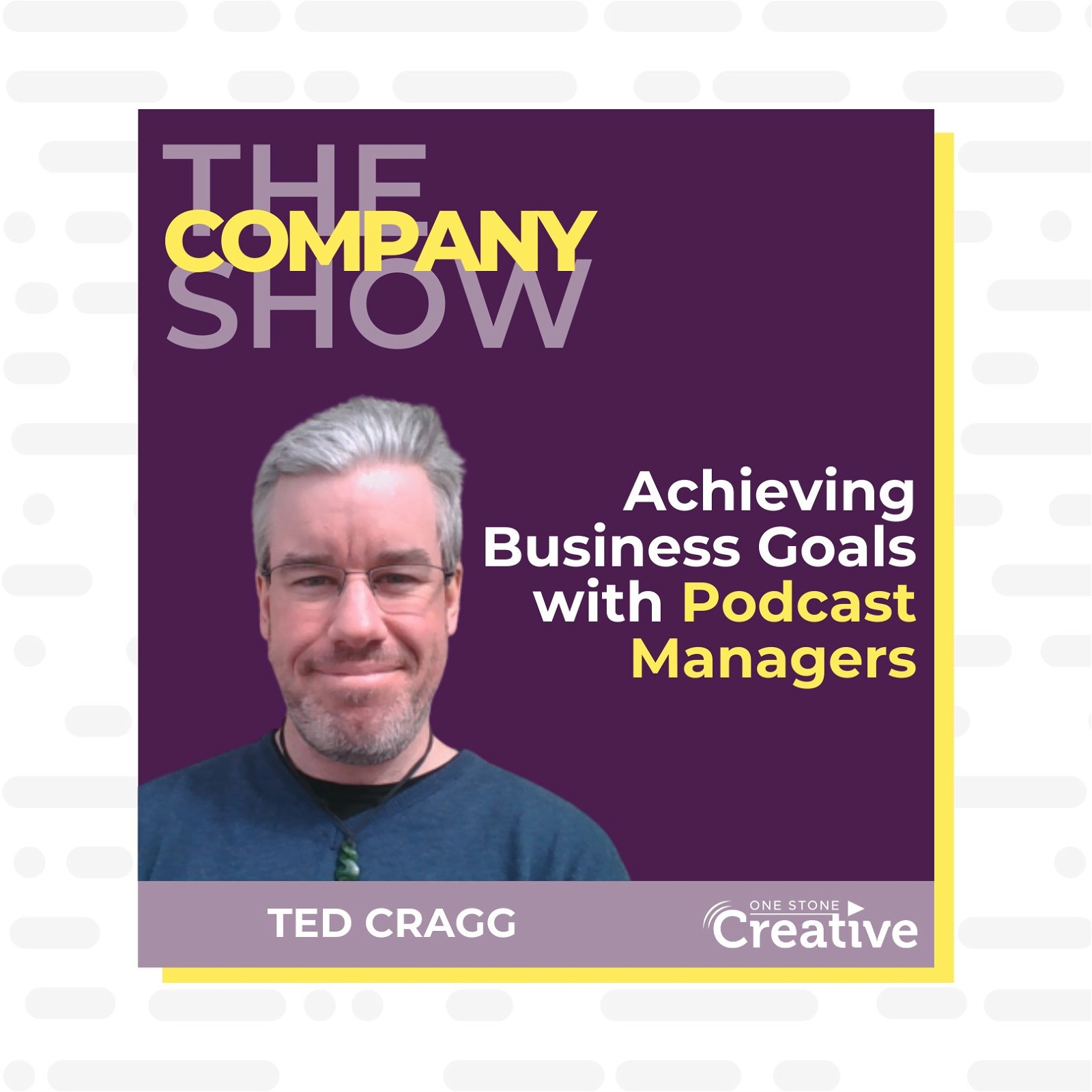
Achieving Business Goals with Podcast Managers | Ted Cragg
One Stone Creative is a full-service agency that handles most of the non-recording work for the shows we produce, but the role of a podcast manager is such a new one, that we wanted to talk to someone who is specializing in it.The podcast manager is a somewhat more nebulous role, in part because it’s so new in the industry, and in part, because the services they offer can vary so much—often they can provide strategic consultation, project management, freelancer management, and sometimes regular production activities like audio editing, asset creation and promotion.My guest today is Ted Cragg, a fellow Canadian who has been a podcast manager for several years, with a special emphasis on the travel podcasting space. He is also the host of the Travel the World Podcast, and an experienced audio editor.If you want to learn more about podcast managers and how they can help you achieve your business goals, listen to our conversation below, or continue reading the blog post!Tune in to the full episode to:Know your options for podcast productionUnderstand what podcast management entailsLearn how to choose a production option for your showPivoting to podcast managementKnow what to look for in a podcast managerHuman intervention in AI podcastingDon’t forget to join us for our free monthly strategy calls on the third Thursday of every month!The different options for podcast productionWhen it comes to creating a podcast for your company, you’ve got a few options:Do it all in-house, either by yourself or with the help of a colleague or twoHire a full-service agency that will take on all or most of the non-recording workHire specific freelancers for specific jobs, like the editing or the promotionHire a podcast manager to drive the project forward on an ongoing basis.Podcasting In-HouseThis is when everything, from show development to production, guest booking to show notes to promotional materials is all done by you or members of your team.The pros include that it can be less expensive, sometimes by a large margin, than outsourcing some or all of the production work, and you’ll be able to control every detail which I know is important for many businesses.For some companies, it’s also best to keep production in-house if the show is deeply integrated with other business areas and with multiple teams - having all of the information and workflows accessible by the many different people who need them can make outsourcing a more daunting than tempting proposition.Cons - it’s going to take a lot of your time, and that may or may not be a resource you have in abundant supply.Now, you can get a lot of time-savings with automation tools, and keeping your process and assets simple, but we’ve found that many companies that start in-house tend to want to hire a little help as soon as it becomes feasible.It also takes a lot of different skills: figuring out the strategic role of the podcast in your business is a different skill than editing the audio, which is a different skill than promoting episodes, which is a different skill than managing guest booking which is a different skill than SEO optimizing the notes, which is a different skill than project management… you get my drift.It’s a lot of different skills, that can lead you to the door of our next production option, a full-service agency.Full-Service Podcast AgenciesThey are pretty much what they say on the tin - they’ll handle all or most of your production process.Now, this can vary a bit from company to company, and if you’re considering working with one, you should make sure to get very clear on exactly what is included, but most will do something like: take in your raw audio, do all the editing - both content and hygiene, write the show notes, create sharing assets, create a video version, schedule the episode for you, and drive the whole process so you don’t have to think about anything other than talking to people.Some companies will do a little less, and others will do more like providing feedback, doing guest management, or even being live on your interviews capturing the recordings.Pros of working with companies like this are that the main management of the show is off your desk - it is a huge time savings. You also don’t have to learn, or hire for specific skills like audio editing and show notes writing, you get to take advantage of a team of different subject matter experts working together.With the best companies, you can also get strategic support around how to leverage your podcast within your business, tracking the impact of the show, and providing feedback so that you’re constantly improving your skills.Cons can include that it’s the most expensive of the options - having a company take on the bulk of the work isn’t cheap, and having the production process out of your hands also means - it’s out of your hands: you’re depending on other people to keep your release schedule, and that can be scary - and in some cases, disappointing.You also may or may not have your own dedicated account manager and other team members working on your show which can mean an inconsistent output.Hiring FreelancersIf going full-service is a bit of a stretch, or you have a really solid team with the interest and the bandwidth to take on the areas of their own expertise, then hiring a freelancer who specializes in one or two elements can be a great option.There are many highly skilled audio editors who just do audio that you can hire to take on that part of the show. The same is true of guest booking, social media management, writing tasks, and graphic design.The pros of hiring specific freelancers are that it tends to be more affordable than full service, and you are just adding the amount of skill to your own team that you really need, while fully maximizing your internal resources.On the other hand, a big part of working with freelancers is managing them and making sure that everything required from each provider at the right time can be quite a challenge.It also means that each individual contributor’s bandwidth and situation has the potential to disrupt your workflow, which can be a little anxiety-provoking.And there is a professional who can help bridge that particular gap—the podcast manager.Understanding the podcast managerWhat is a podcast manager?A podcast manager is certainly a specialist when it comes to podcasting. You can kind of relate it to a virtual assistant or an online business manager, but someone who really is focused on podcasting and everything that goes into it.They understand the industry, probably they're probably very passionate about the industry. They inherently follow people and newsletters and these kinds of things to stay on top of it.And that's the kind of background and skill set that they're bringing to the role, is that they really understand how to make a good podcast and how to make successful ones, and especially how to sustain them too.What can they do for your business?If someone has a business and they're looking to start a podcast, it's a great idea to look for a podcast manager because they're kind of your go-to person who's going to help organize and keep you the host, the business owner, focused on what you need to do, doing it well, comparing it to other things, and putting it into context in relation because they have that expertise, so they may in turn, delegate things.It's certainly possible. There are a lot of podcast managers who delegate editing or maybe graphic design or the audio, videograms, and stuff like that. They may do that themselves as well. But in essence, they really are the project managers who are going to direct the project for the host.So the show is still the host’s. They're the face and they're the voice of the show. It's the podcast manager who's the one behind the scenes with that focus on the project itself.The workflow of a podcast managerA lot of podcast managers usually start at the very beginning of the project before the podcast has even started. So there's kind of two phases.Phase 1There's the launch phase where you're really planning the show in itself. What are the objectives, who's the audience, what offers do you have and how are you going to deliver those?Thinking about content and making an episode plan, thinking at least a few weeks, if not a few months even. Planning the schedule: are you going to do this weekly or biweekly?Arranging the cover art, the music, the hosting, a website—all of these components that go into the launch.Phase 2You get into the regular recurring production of the episodes.So it is certainly possible podcast exists already. They've already done all that work. They've launched the show and now they're ready to hire a podcast manager to kind of take the reins, perhaps level up and improve the quality and just the workflow and the structure of it.When it comes down to basically putting and planning an episode itself, certainly if there's a guest involved, then you have those guests lined up and a lot of podcast managers, that's one of their tasks is to do the guest pitching.They will pitch people to come on the show. They may pitch the host in turn to be a guest on other shows. There are lots of different tasks that they can do. Then, of course, the recording itself is done.But if the podcast manager is in turn the editor, they're taking the files, they're putting everything together, they're giving it back to the host for a final pass, a review, and then it gets published.Usually, the podcast manager is the one who uploads the file, makes sure the RSS feed and all the technical stuff are working well, handles any bugs or glitches, and then they may certainly do the promotion as well, making those clips and other promotional things.So in any one episode, as we all know, there's a lot of work that goes into it.Having the podcast manager at least the one who oversees that project is crucial again, whether they do it all themselves or maybe they delegate other things, but it allows the host business owner to obviously focus on other things and really zero in on what their expertise is.What kinds of businesses would benefit more from a podcast manager?The small to medium-sized businesses, but fairly small.And the reason is really coming back to the very beginning of what makes a podcast manager different. It's the relationship. It has to be a good, strong relationship and you build into that over time.But the communication has to be there common vision where you feel comfortable bouncing ideas. And as a podcast manager, a big part of it, frankly, is keeping the hosts accountable and saying, what's your plan for the next episode? Or plans and stuff coming together. That's a good thing.It's a healthy, positive role because you're the one that's focused on it. The business owners got all kinds of things that they're doing. The podcast is a big part of it, but they have that person who's going to focus on this project itself and just be that second pair of ears is so crucial because there's someone else who really knows the business, who understands the message, what they're trying to do, and understands the podcast itself, who can then give that feedback and say, well, maybe we should cut this part.Or here's a good guest that you can have for sure and kind of just have that overall awareness of how it fits into the grand scheme of things, the message and the branding, and the appearance that you're making through the podcast.With that in mind, you can imagine if it's a really big company, for sure, they can have a podcast, but they would probably have a team. And it's a different scope, let's say, of the project.Podcast managers work well with smaller businesses, often online businesses where they’re really going to have that relationship with the host.How to choose a production option for your podcastHere at One Stone Creative, we're an agency, we're a team of seven now. But the relationship is such an important thing and really getting integrated with someone else's systems—understanding their goals, being able to know enough about the business to be able to weigh in on whether something is appropriate or works.Ted Cragg:A lot of people, a lot of companies, they know they want a podcast for whatever reason. It could be because the other firms in their area are doing it. Could be because they're seeing the value that they love listening to their podcast in their industry.But of the different options that are available for producing. Let's talk a little bit more about how to make that decision. Because you've got like solo provider podcast managers, you've got agencies, you've got bigger companies that are more self serve, let's call them the productized podcasting services.What should people be thinking about or businesses be thinking about when they're making that kind of choice, other than, let's say we've established a good relationship with your point of contact.It's a fairly new role. I mean, I've been doing this for coming up on two years. It's very new. And part of our challenge as podcast managers is simply popularizing. The concept that making sure people know that this thing exists, that it's a specialized type of project manager, basically, who understands the industry because the tech changes so fast.And we're into this as managers. And I chose this because I've been podcasting myself. I enjoy it. I was already getting the newsletters, I was already following people and just learning about it. So it's a passion for me to then share that information and that's the type of thing that you're bringing as a podcast manager.And so if someone's looking for that specialist from the project, then that's what they should be getting, someone who really understands how things work and it makes them a little different.If you were to hire someone from in-house or from a different agency, those are the questions I would ask. I need someone to manage my podcast and help me produce it. So how long have they been doing it themselves? Do they understand how things work, the tech and the skills and the industry and all those things? And you may have someone in-house who just does it anyway because they're interested in their passion and maybe they can become your podcast manager.If you're looking outside of the house, though, or looking around, I mean, yeah, there are some agencies, I guess there are some of these websites where you can find people that know having their title. I'm a podcast manager. Often it's word of mouth and networking and Google search and stuff is certainly possible just to find the people, the managers that are out there and available.I think it often comes down to goals for a business. If someone's main reason for podcasting or their primary benefit from podcasting is really just having conversations with people, then kind of all of those extra details, although it doesn't necessarily matter as much as long as they're having those conversations on a regular consistent basis.And then any service provider who can reliably produce the outcome of your own scheduling work can be a really good fit. But yeah, having that more personal touch, especially if it is going to be like a really strong arm of your marketing as a small business.Pivoting from podcaster to podcast manager - Ted CraggInitially, when it comes down to it, it's really just kind of putting yourself out there and saying, I want to do this, I'm ready to do this.I took a program called the Podcast Manager Program by Lauren Wrighton and she trains people to do this. There's a really good network and community of podcast managers who help each other out.That helped with some of the kind of background and getting ready. At the end of the day, you start with one client and fill in some of that experience.In terms of the business and relationship side, I know a lot of the skills in podcasting because I’ve been doing it myself just for fun for about six years now, since 2017. So when it came to doing it, I was looking for a career change.I wanted to work online, I wanted to have my own business, et cetera. And this was something I knew how to do. I had the skills. I like audio editing and the whole podcast production flow.In the end, I knew that this was something he could do plus he also liked the variety.And that's a good point actually, because I know from my experience, and certainly for a lot of us, every client of course is different. Every relationship and every project is different.So I have clients often where I just do the audio editing and that's cool. It takes me an hour or two, a week let's say, and it's done and they do all the rest.And I certainly have other clients where it's the full scope and it's really digging deep into what their objectives are and what their show is going to be like and all that content planning, lots of communication, fairly regular meetings, and all that kind of stuff. I love doing that too.I wouldn't want to do that all the time either. I like having the variety, a little bit of both. And that's part of what's appealing about doing this.So it's really just kind of if someone's interested in becoming one, then if you already have that interest, for sure, in podcasts, you listen to them, maybe have one yourself, then there are opportunities because people really do need this kind of help.Ted Cragg on transitioning from a podcast manager to a podcast management agencyI might get to that. It's on stage, for sure. I mean, it's a whole other kettle of fish. I know. I'm just curious about your outlook and your way of thinking about it.The thing is, of course, this is not a passive income type job or business. I absolutely don't believe in passive income. I'm so tired of hearing about passive income.Fundamentally the job is very hands-on. It's time intensive and that's the nature of it. That's what I want. I want that relationship, obviously. Therefore, I've realized that I could only really have myself personally, maybe four or five clients at a time, unless there are a couple of others that are really quick things.But there's clearly a limit. If I want to expand my business, if I want to bring other people into that circle, then I would need partners, I would need to outsource and that kind of thing and basically become some kind of agency.And that's certainly possible down the road. One thing for me, as we all know, in online business and stuff, it's good to niche down generally, and you can do that in podcast management. There are podcast managers who really look for coaches, coaching businesses, let's say, and those are the people they work for.For me, my background is in travel and tourism. I love travel and I want to particularly look for people and businesses in the travel and tourism industry who want to start a podcast, of course, to talk about their business.Maybe they're a tour operator, a travel agency, maybe there's some kind of attraction. A podcast is great for telling those stories if they're serious about it if they have the budget, if they want to really see it, and if they have a business plan that this is not just kind of a passion project, but this Podcast is going to promote our offers.It's going to get our name and our recognition out there. They have the budget to hire someone like me and we can work together to really build this into something substantial. So that's where I've niched down.But what's neat about this, again, is that as much as I try to find clients in that area, the skills are the same. So I do have some clients who are coaches and who have other topics and fundamentally it's about editing their audio and just kind of giving them that support and direction.So flipping it around. Let's say someone's listening to this and they're thinking having this level of attention on the podcast is going to be really valuable.But we're not hiring right now, we're not hiring contractors, we're not hiring agencies, but I've got this team member who's got 10 hours free a week. What kind of skills or qualities would someone need to be able to do this in general and also particularly within the house as a kind of upskilling in their own industry?Turning an internal team member into a podcast managerThe biggest time-consuming thing certainly is the editing. AI is helping and I use AI services too, but they don't do the whole job.That might be like a first pass, a bit of an edit, and I still come through with my own eyes and ears to make sure it's good, but that helps speed things up. Regardless, the editing is the number one thing and from there, it's about all the other tasks.If the promotion, the little clips for sure, and writing show notes are a big one, you could have a blog that goes with your episodes too.So if you're doing it in-house, start with what the skills and interests of your existing team are of anyone on that team who's going to be interested in doing this and be able to kind of hit the ground running.There are ways to kind of work around it based on the resources that you have.The person who gets the podcast on their desk should be a strong project manager to start, they should have some tech aptitude or at least a willingness to learn and kind of comfort with getting used to it.Audio editing software typically has a pretty steep learning curve. Once you get it, you got it, but it's not easy to look at for the first time. And there should be at least some level of copy, an understanding of the marketing that's going on, and what's going to be important to communicate to listeners.If you've got someone on your team who has some extra time and those things, you can have an internal podcast manager.Red and green flags during podcast manager interviewsIt's tricky because it's a newer industry.So in terms of experience, you may have someone who really only has a few months of experience in podcast management, but you certainly want to ask about, well, what's their background beyond that?Do they understand the connection really between the marketing and the listener in terms of getting that message through and conversion? I mean, that's an interesting thing with podcasts, because it's not like YouTube or other things where it's easier to measure those metrics.So you want someone who really understands, at least has an idea of how to pursue that and how to improve it. And we're all working together on that, really, to improve the kind of engagement in podcasts.I think passion is really what comes across, especially in this day and age, this stage of this industry, because we may not have the experience because it's so new, but if you have the passion, the interest, you're keen to learn, you're keen to improve your skills, then you're on your way.Human intervention in AI podcast editingAnd we try almost every AI tool as it comes out. We try all of them just to be aware of what's going on. And some of them are really cool. Some of them have amazing functionality.I just tested Cast Magic last week, and it's rad. But the problem I find with all of them and that's the text ones and the audio ones, is that at least at the scale that we're working at, doing 15 OD shows the amount of editing and quality assurance.The time it takes to make sure that a weird little AI error doesn't slip through is basically equal to the time it takes us to just do things by hand. I just haven't found the time savings yet.Even though my favorite AI use right now is Adobe Enhance, being able to improve someone's room sound, has been really cool, but it still needs a full editing process by a human afterward.Ted Cragg on AI apps that legitimately save timeA lot of it comes down to the recording, the quality of the recording, and it's sad to say, but also the voices. I mean, I have a couple of clients. Either they're Francophones or they speak English with an accent, and the transcriptions and so on don't always pick up.I cannot handle a French Canadian accent. No way.So that's one thing. If you do have people, again, if you're the manager or just the audio editor, clients are sending your stuff. If it's clear audio, of course, if it's two people that they're on separate audio tracks, that's a good start to at least give the program the best chance to do its thing.But it's tricky with audio. I find that you always have to do a second pass. You might be able to edit a little bit. One thing I have gotten more into is transcription-based editing.So Descript is a good example of this. Even Riverside has started to do that in a few other places, but the cuts are so choppy.It's getting better, but it is choppy. And I resisted for a long time, but at least with the transcription here's, kind of my mindset is that if someone sends me like this big 75 minutes recording, and I know that we want a 45 minutes episode, so I'm going to have to cut out a lot.I'm talking big paragraphs, five, or eight minutes at a time, which is a lot. Yeah, if I have the transcription, I'll read through it and I know that I can cut this and cut that as a big, big paragraph.And that alone is going to save me, I don't know, at least 45 minutes of my own time, just skimming through to get down to at least something a little more manageable.Now it's like a 55-minute file, which I need to cut another 1015 minutes out. Descript is a good example. They take out these filler words, the uhms and the aahs, and things like that. You can set which ones to remove.They also have a thing where you can add a little gap clip so it's not too tight of a cut that you can't really fix or it's really finicky to fix.I'll often take the first pass from there into another digital audio workstation software and then do the micro clean up if it's a word that's really cut off, that just sounds just too abrupt, and things like that.So it's getting better. I'm kind of holding out. And that should help us with our workflow, for sure. In terms of speeding things up.We use Descript for transcripts and particularly useful for pulling audio and videograms. Really, really amazing for that. But I'll just see how their filler word removal is now.You know what I wish they would do, and maybe just someone from Descript will listen to this. I wish you could set like remove 90% of filler words because when humans talk, they use filler words and it sounds human to have the occasional thing, but it's nice to cut them down a little bit.It would be cool to be able to have like a slider for how aggressively they were removed.Key Quotes“…if you have the passion, the interest, you're keen to learn, you're keen to improve your skills, then you're on your way.” - Ted CraggResourcesOne Stone Creative | LinkedIn | Twitter | Facebook | InstagramMake sure to check out our free Monthly Strategy Calls!Podcasting for Business Conference 2023Learn about what other business podcasters are doingState of Business Podcasting Report 2022Ted Cragg Website | LinkedIn | TwitterRelated:Working with VAs for Your Podcast with Kristy YoderWill AI Replace Writers? with Karl SonaBringing Order to Chaos in Your Podcast Processes with Megan DoughertyOptimizing Your Workflows and Relationships with Jason CerconeHow to Pitch Yourself as a Guest with Angie TruebloodAbout Ted CraggTed has been podcasting since 2017, primarily as producer of the group podcast, The MultiPod, which profiles The Puttyverse online community. It is a multi-faceted show which features numerous simultaneous co-hosts, new guests each episode, rotating features and segments, and occasional live field recording. The podcast has been produced on a regular bi-weekly schedule since January 2018, with frequent additional episodes and bonus spin-offs, and recently passed the 20,000 download mark.PFBCon 2023Have you gotten your ticket for the Podcasting for Business Conference yet? There is still plenty of time and there is content ready and waiting for you right now.It's the recording of last year's event and they are fantastic just like this year's presentations are going to be.Learn more and check out the speaker lineup and our vast array of networking opportunities over at www.pfbcon.com
27:2612/10/2023
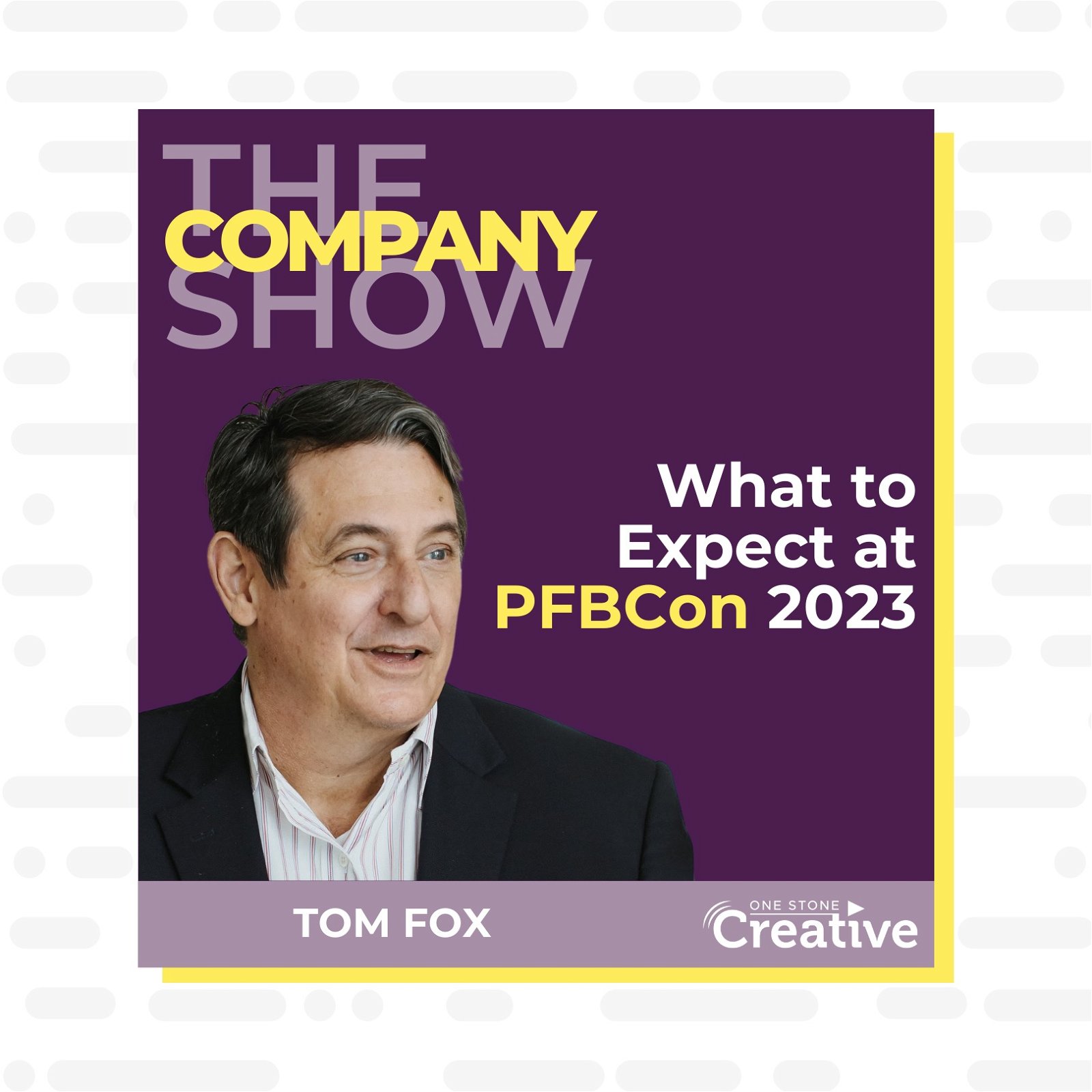
What to Expect at PFBCon 2023 with Tom Fox
One of the things I believe the most strongly about podcasting is that doing it to support and grow an existing business is different than hosting a podcast for the love of the game—or as a business in and of itself.Your podcast needs to work with the other marketing you’re doing, not to mention all of the other commitments you have to your team, clients, and community. It’s because of this that we hosted the first Podcasting for Business Conference last year—and why we’re about to do it again.On this episode of the Company Show, Tom Fox joins me as we talk PFBCon: what’s coming, what we’re excited about, and the different types of presentations and connections we’re making available this year.If you want to get a little sneak peek of this year’s Podcasting for Business Conference, listen to our conversation below, or continue reading the blog post!Tune in to the full episode to learn about:New and exciting topics for this yearWhat makes PFBCon different?A look into some of our notable speakersA new event, networking opportunities, and a valuable freebieEverything else that you need to know about this PFBCon 2023Don’t forget to join us for our free monthly strategy calls on the third Thursday of every month!The conference for when podcasting is part of the jobSomething that comes up a lot for company podcasters is that it can be a challenge to integrate a show into your workflow, and harder to determine if it’s actually doing anything for you or not.That can be frustrating because successful company podcasts are intensely valuable to the businesses that run them.A successful company show might:Be a lead generation machineCreate a flywheel of content that can be used across business areasShorten sales cycles and improve customer lifetime valueEstablish thought leadershipServe and support an existing audienceIf those are benefits you want to see, then you need to make sure your podcast and all of the activities around it, from planning to recording to promotion, are optimized to meet the business objectives that will make the most impact on your company.That’s the sole focus of the Podcasting for Business Conference, and it’s coming up again from November 13 to 15th of this year.New topics for this year’s Podcasting for Business ConferenceJust like last year, we've got a really good array of topics that people are going to be covering and they're all really directed towards people who are podcasting in support of an existing business.If you podcast for the love of the game or you’re podcasting as a business, you're still welcome, but it really is for supporting a business that exists.Here are some really exciting topics that are new this year:1. Interviewing strategy session on how to really effectively translate information from an expert to everyone else.If you find that you as a podcast host are talking to experts and you want to make sure that your audience of laypeople or people who don't know as much about the topic can really understand it, this is going to be a super valuable one.2. Collaborating with a team.A lot of people podcasting for business, of course, they've either got a member of their team managing the podcast or they're working with a third-party service provider.There are a lot of different ways to talk about, edit, figure out where in the process everything is, project, and manage the whole thing. So we've got a session specifically on collaborating with a remote team about podcasting.3. A different way to think about your podcast reach.Typically you think about downloads, you might think about people who listen, you might think about listeners, you might think about engagement. But it turns out that is just a very small part of your overall podcast reach.And if you properly look at it in a much more holistic way, you see that a business or a podcast that is being used by a business can have exponentially more touch points, exponentially more engagement, and exponentially more use. And these are all social media tools that are available to you at little or no cost.Once you begin to understand the power of your reach, you can start to craft and graft a social media marketing strategy beyond simply the subject matter expertise you want to show or whatever it is you're trying to demonstrate with your podcast.I've been working on this topic for a long time and I finally got some solid numbers. I'm thrilled to share this with our audience because I think it's going to open a lot of eyes and more importantly, get people thinking about the podcast strategy as much more holistic than simply showing yourself as a true subject matter expert.4. A preview of The State of Business Podcasting Report 2023We get to hear the always incredible State of Business Podcasting Report, in which you will preview shiny data with the shiny data that you've been working on.5. Deep Dive WorkshopsThere are going to be deep dive workshops about how to measure podcast success on the fly audio editing and troubleshooting, and the very latest, best practice data for company podcasts from the State of Business Podcasting Report.As Tom Fox said, these workshops are like interactive roundtables where we draw on each other's experiences.Visit this link to see our full speaker lineup and the topics that they’re going to get into!What makes PFBCon different?There's lots of great podcasting information out there. There's amazing training, there's amazing events, there's a fantastic community. But a lot of it really is predicated on the fact that you're doing it for the love of podcasting or this is something that you're doing specifically as a business.And for a lot of podcasters, that's just not the reality.You're podcasting, but you also have a whole business to run or you have a whole day job. And a lot of the information that's provided is kind of assuming that the podcast is a standalone rather than an integrated part of a holistic marketing strategy.And so being able to gather a bunch of information coming from that premise, I think is going to be really valuable to people. And of course, it's all online because we have day jobs and can't necessarily travel all the time.Some of the expert speakers in our lineup1. Mary Ann FaremouthMary Ann has literally blown up her little part of the world with her podcast.I'm so gratified that she's willing to come and kind of share some of her experiences and some of the strategies that she's employed. She works in the recruiting space and working with careers, working with big companies, and working with job seekers.Her podcast, she started it and has been able to leverage the relationships that she's making for business development and also the content that she's creating that's all reflecting well in her business into national radio syndication.So she's going to be presenting specifically on how careful and strategic guest selection can make a really big difference in the results that you see from your podcast. And this is completely irrespective of what your download numbers are.That's something that I'm really hoping we get into a lot and that a lot of the speakers are going to touch on is that downloads and we'll be going into this in our workshop.In our workshop, downloads are just the tip of the iceberg when it comes to measuring the impact, value, and reach of a podcast, and very often are the least important part.There are so many other ways to figure out what your reach is and to measure your benefit. And Mary Ann is going to be just a great example of that.2. Danielle Desir CorbetReturning fan favorite Danielle Desir is going to be coming back to do a new event type that we have at the conference this year.She's a podcast marketing consultant. She's a very successful podcaster. But SEO is really one of her superpowers.She's going to be, along with two other experts, in Ask the Expert sessions where it's going to be Q and A the entire time for questions about how to apply it to your business, specific use cases that you want to try out, issues that you've run into.We're going to have a lot of really dedicated question-and-answer time and podcast SEO as if you attended last year and were able to see your presentation can be huge. And we're all making tons of mistakes and leaving tons of low-hanging fruit on the table.Danielle's presentation is going to be absolutely one to catch and some of the other creative ones that we're looking at.3. Jenny BlakeI'm also excited about Jenny Blake, who is doing really interesting things with private podcast feeds to build community as part of her business.She's going to be sharing what she is doing. I'm a member of some of them, full disclosure, and I also help produce, but that's going to be, I think, really valuable for people who do have large audiences and are looking for different ways to engage them.It's going to be a game-changer.4. Jennifer HanWe've got case studies coming from Jennifer Han.She's the marketing officer at Ausha, which is a podcast platform, and she's going to be talking about five real-life examples of how podcasts have really connected brands with their audiences and that's going to have some fantastic takeaways for everybody.Visit this link to see our full speaker lineup!When Will The Podcasting for Business Conference Happen?PFBCon is happening from the 13th to the 15th of November this year.And it's all virtual, it's all online, everything is going to be recorded because you probably have things that are happening during the day. But it's also all happening live, virtually, unlike a lot of conferences where you watch a presentation and then maybe you'll get the chance to talk to the presenter afterward.Every single presentation is going to be followed by a live Q&A. So you can either think about the topic and submit questions in advance if you can't be there, or you can be there live and get an actual response to an issue that you're having in your business.That's in addition to specific networking events and the conference slack that we're going to be putting together. So there's going to be lots of opportunities for connection with the speakers, with other experts, with industry professionals, and with fellow podcasters.Coffee: A start to each day of PFBConEvery day we're going to start, before getting into the sessions, the content portion of the day, just with a little chance to kind of go around the table, introduce yourself, who you're talking about.We're going to have guest experts giving little lessons on their area of expertise and then go into breakout rooms to practice the skills right at that time. So I can spill the beans on one of them.I just confirmed with Angie Trueblood, speaker last year, owner of the Podwize Group, and expert on guest pitching. We'll have a little conversation between her and I and then everyone in the welcome session is going to get a chance to go and practice and go talk about what has just been learned.So hopefully a little skill-building and a chance to get to know some other attendees of the event. It's going to be a lot of fun. So we're going to have something like that every morning of the three days.A Wide Array of Networking OpportunitiesIn the afternoon, we have three different types of bigger networking events.Day 1: Podcast speed networkingYou're going to show up, you'll be put into a room with someone else, you'll get to know each other, and then boom, you're going to go to another one.Hopefully, it'll be a chance to meet a whole variety of other people, industry professionals, or fellow podcasters and make connections that you can use.Day 2: Networking groupIt’s similar to the first one but with a longer time to chat with people rather than rushing from person to person for current and future podcasters.If you are podcasting, if you're podcurious, this is going to be the networking event for you to go to meet other people who are in the same situation, and who are podcasting for their businesses.Day 3: Industry professionals networkingThis is for people who are providing the services, providing the tech, and working on the tools.It’s a chance to get together and talk shop; which we all do when we get together. Hopefully, we'll create some space for that and it'll be a lot of fun.How To Join the Podcasting for Business ConferenceJust go to www.pfbcon.com, where the tickets are available. Here are the two kinds:1. All-Access PassWith this, you can attend everything and get all the perks that PFBCon has to offer.2. Recordings OnlyIf you know that you're not going to be able to attend live, you can just buy the recordings and it's completely fine. You can still submit questions and get real answers!PFBCon Freebie: Learn what other business podcasters are doingAfter we present The State of Business Podcasting Report 2023, the audience will get a copy of the entire report and my team's detailed analysis of it and how to apply the latest data about best practices for podcasting for business, for your own podcast.We've been doing this since 2020. We look at the top 100 business podcasts and we evaluate them between 50 and 70 different criteria to really establish what are the best practices for social media, for episode length, for cover art.We put all that together into a report and talk about how you can use it.The Value of The State of Business Podcasting ReportTom Fox gives a lot of talks to local businessmen and small groups about the power of podcasting for business, and he uses this report as the basis of his talk. It's a fabulous resource.It will give you, the podcaster or the business owner real solid data about what works. Or more importantly, there's a variety of ways. There's not one thing that works in podcasting.There are multiple things, and the SOBP report will detail that from things such as podcast length, cadence, cover, art, day to release, and time of release.It's a fascinating, data-filled report that you can use with actionable insight.It is also the second coolest thing that we do every year.I really like having it because it's important to make decisions that are appropriate for your business and for your podcast.But sometimes you just want to know what's the right thing to do, and it's really nice to be able to go, how long should my episodes be? It's 44 minutes. That's how long they are. And it's nice to have that kind of thing to fall back on.In terms of best practice, at least that I have found, there hasn't been a really good benchmark for what are these business podcasts doing and what is best practice, so you can always do what is best for you, but it's nice to know what the rest of them are doing too.A Quick Guide to PFBCon 20231. How to get tickets?Visit www.pfbcon.com to register.2. Our expert speakersWe have an incredible lineup of 18 speakers who are going to be delivering live presentations with Q and A.Some of those presentations are going to be all 100% Q and A on really mission-critical topics for company podcasting.3. Deep dive workshopsThere are going to be deep dive workshops about how to measure podcast success on the fly audio editing and troubleshooting, and the very latest, best practice data for company podcasts from the State of Business Podcasting Report.4. Networking eventsThere are going to be networking events for finding guests and guesting opportunities, meeting industry professionals who can help you grow your show, and just connecting with other podcasters to share insight and ideas and a little bit of support.5. Can’t attend live?If you know that you're not going to be able to attend live, that's all right. We've got a Recordings Only pass that will entitle you to access to all of the conference recordings and you'll also be able to join that Slack group so that you can still network.You can still submit questions and have them answered by the experts when you view those recordings.So if this sounds good, and I hope it does, then check out the conference website, www.pfbcon.com, and get your ticket.It's all happening November 13 to 15th and I cannot wait to see you there!Key Quotes"Your podcast needs to work with the other marketing you’re doing, not to mention all of the other commitments you have to your team, clients, and community. It’s because of this that we hosted the first Podcasting for Business Conference last year—and why we’re about to do it again." - Megan Dougherty“This is the only conference I know that speaks to the business person or the podcaster who may dabble in podcasting. It may be a hobby or they may move it as I did to a full-time business, but there's something for everyone in here, and it gives all of us the opportunity on both the creative side and the business side.” - Tom FoxResourcesOne Stone Creative | LinkedIn | Twitter | Facebook | InstagramMake sure to check out our free Monthly Strategy Calls!Podcasting for Business Conference 2023Learn about what other business podcasters are doing: State of Business Podcasting Report 2022Tom Fox | LinkedIn | Twitter | Compliance Podcast Network | Texas Hill Country Podcast NetworkPodcast Coaching with Danielle Desir Corbett | Instagram | TwitterAngie Trueblood | Instagram | LinkedIn | Twitter | The Podwize Group | Go Pitch Yourself PodcastMary Anne Faremouth | Website | LinkedIn | InstagramJenny Blake | Website | LinkedIn | InstagramJennifer Han | Ausha | LinkedInRelated:How to Pitch Yourself as a Guest with Angie TruebloodWhy You Should Consider Starting a Podcast Network with Tom FoxPodcast SEO: Best Practices & Tips from Danielle Desir Corbett
18:0828/09/2023
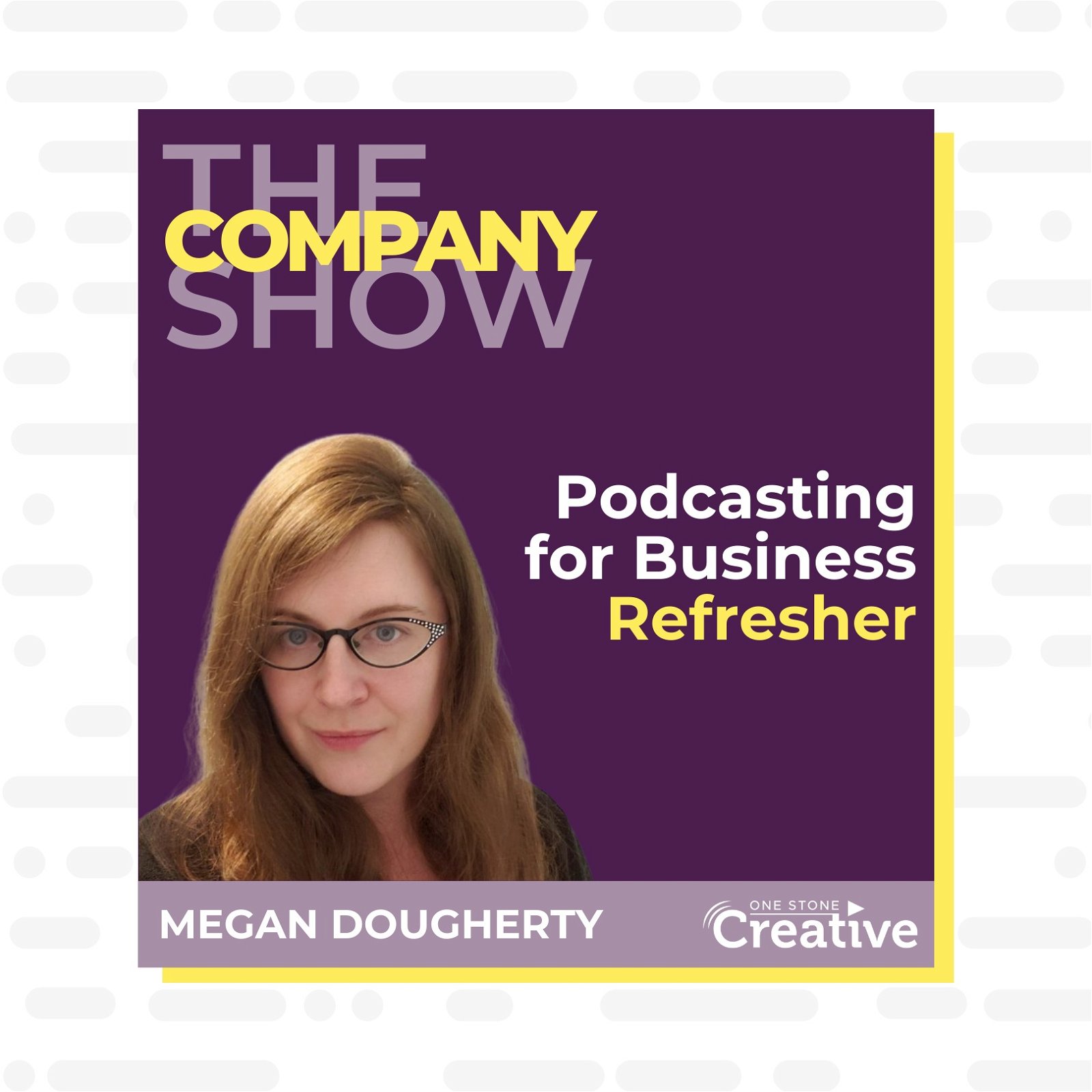
Podcasting for Business Refresher
A couple of weeks ago, we ran an episode called How to Cheat a Podcast Episode in which I shared some of the strategies you can use to fill a gap in a podcast production calendar. One of those suggestions was doing Q&A episodes.As a little favor to my future self, right after I recorded that episode, I went ahead and recorded five answers to five questions that people ask us frequently when they're getting into podcasting.I typically don't love video, but I wanted to capture the recordings of these answers because of how critical short-form video content is becoming and to address the constant content needs of my wonderful social media team member who's always asking for short-form video because it is getting more and more popular and has a lot of benefits to growing a community online.So join me on The Company Show as I answer these commonly asked (but important!) podcasting questions and get a peek at what other players in the industry are doing.Listen below, or continue reading the blog post.Tune in to learn about:How often should you release?How long should your episodes be?How do you find guests?Should your podcast have its own website?Do you need a video version?Don’t forget to join us for our free monthly strategy calls on the third Thursday of every month.The Top 5 Most-Asked Podcasting QuestionsI came up with the five questions that we are asked quite frequently, and some of this was just from what I'm used to answering a lot when I'm on calls with people, but I also used generative AI (ChatGPT) to help me come up with a list.I think it generated about 50 or 60 for me all at once, and I was able to go through them and modify and edit them so that they were questions that I thought would be very useful to have as a library going forward and that I could provide good answers to. Being able to practice giving a really concise but thorough answer was another valuable part of this activity.So all told, getting the questions together, recording the video, and recording the answers, was all quite easy. It was very fast. I'm definitely going to be doing more of those in the future. Presuming, of course, that this episode is received well and is helpful for people. That is something that only you can help me answer.So without any further ado, here are the five answers to five common podcast questions!1. How often should you release a new podcast episode?This is a great question because when you start to think about all of the work that's going to be involved in podcasting, the preparing, the guest invitation, the recording itself, all the post-production, and all of the project management involved.With all of that, you might think, oof, this is something we had better not do more than once, maybe twice a month. And that can be fine. You're the boss of your podcast and how you're using your podcast in your business is going to be up to you and the rest of the team that you're making those decisions with.But from a best practices perspective if one of the things that you want to do with your podcast is grow an audience and connect with more people or if you need other from your podcast like networking with a lot of guests or having a lot of content to be able to distribute to your other platforms, then you're going to want to be releasing on a more consistent basis.When we do our research for The State of Business Podcasting, we find that the vast majority of podcasts are releasing weekly or more. So if you've got the team bandwidth or the budget to do at least a weekly podcast, I'd say that is the best practice to get into a good flow, a good rhythm.But if you can't manage that, if it just doesn't work, you've got too much going on sometimes. That's with our podcast here at One Stone Creative, The Company Show. It's a bi-weekly podcast. This season we're releasing every other week because that's something that we can manage with our available time and resources.So the important questions to answer are:How much content do you need or how many access points to other people do you need to make the podcast valuable for you?Do I have the resources to support that and will it be fun to do it that much?Some people find that it's just too much work or it's too stressful to try and release a podcast every week. So in that case every other week is fine or even more sporadic if that is the only option for you.But all things being equal, more releases are better in terms of having more content, making more relationships, and growing more traction with the podcast-listening audience.2. How long should a podcast episode be?The answer to that is the same as the answer to the question of how long is a piece of rope. It's going to be as long as you need it to be to achieve a particular goal. That isn't to say that there aren't kind of standards or averages within the industry.When we look at the top 100 business podcasts, we find there's a remarkably consistent result over time of 44-minute-long episodes. But of course that includes the three-hour epic-long podcast episodes as well as the five-minute shorts; all kind of going into that average when you look at making a decision about how long your podcast episode should be, you do want to be reasonably consistent over time.So it's probably not best practice to release a bunch of 30 to 40-minute episodes and then all of a sudden release a two-minute one just because you ran out of content that week, although it's still better than not releasing at all. But for the most part, you want to be consistent in what you are releasing because your audience is going to be expecting more or less the same basic structure and length when they go to listen to a new episode.You also want to make sure that you have enough time with your guest or with your solo content to be able to fully communicate one idea. Now I found with producing podcasts, when a solo episode in particular up to about ten minutes, ends up being a really good length of time to really thoroughly explore and talk about one idea, sometimes it doesn't take all that much time, sometimes it takes a little bit longer.And guest conversations I find tend to go for about 25 to 30 minutes, at least for my show, and to be able to communicate everything that we want to communicate about a particular topic to an audience. There are other podcasts that are really comfortable in the 30-minute range, 40, 50 even, going on into an hour or more, especially when you're just getting started out and you don't have a long history or track record that your audience is going to be paying attention to.You can try out different lengths, you can try out different formats. Going with a seasonal approach and doing different things or trying out different formats or lengths of time with each season can be a really good way to do this because then there's going to be at least consistency within the season reason and you'll slick it to trade all of the different options.The other main consideration is going to be how much time you can invest in preparing for and creating and then investing in the post-production of the podcast. Longer episodes are going to be more expensive for all of those reasons. You have to prepare more, the conversation takes longer, and then so will post-production.So take a look at other podcasts in your industry. What are they doing? How long are their episodes and what type of content and format are they?You don't necessarily want to copy what anyone else is doing, but you can take inspiration for what is kind of becoming the podcast industry standard for your particular industry.3. How do I find guests for my podcast?When a podcast is brand new, it's really easy to sort of shake your digital Rolodex and connect with people that you have preexisting relationships with. Past clients, current clients, colleagues, team members, and even friends who owe you favors or just like to spend time talking to you.But after you’re podcasting for more and more time, it can start to feel like you're reaching a little bit more for the kind of guests who are going to be able to bring real value to your show, to your business, and to your audience. So where do you find more people if you feel like you're sort of running dry with your own personal network and connections?My favorite strategy for finding more guests is to look at other podcasts in my industry that are those sorts of complementary shows that are talking to the same types of people about the same types of things as I am and who's on their podcast.This is a great strategy for a couple of reasons because one, there's a whole world of podcasts who are talking to people out there—a really rich resource in terms of coming up with new guest possibilities.But you also know something about these guests. They know how to be on podcasts, they're interested in being on podcasts and they have at least some experience with the format and being a good guest. So it's a really good way to kind of build out your list of people to reach out to.Of course, the benefits of reaching out to more people who are interested in talking to your audience are many, manyfold. They are guests for your own content, they're potential networks, joint ventures, or referral partners for you.They could even potentially be clients or you could become a client of theirs. So my best strategy for finding more guests for your podcast is to look at who are the guests of other podcasts that are working in your industry that you like and that you respect.There is no harm in inviting the hosts of those other podcasts as well. You know that they know their stuff and that they're talking about something that's going to be of interest to your business and to your community.Related video on podcast guests: https://www.youtube.com/embed/x3X1PcK-LBg4. Does my podcast need its own website?For the vast majority of people podcasting for a business that already exists? No.Your own company website is going to be the best place to hold your podcast. All the individual episodes and the show notes about it. People often start podcast websites if they don't have a podcast, like if they don't have a business and a website associated with it already, or if they're starting a new podcast as a new business.This isn't true in absolutely every case and there may be a reason that you want to have a podcast kind of separate from your main content or your main information about your business. But by and large, you're going to want to keep as many of your fans and your audience and the new people who find and discover your work through your podcast in your own environment as much as possible.So instead of having to do the SEO and do all of the development and the work and the proofreading and everything for multiple websites, you only have to do it for the one where the majority of your business information lives and exists.There are situations where you can work with a hosting account that's going to provide a podcast-specific website that really is geared towards getting people to listen, to consume more of the content.But very often as a business owner or a member of a larger company, you've got goals for your podcast that aren't necessarily just get more people to listen to the podcast. There are other business goals that are going to be more easily served by having all of the information about your podcast on your own website.5. Does your podcast need to be in video?The answer to that is no, but also kind of yes.Podcasts, of course, are primarily an audio platform. It's an audio-based media. That's how they were designed and developed. That's how a lot of people still consume them. And I said a lot on purpose because it's not really most anymore.YouTube has become an absolutely massive player in the podcast space, even though they're still just kind of dancing around the edges of RSS capability for a lot of its users. The way people use YouTube is very much like any other music player or any other audio playing device and they can also have the video there as well.So it gets everything in one spot and it is becoming more and more popular for people to listen to all of their audio content through YouTube. As a podcaster, and as a creator of audio content, that's something that you should at least consider when you're deciding whether or not to film or record the video of your audio podcast as well.You may not want to have your whole episode available as a video on YouTube. I know, I tried that for one season. It ended up not being a great fit for us. But I am recording video to be able to use in social media and on other places from our podcast episodes that we've got kind of more rich multimedia content to be able to promote with.The main podcast episodes are also going on YouTube, but in an audiogram format which while not as popular and really not as enjoyed as full live-action video format, is very much better than nothing. So that would be my recommendation.If the thought of having to do video along with your audio work for your podcast kind of gives you the screaming meemies as it does me, then I would recommend recording your episode and audio as normal.Capture the video so you can pull out a few great points for social media and for promotion for you and for your guest, and then make the rest of your whole episode into an MP4-style audiogram that you can put on YouTube so at least you can be found and listened to by the people—the many, many people who are using that as their primary audio platform.Final WordsAnd there you have it; five questions and five in-depth answers.On a related note, if you’re interested in learning about the top three mistakes that businesses make with their podcasts (and how to fix them!), visit this link.Key Quotes“You're the boss of your podcast and how you're using your podcast in your business is going to be up to you and the rest of the team that you're making those decisions with.” - Megan DoughertyResourcesOne Stone Creative | LinkedIn | Twitter | Facebook | InstagramMake sure to check out our free Monthly Strategy Calls!About Megan DoughertyMegan Dougherty is the Co-Founder of One Stone Creative. She has been a digital marketer for over a decade, with a strong focus on digital course creation, content marketing, and multimedia content production. As the co-founder, she takes pride in high-quality, on-time work and helping people get their messages to the people who need to hear them.She likes spreadsheets, deadlines, and creating online experiences that are good for both the creators and the end-users. She hates jumping out of airplanes, mushrooms, and hyperbolic language in messaging. When not helping to produce podcasts, courses, and videos, she bakes pies and watches Star Trek. (Janeway forever.)Find her on LinkedIn!Related Episodes and Media:How to Cheat a Podcast EpisodeTop 3 Mistakes Businesses Make with Their Podcasts And How to Fix Them!PFBCon 2023Early bird tickets are still available! Get access to the three-day Podcasting for Business Conference this November for only $147 (regular price: $197).Visit this link to register: https://pfbcon.com/register/The promo ends on September 15th.
11:3014/09/2023





